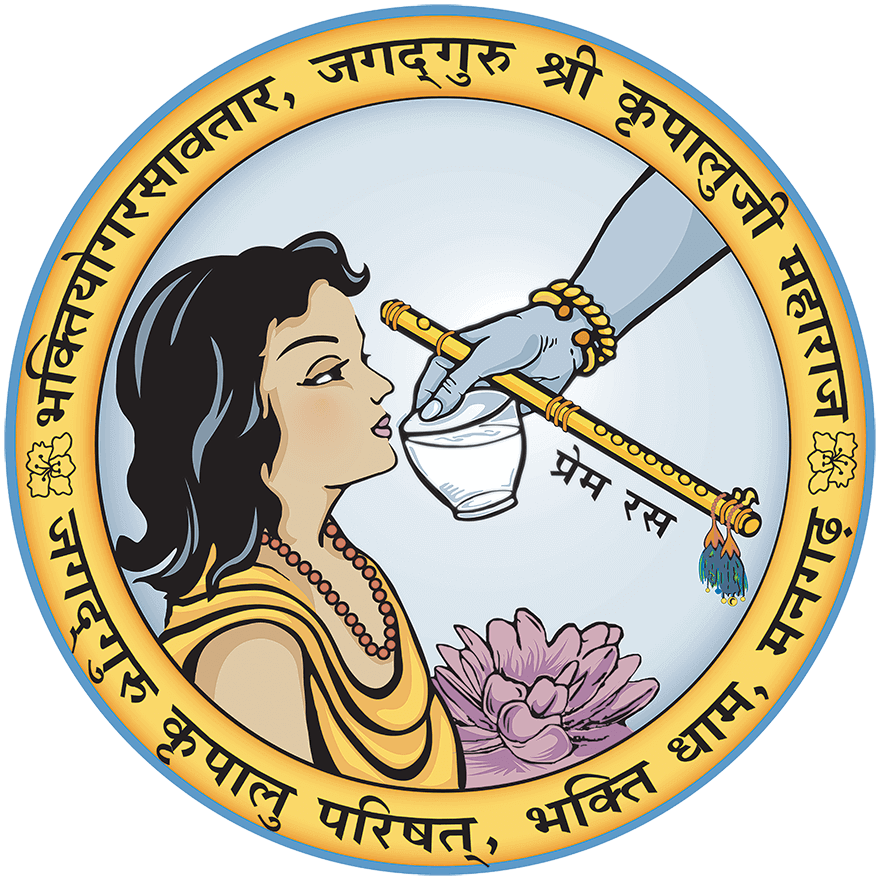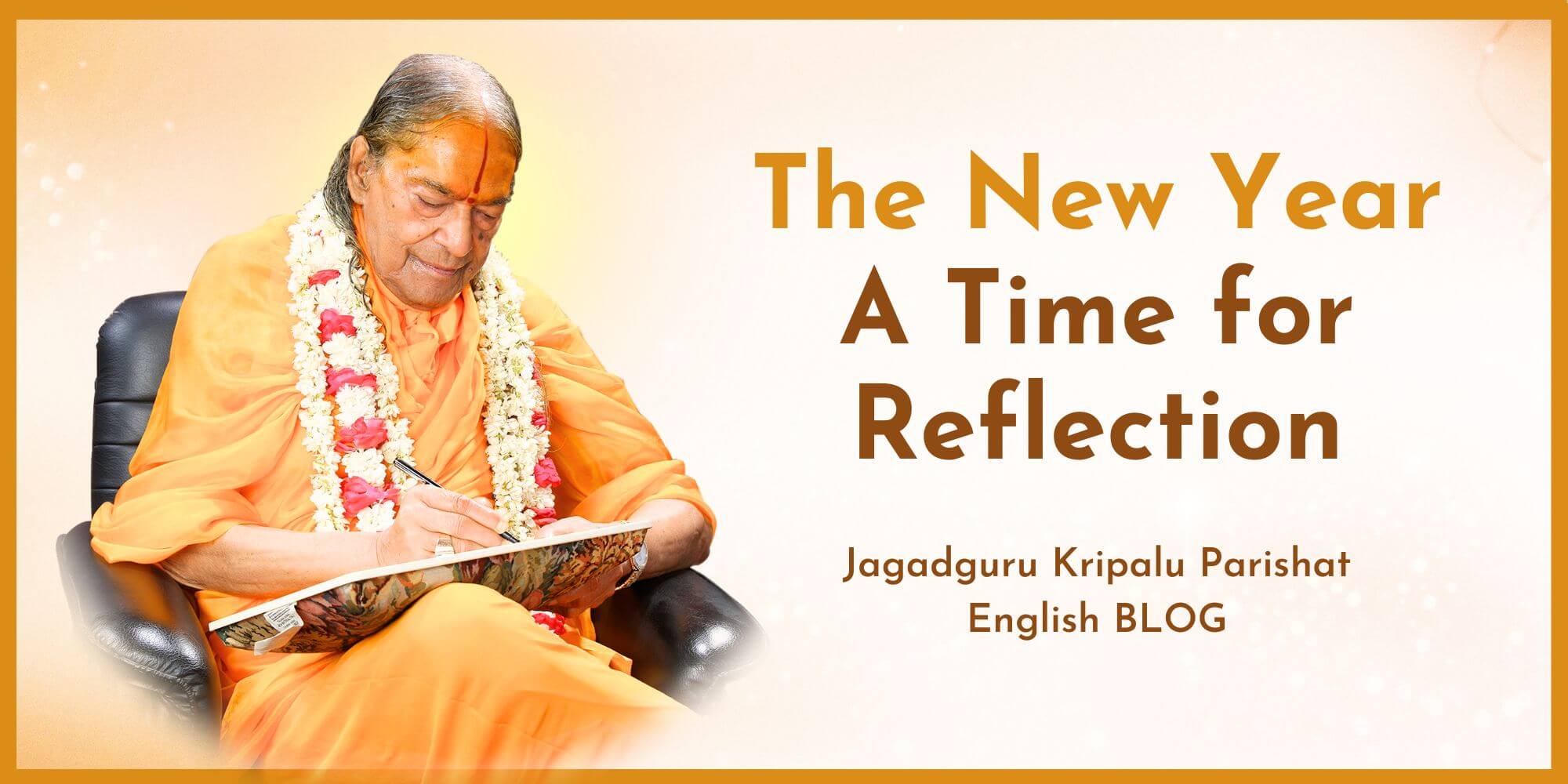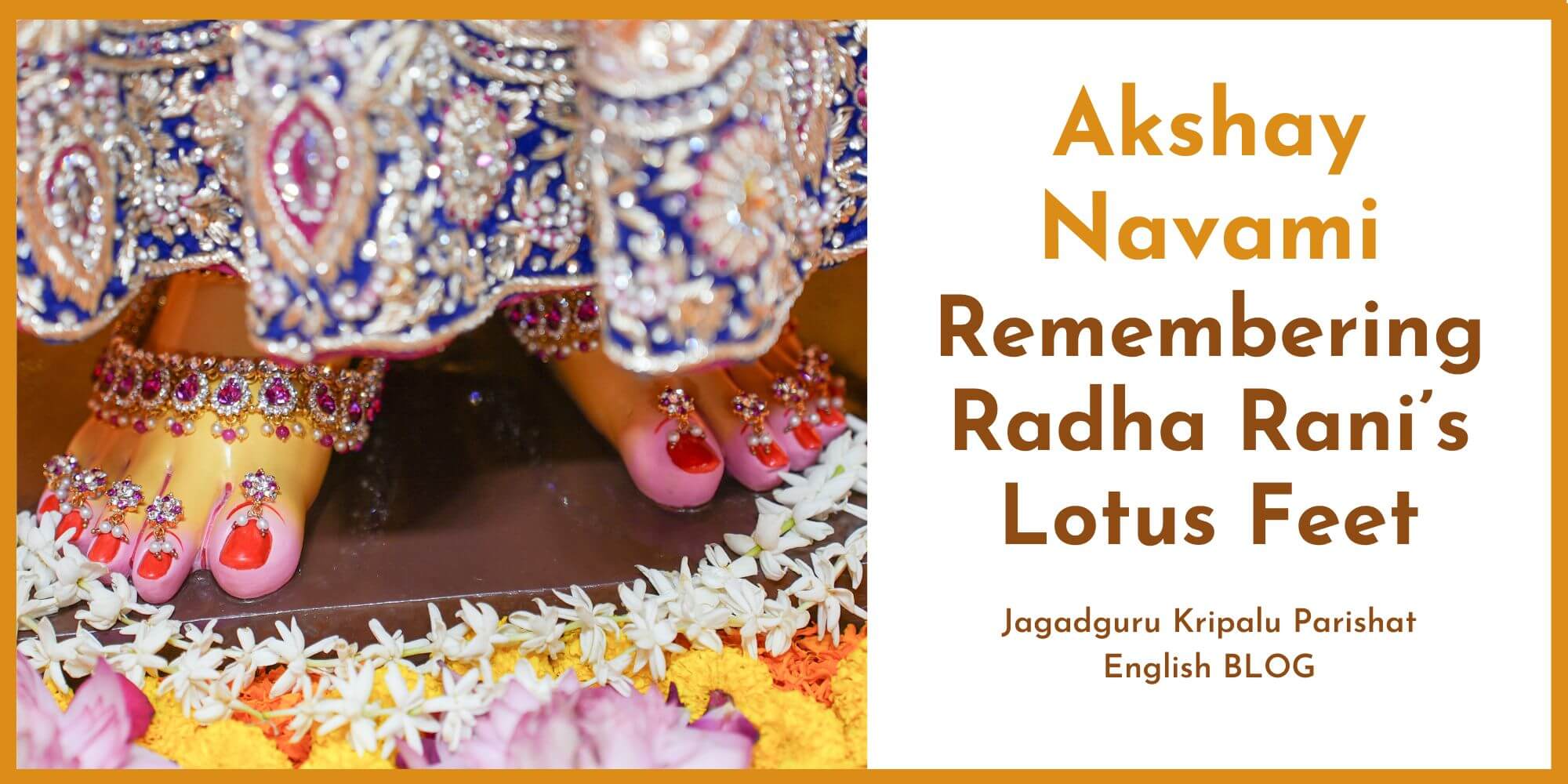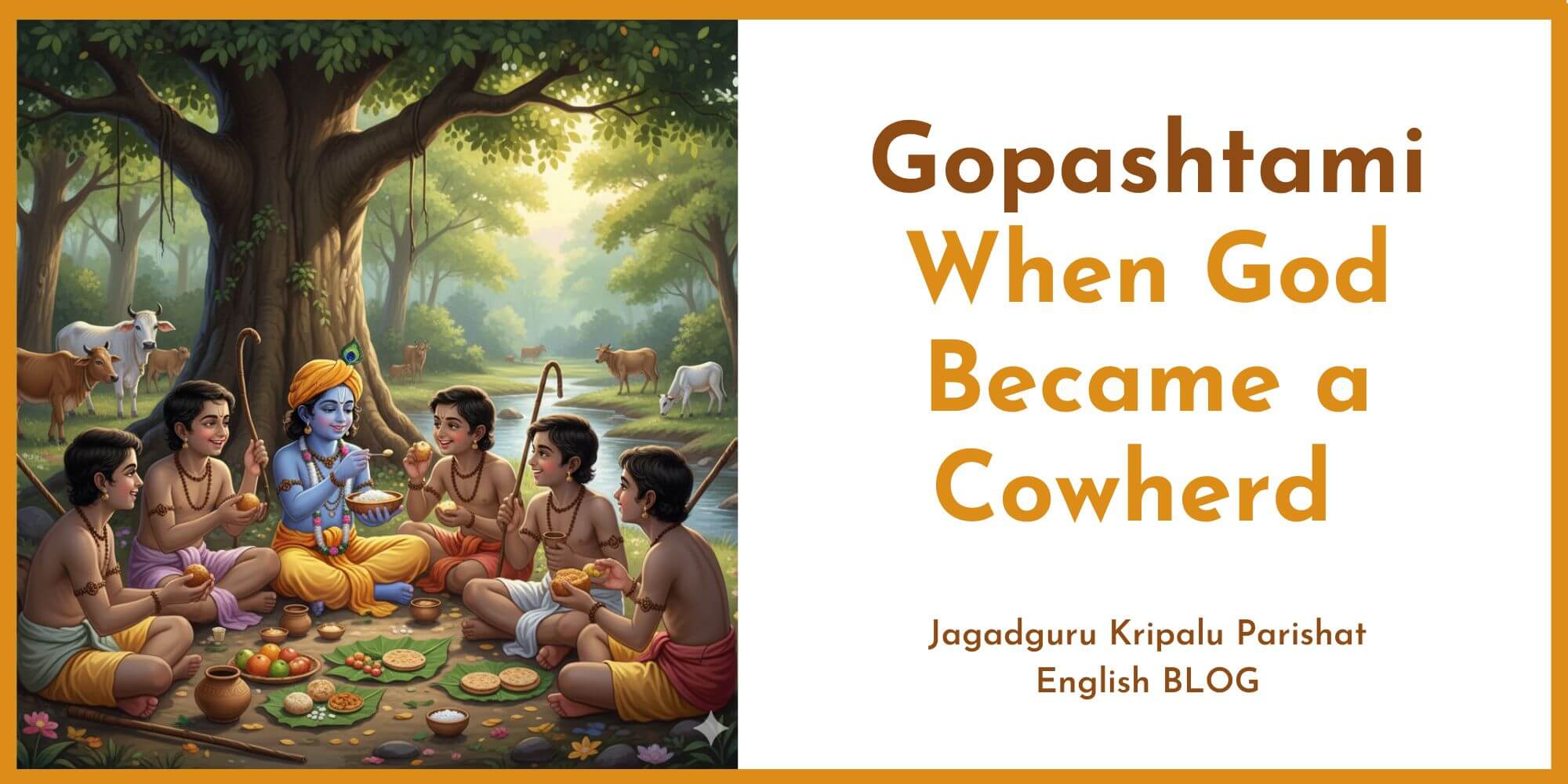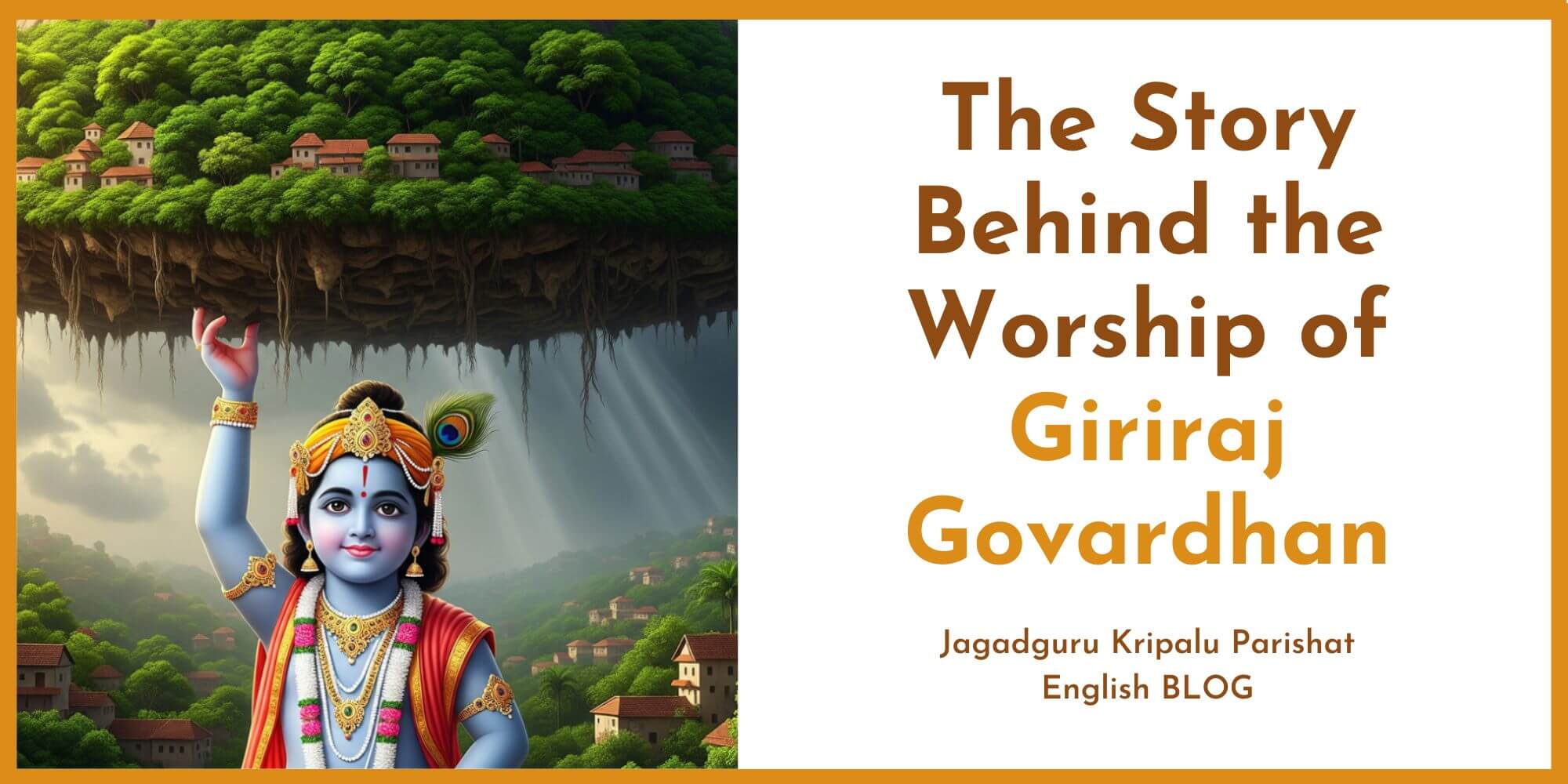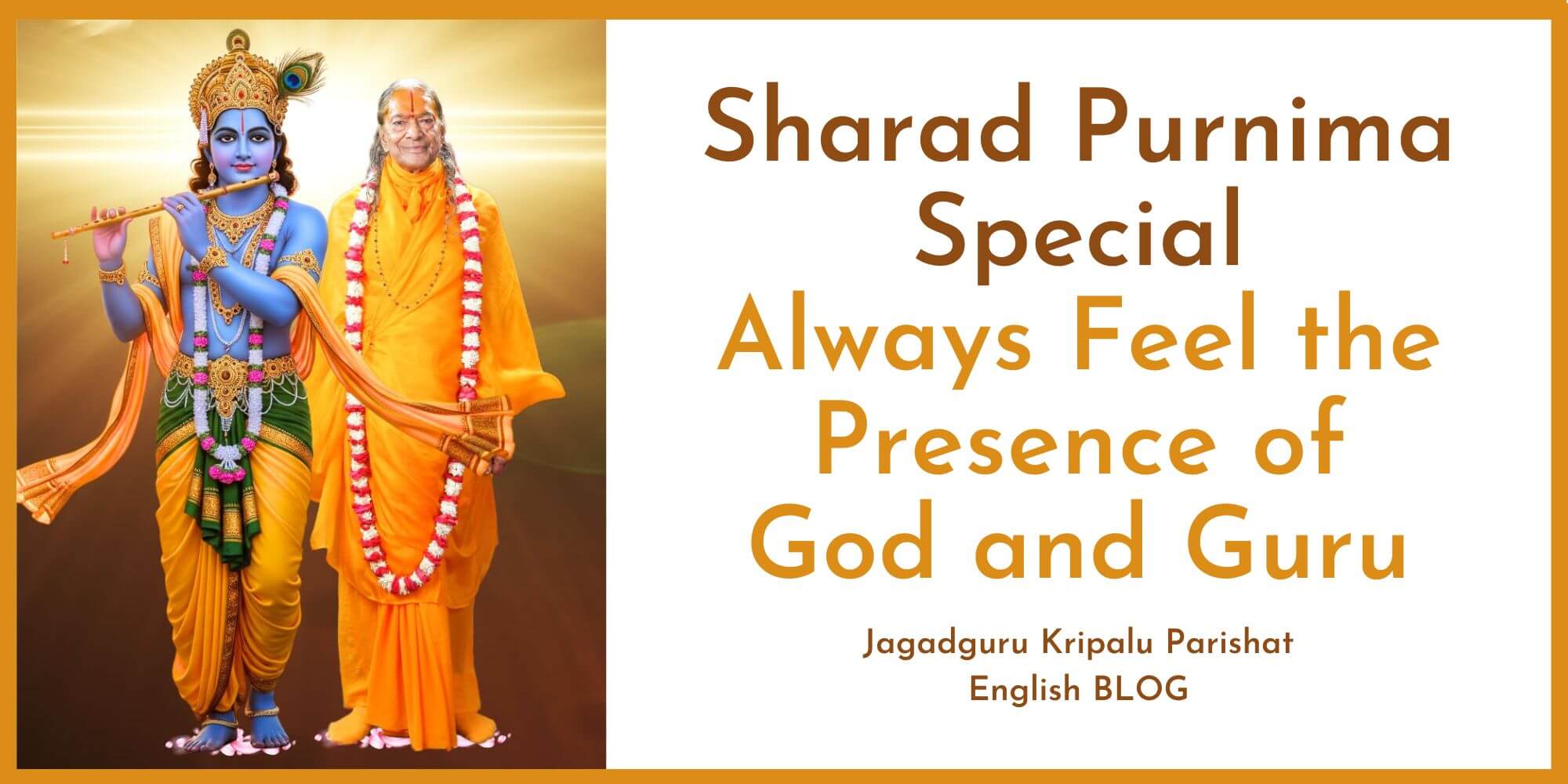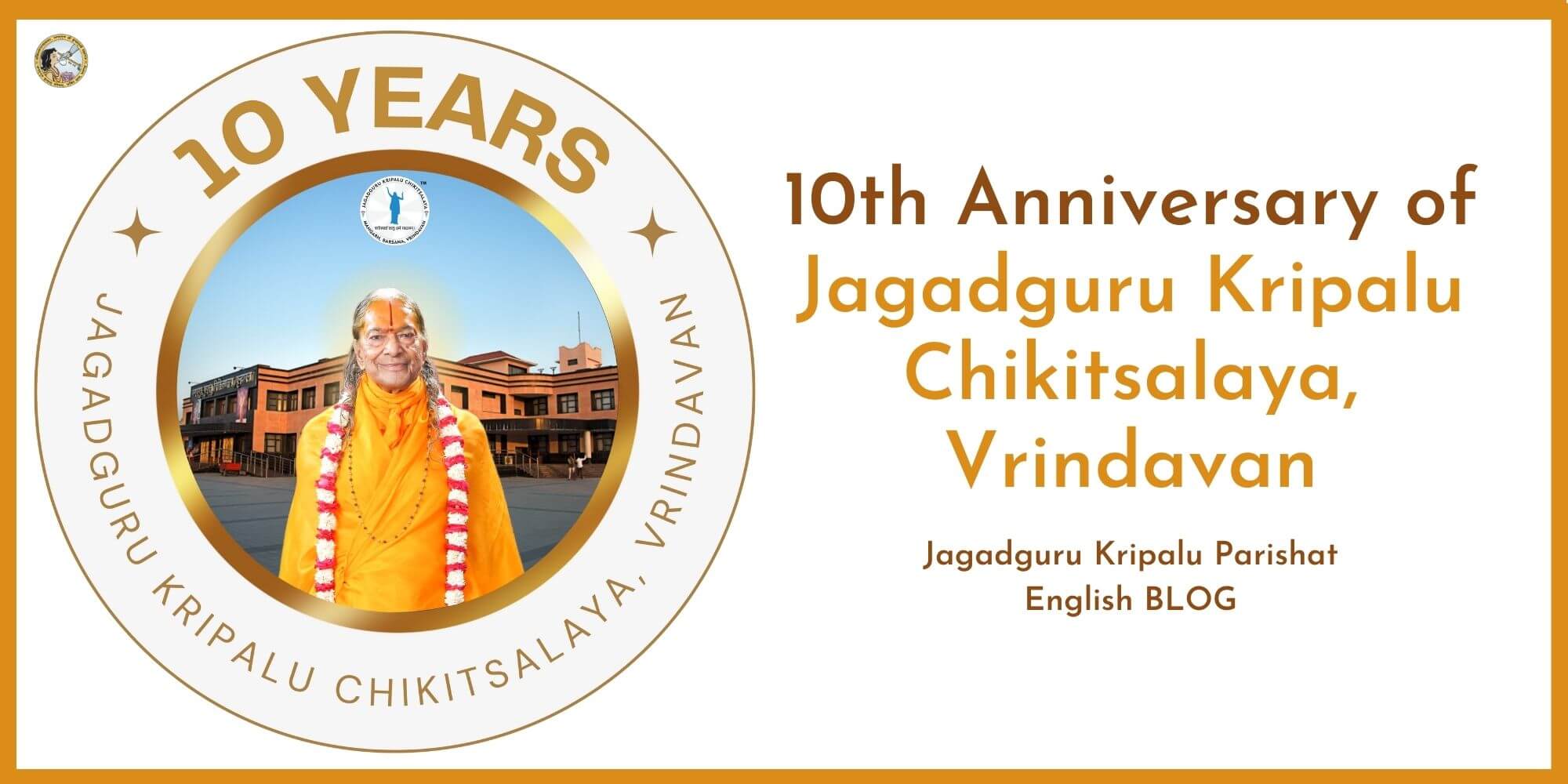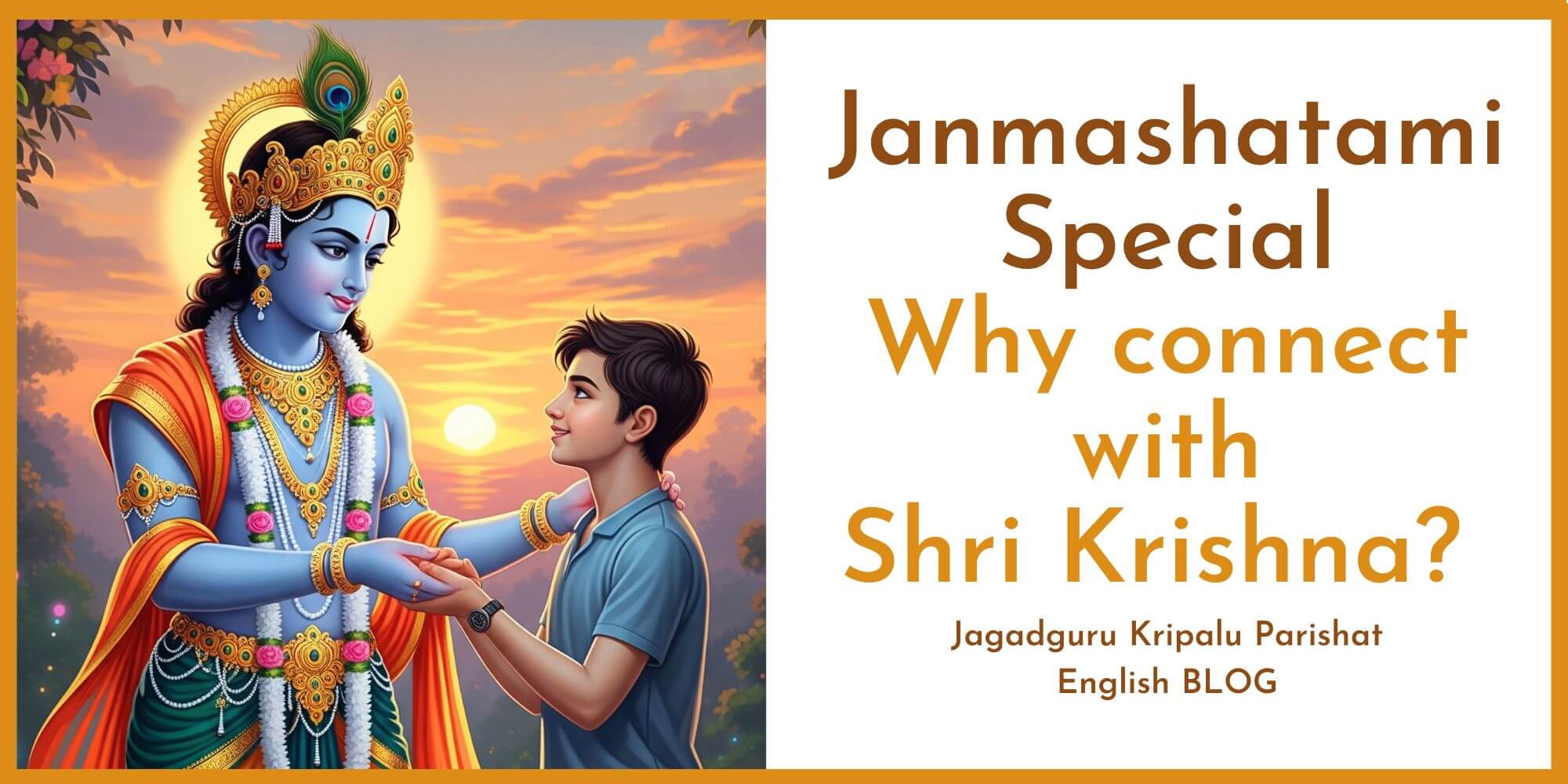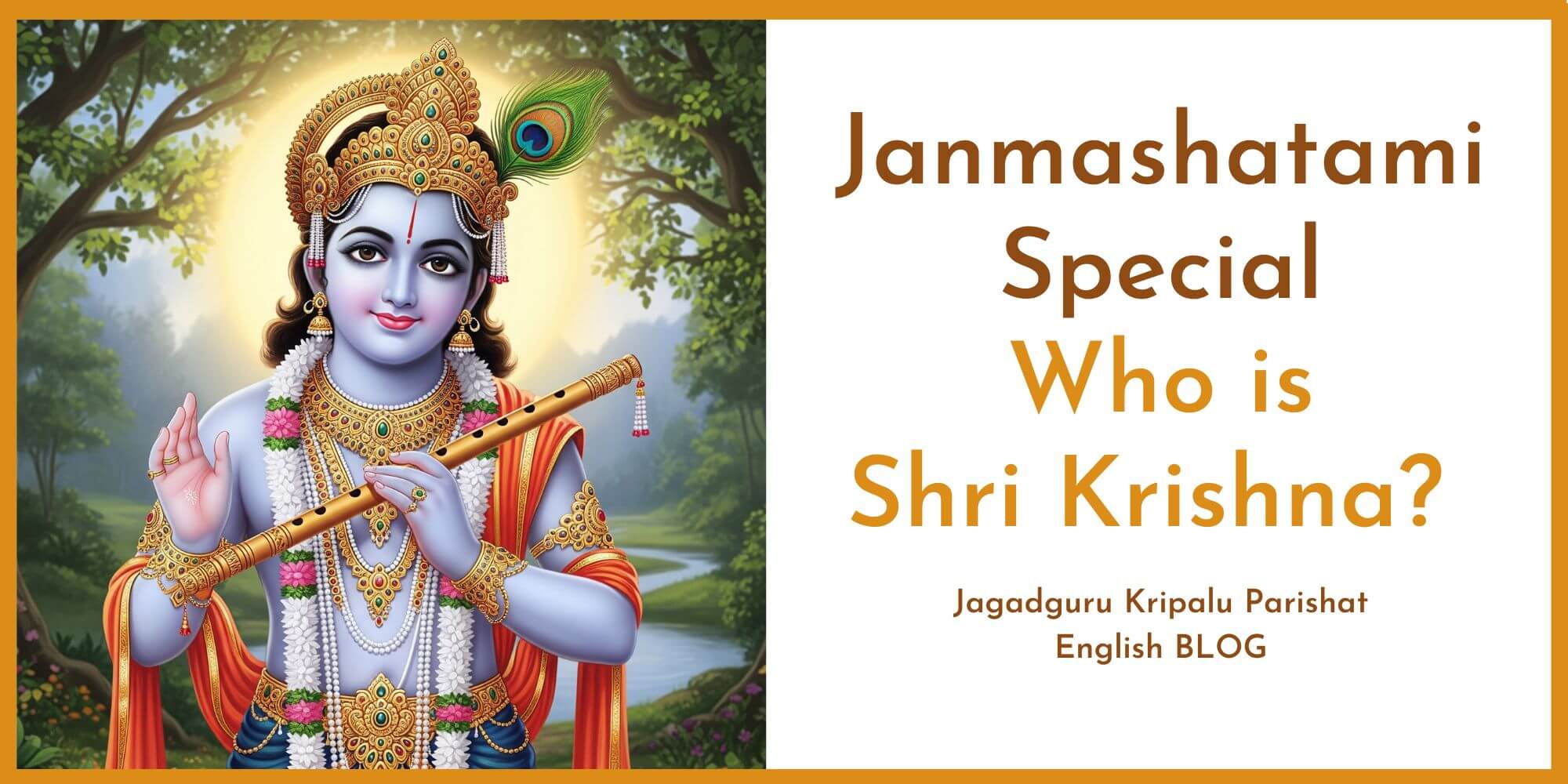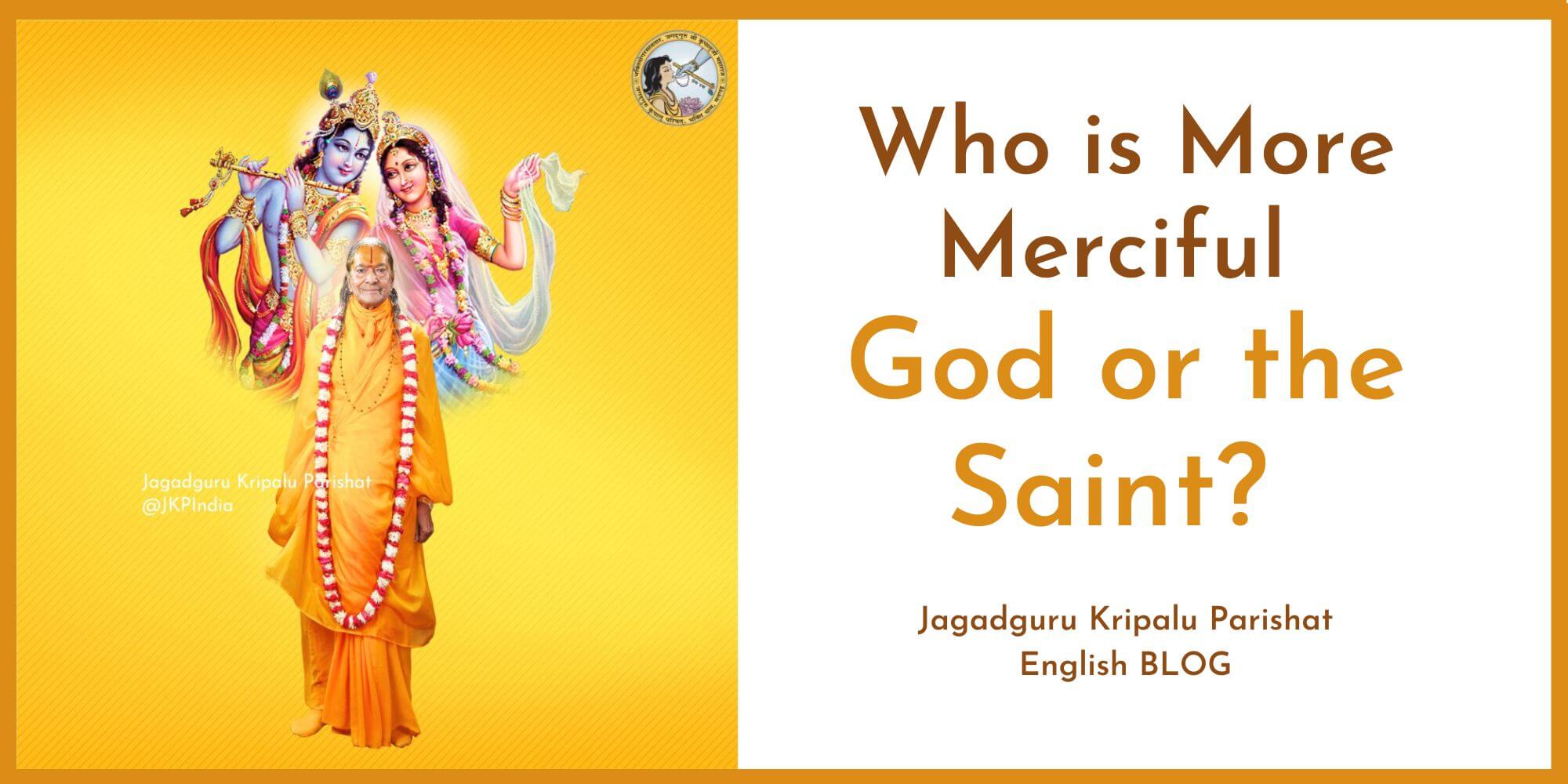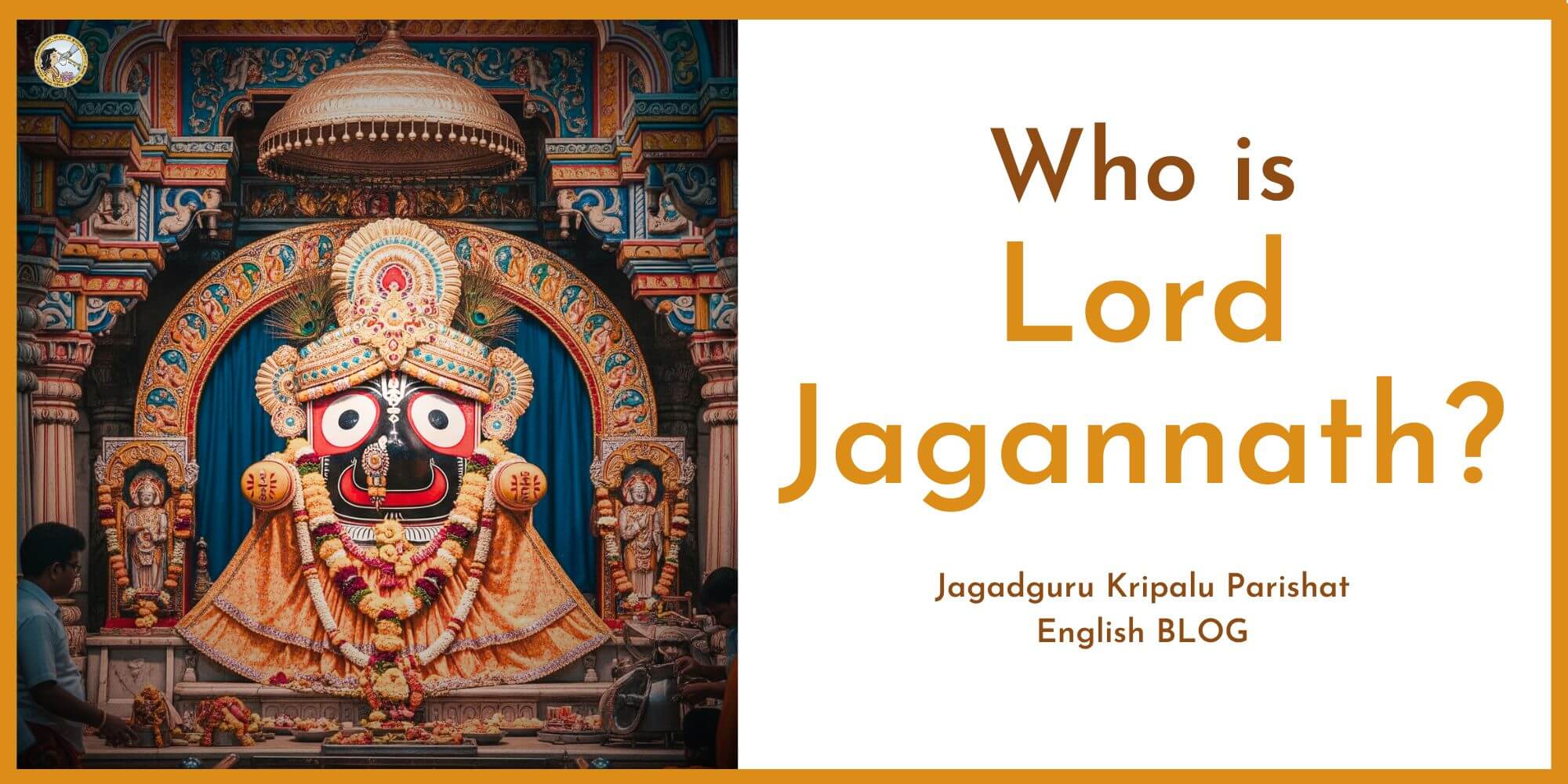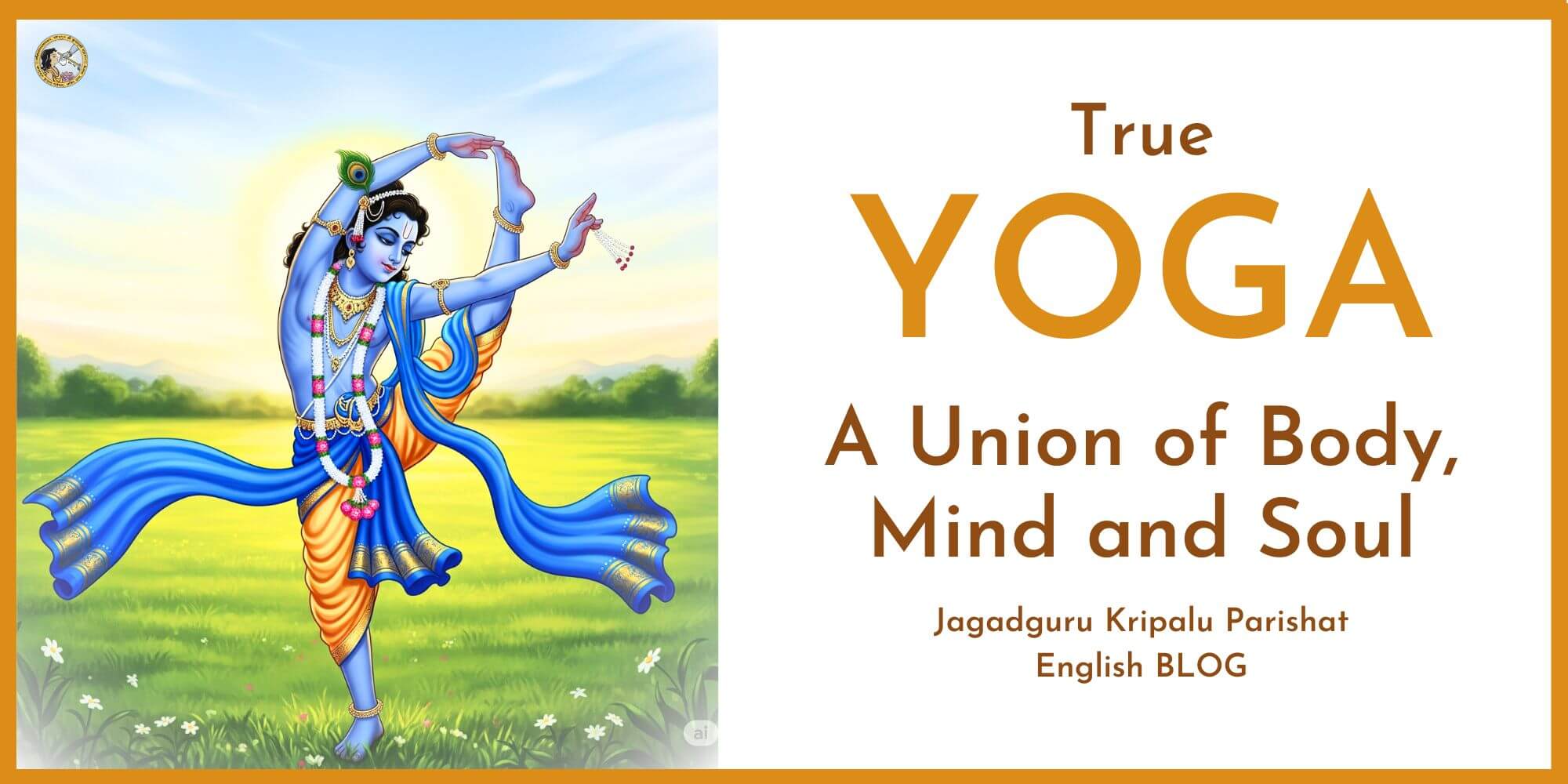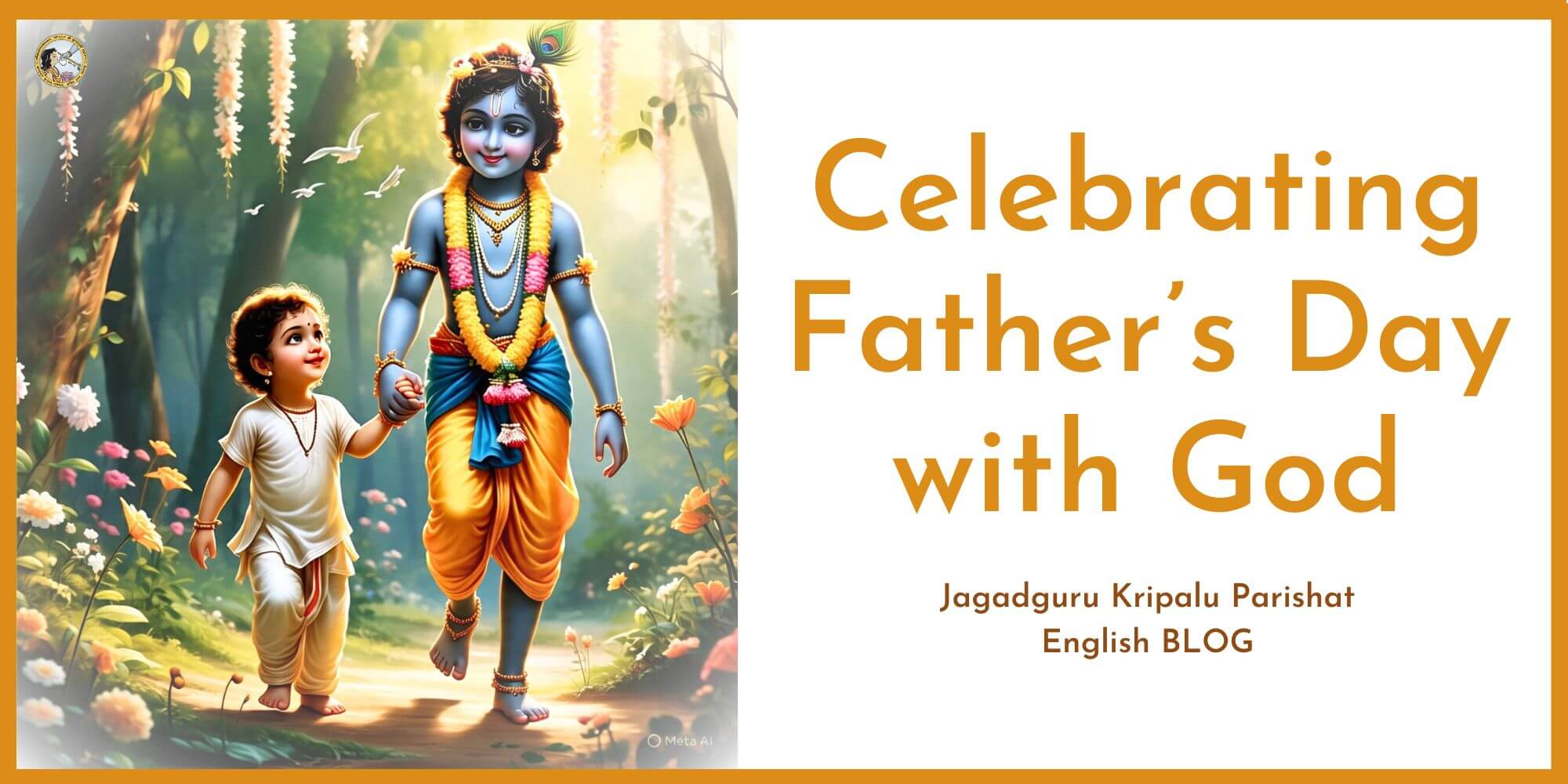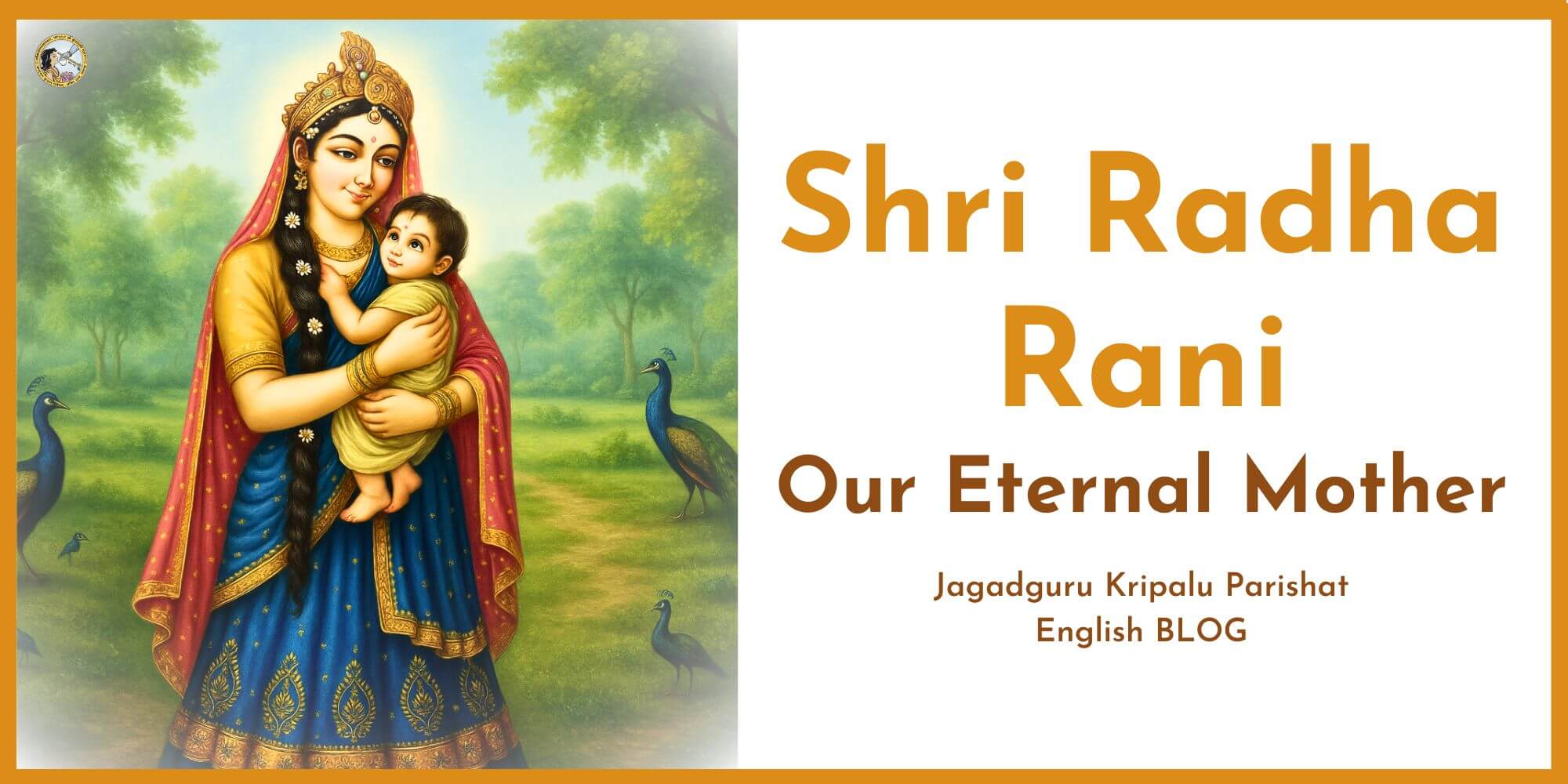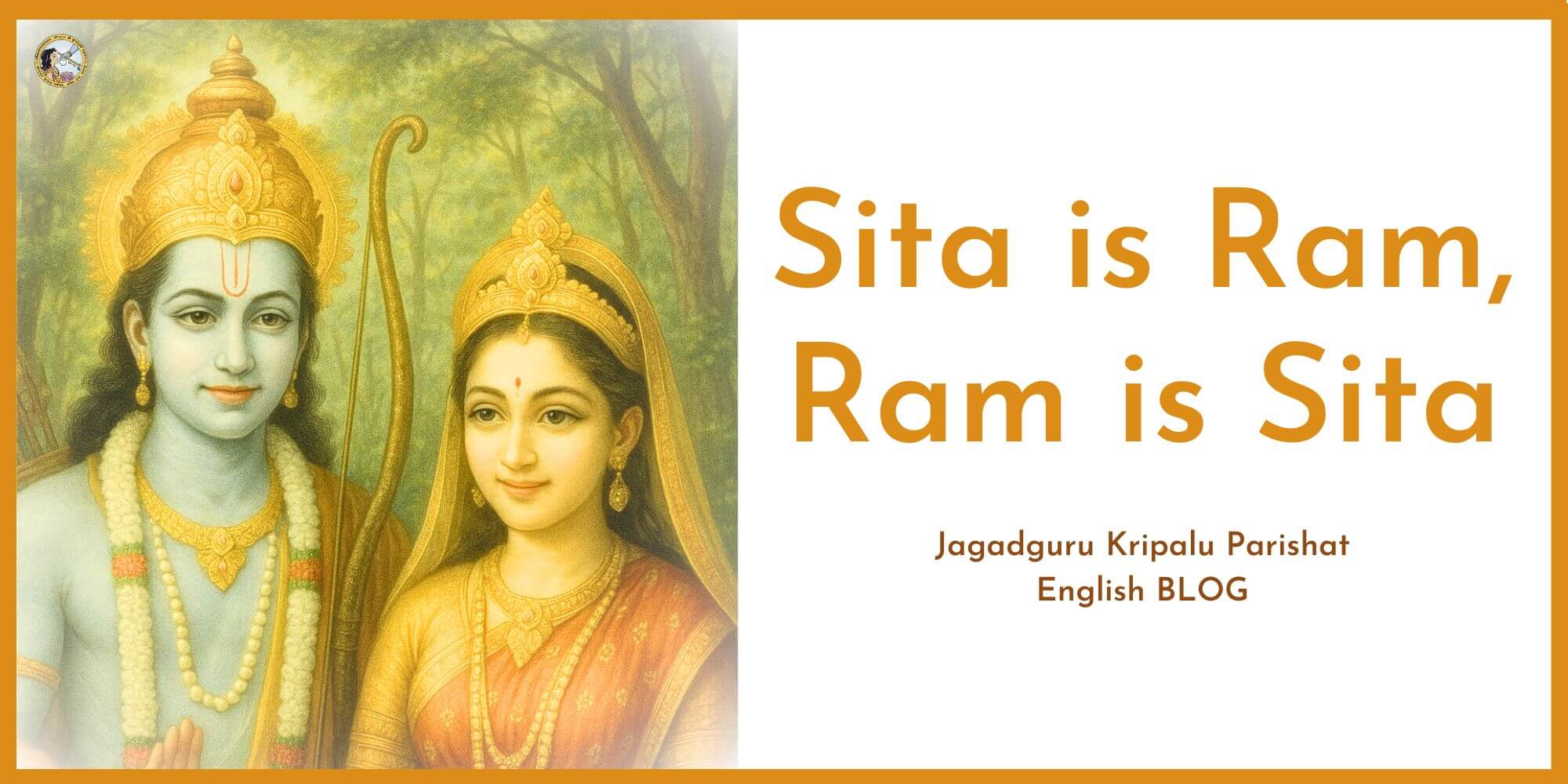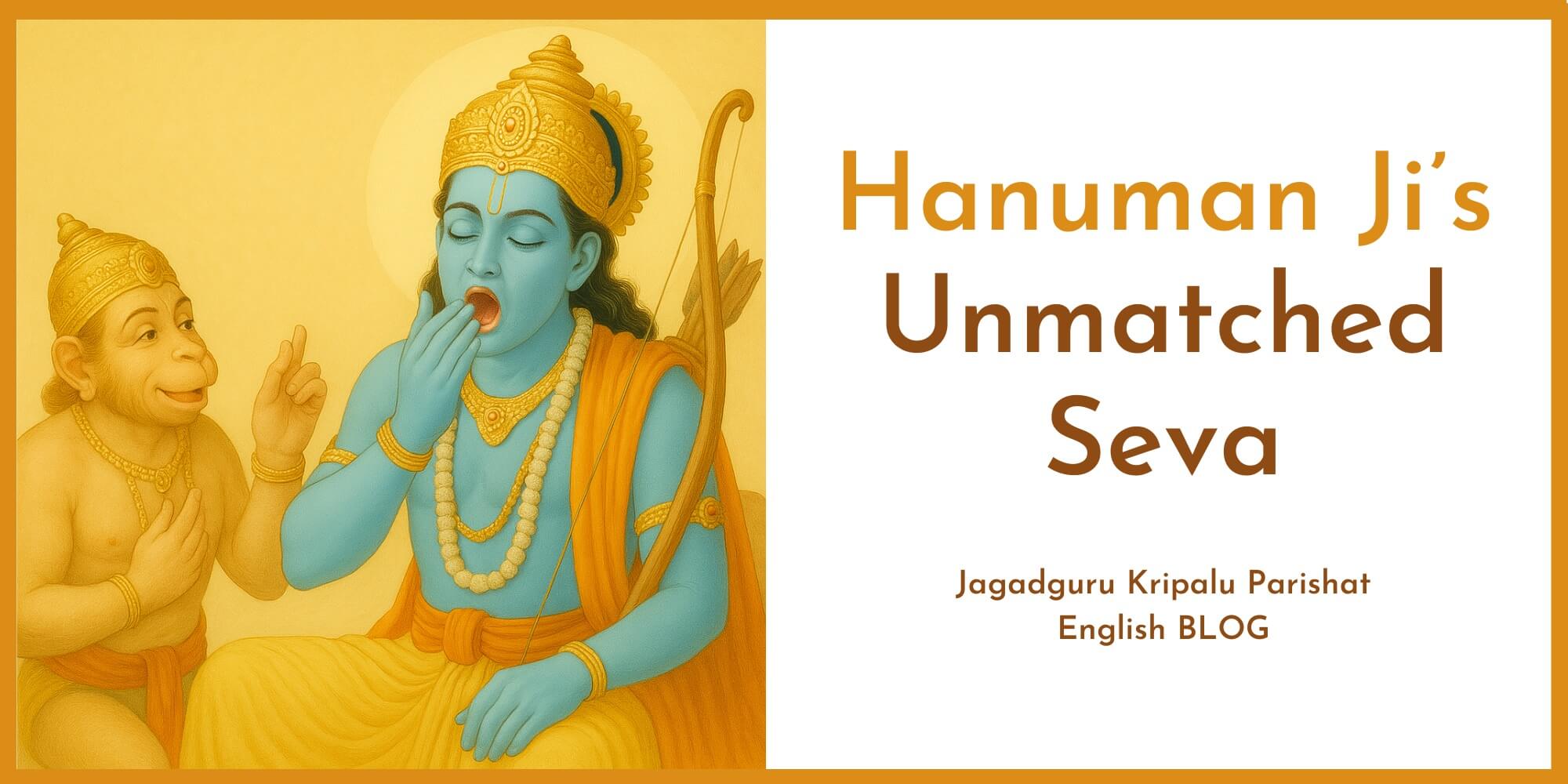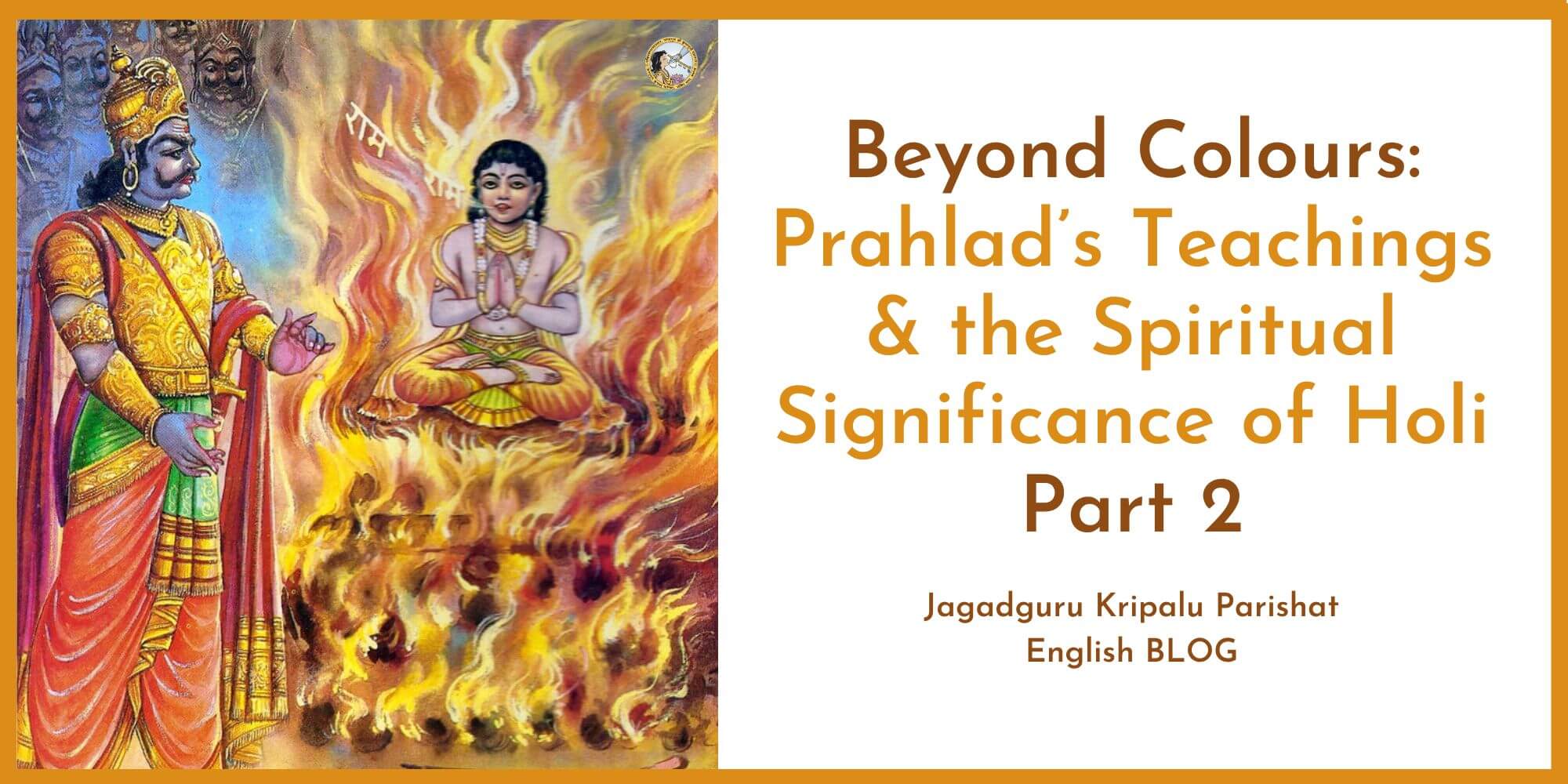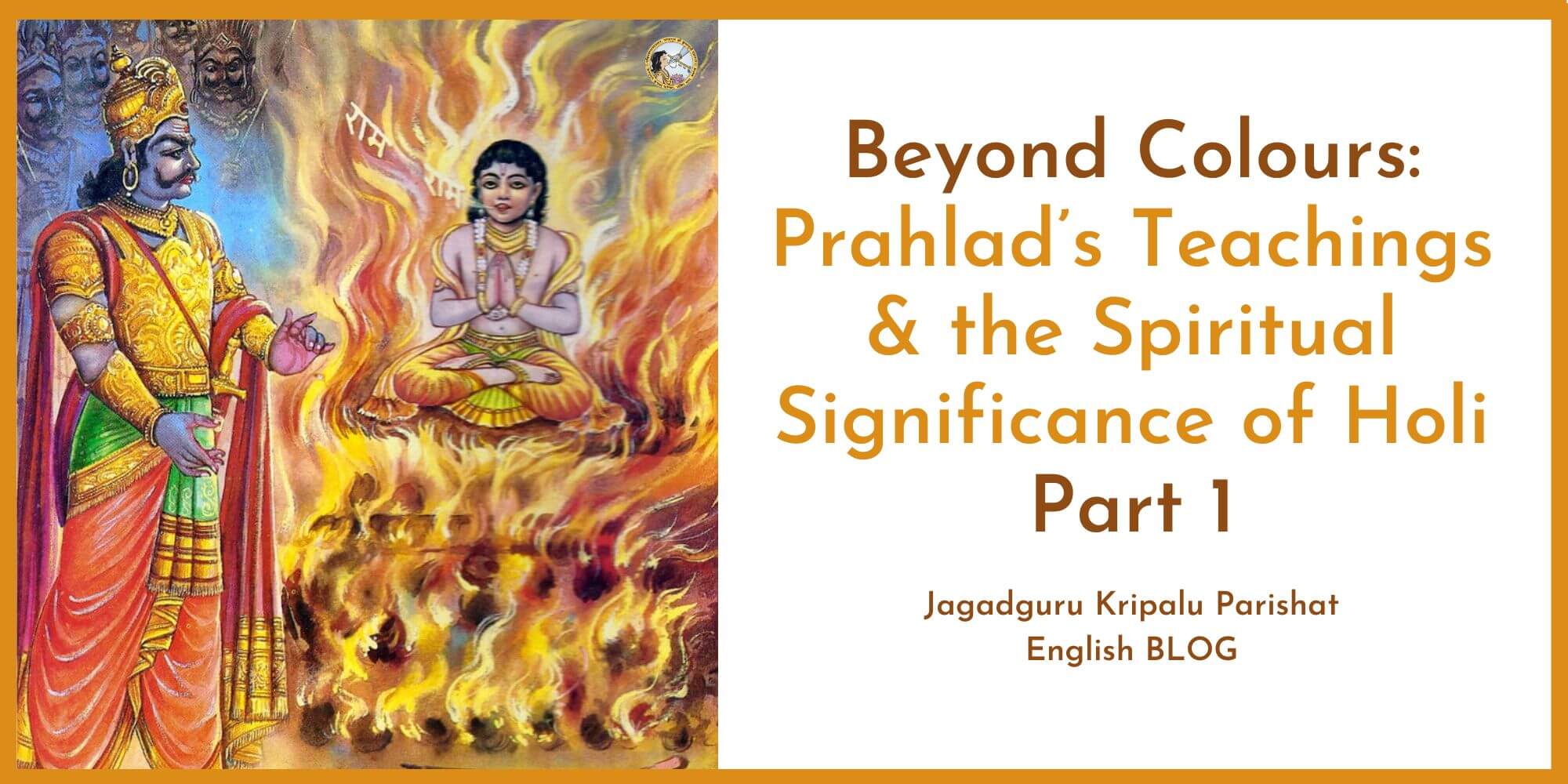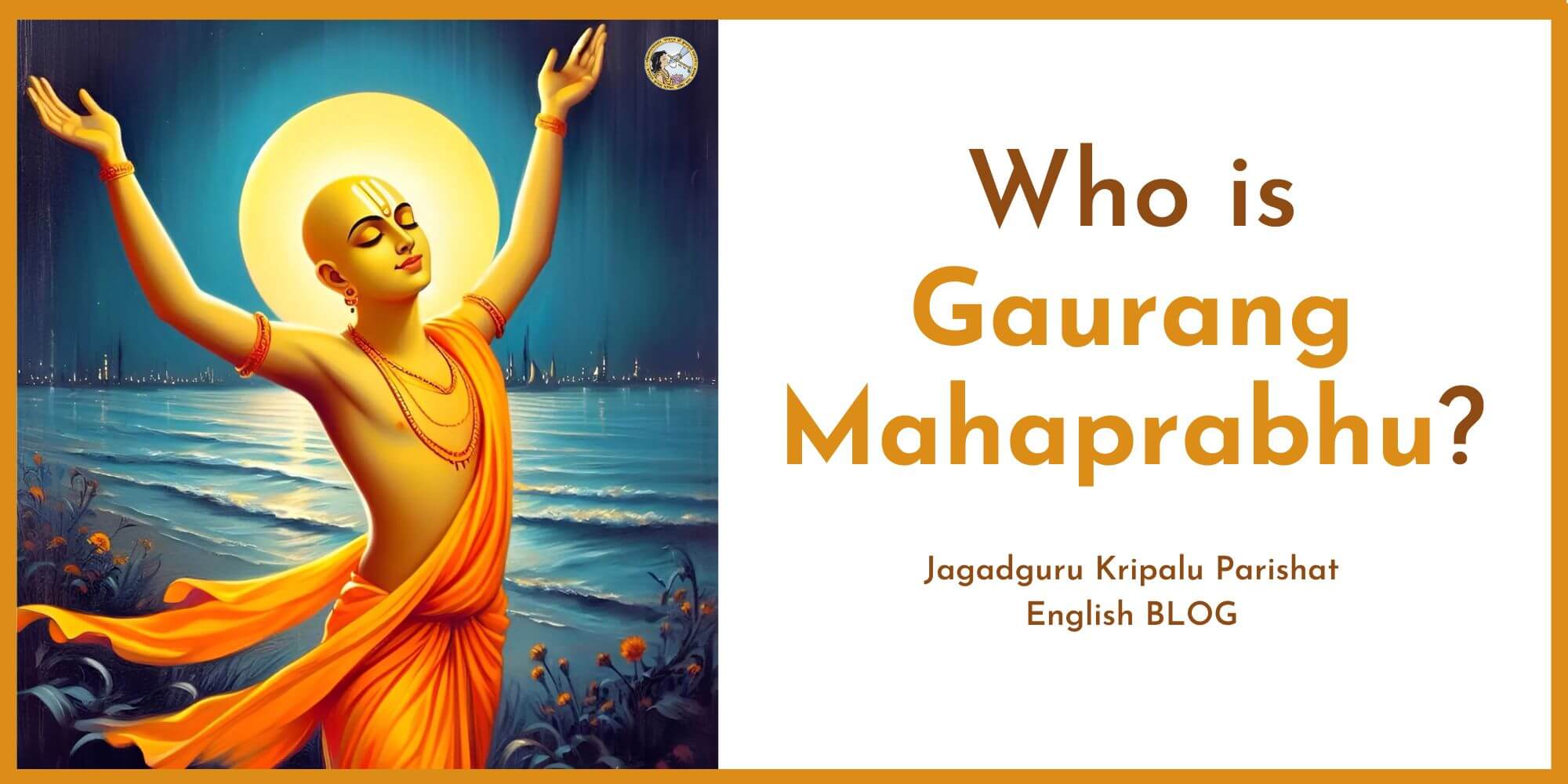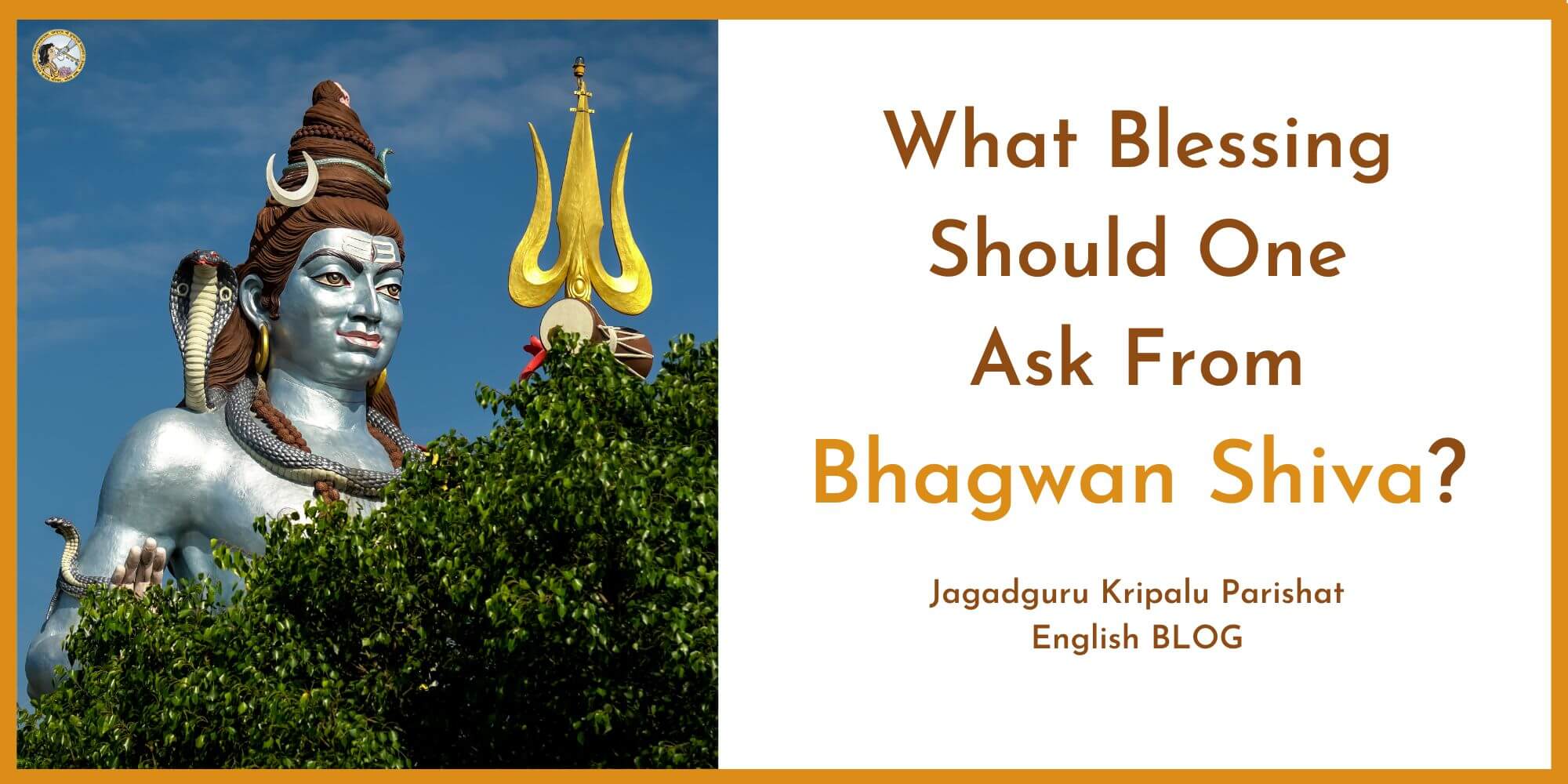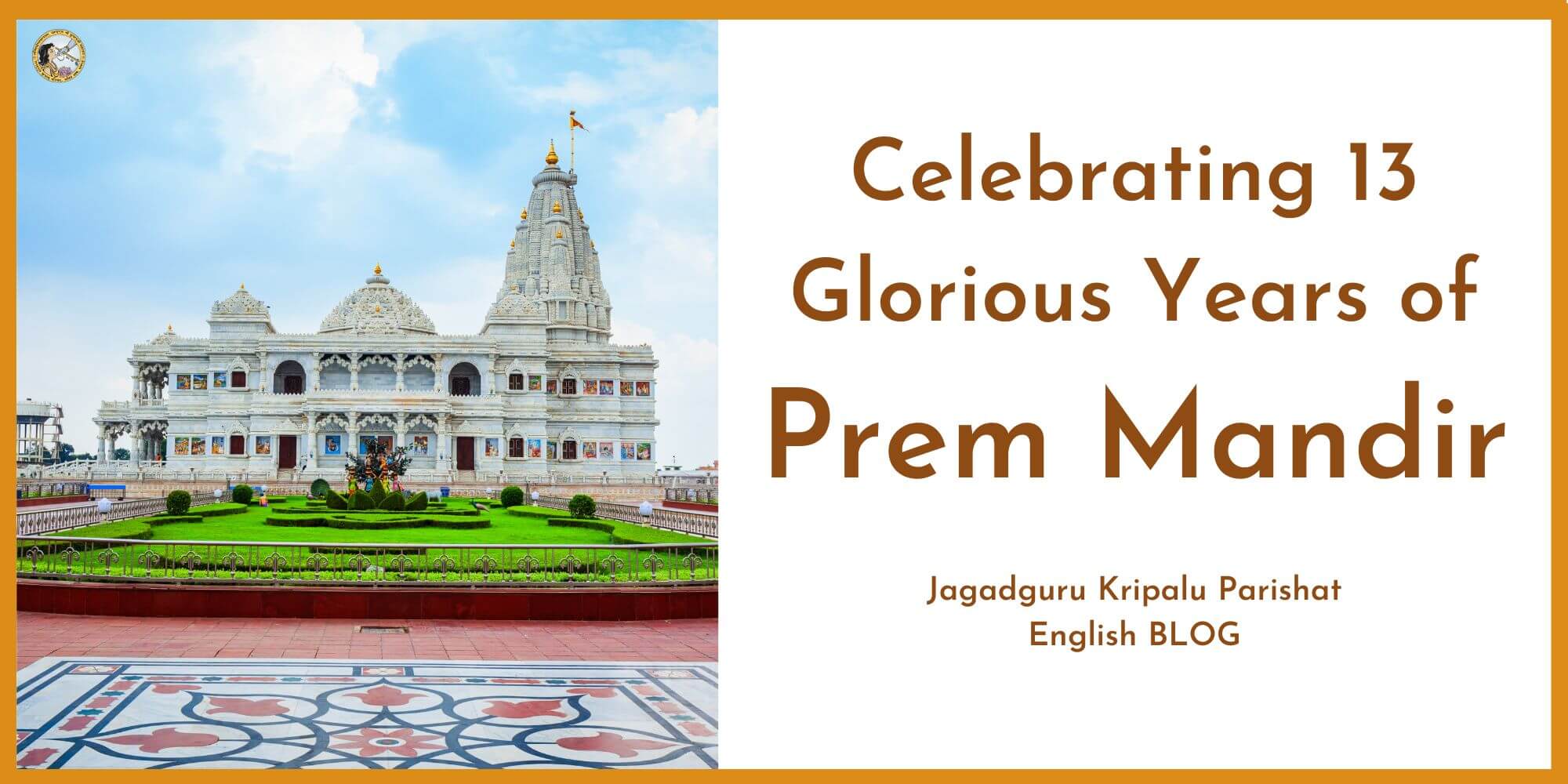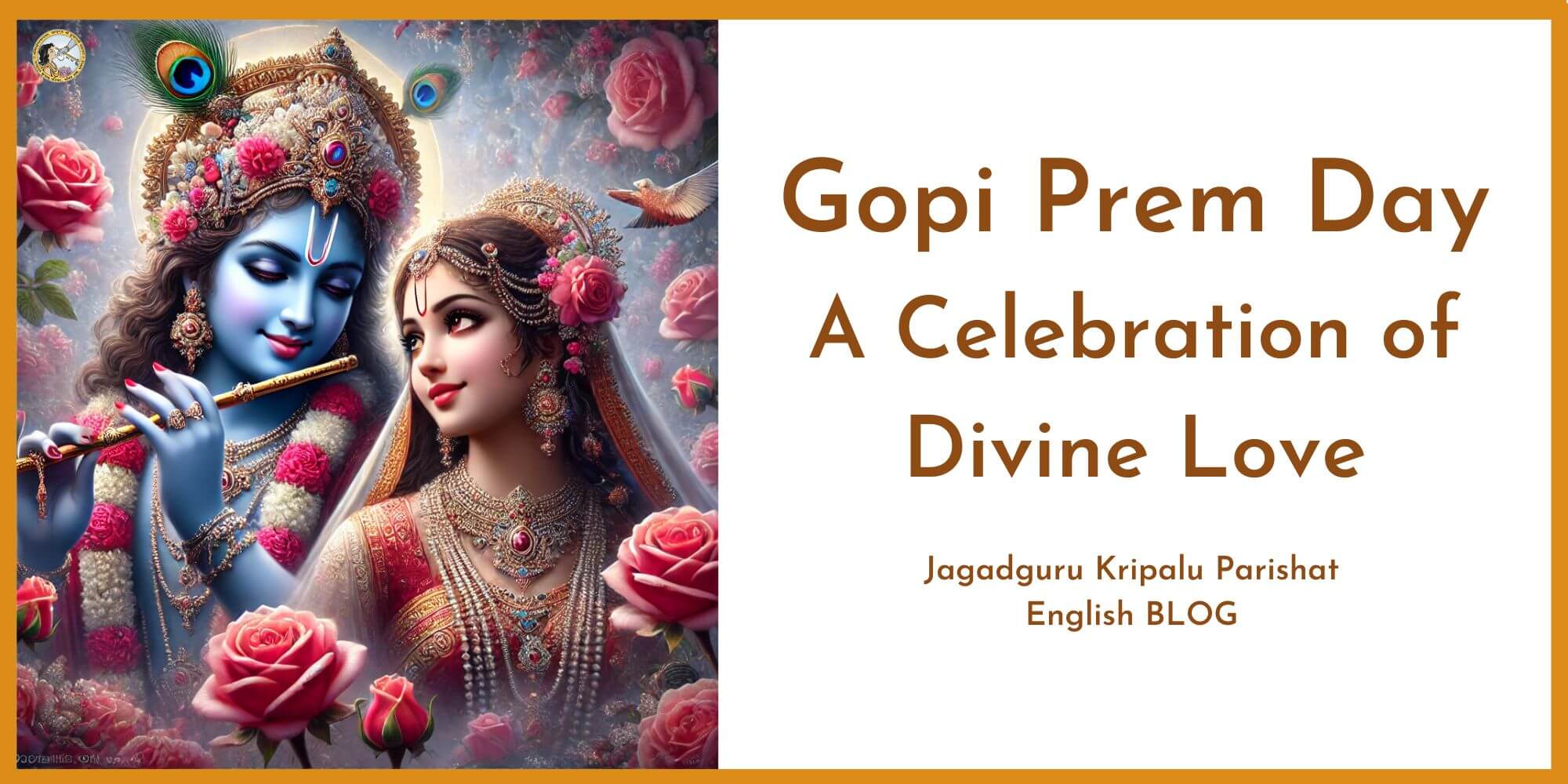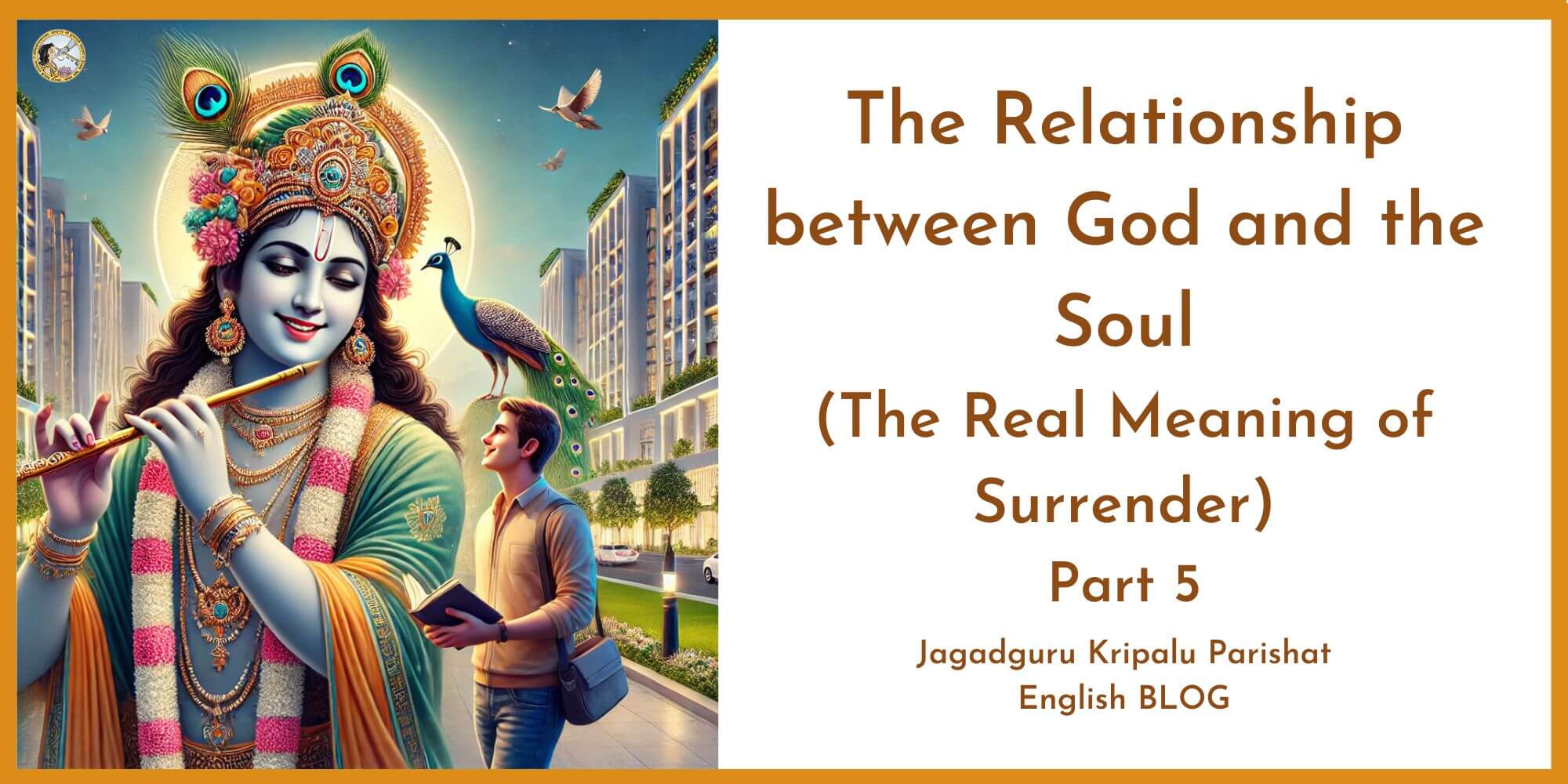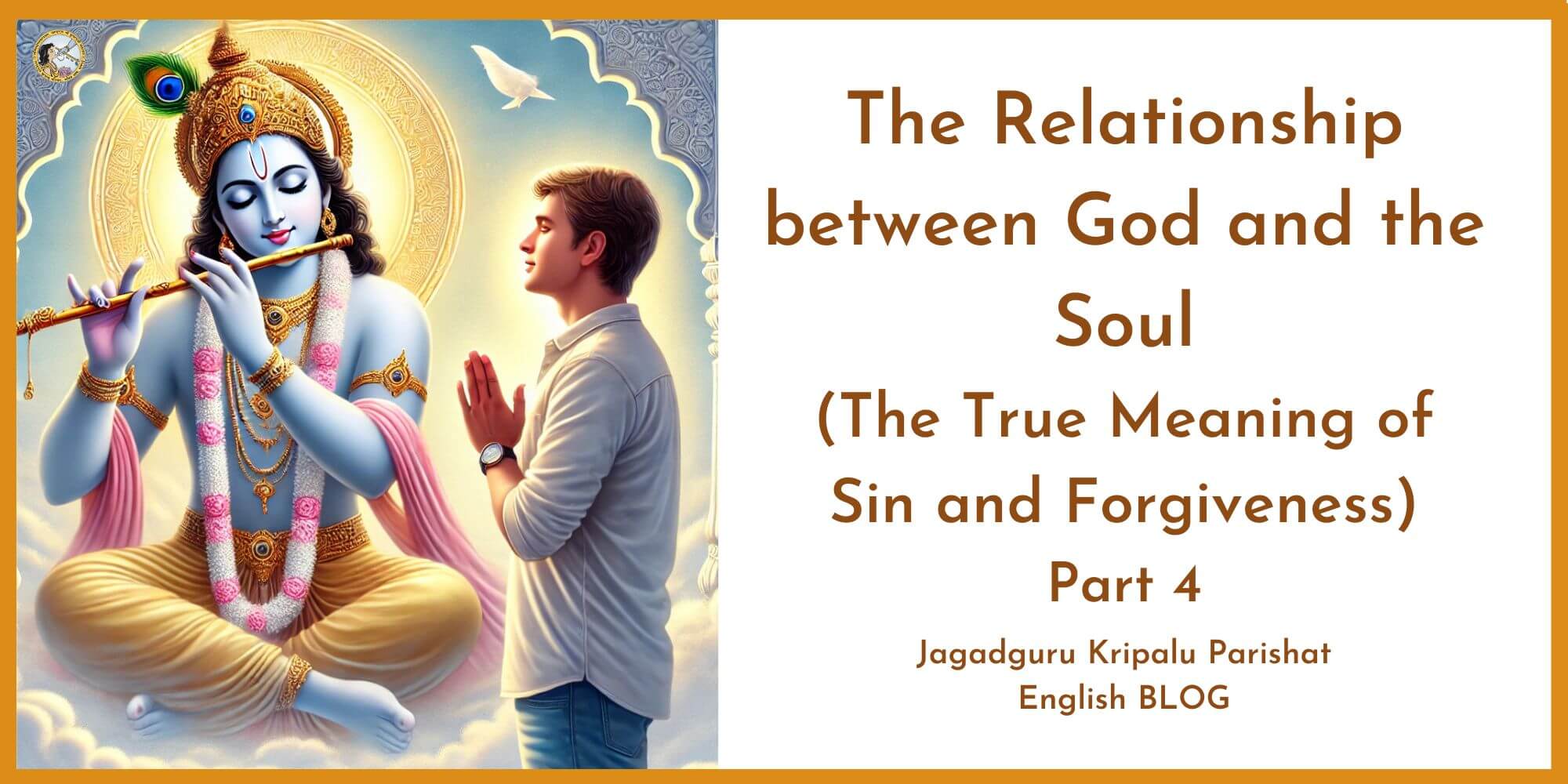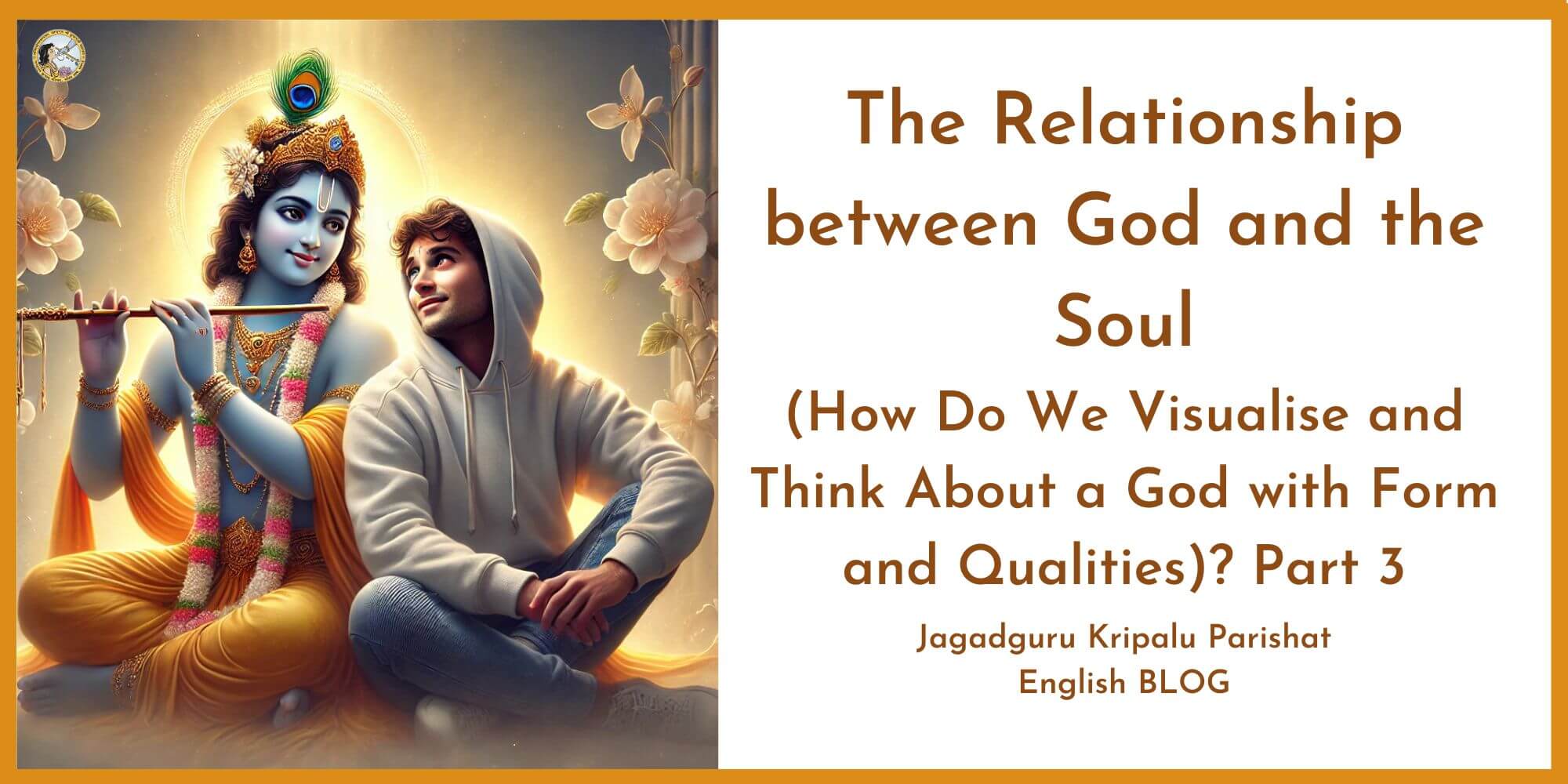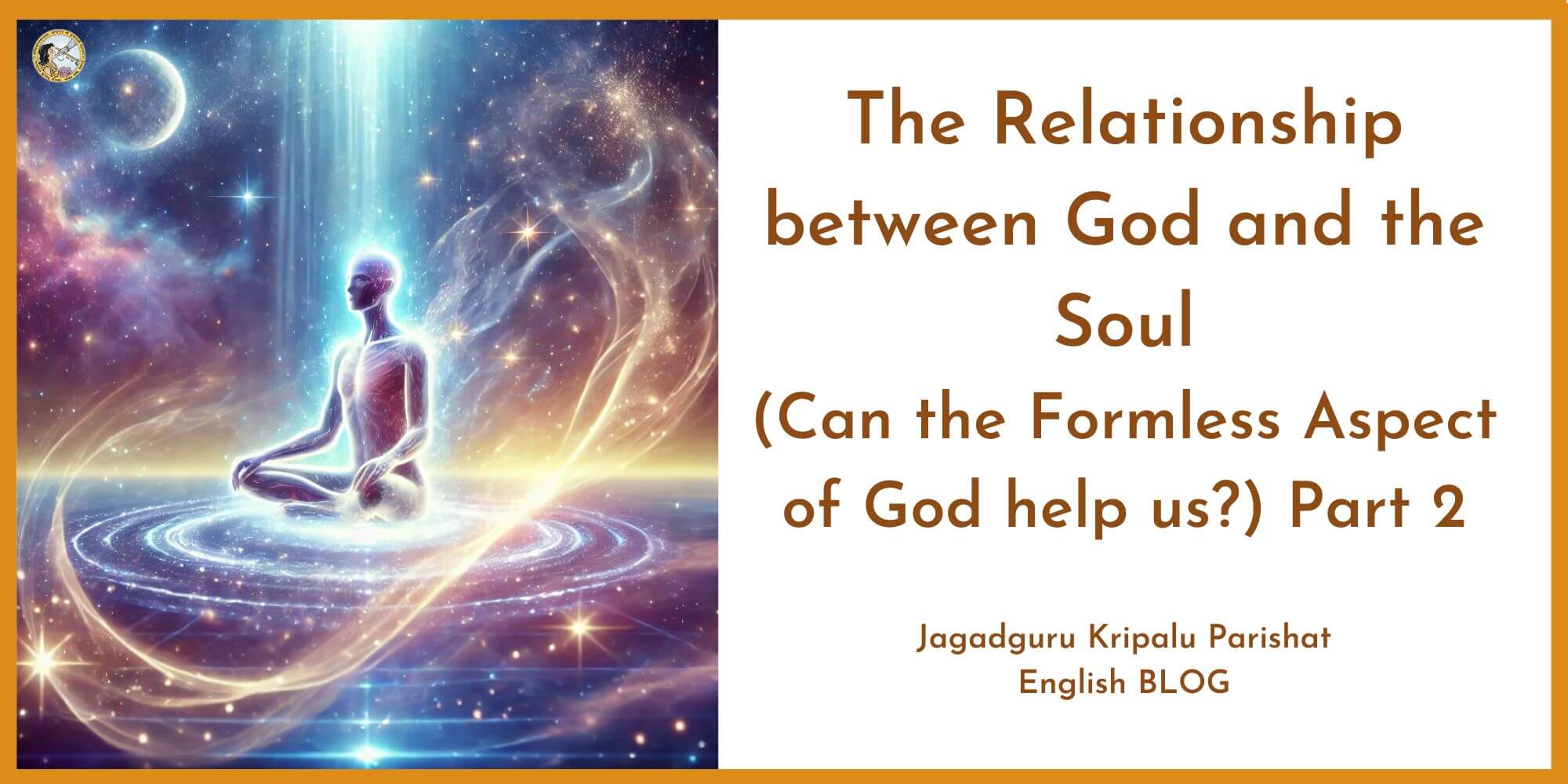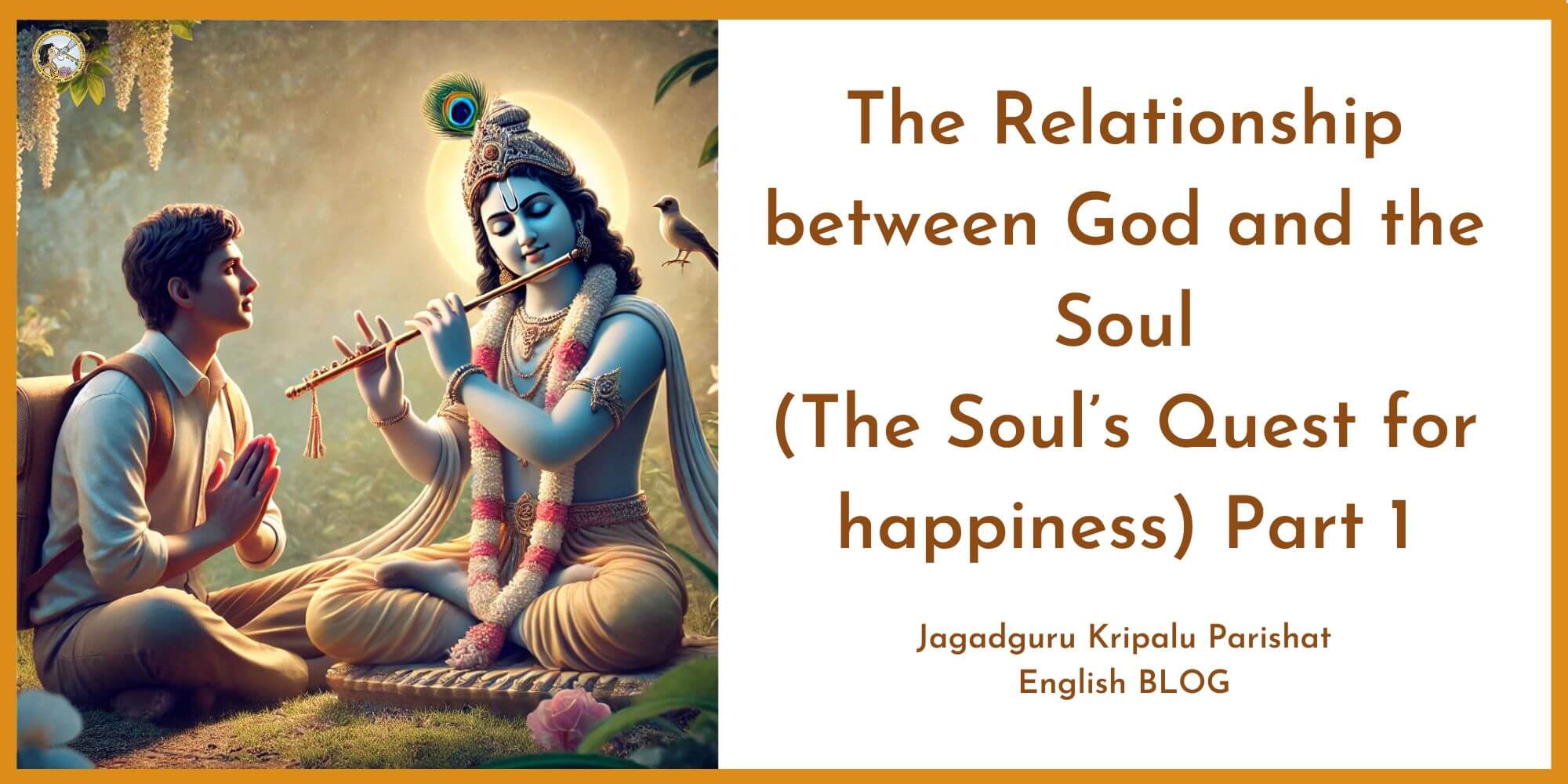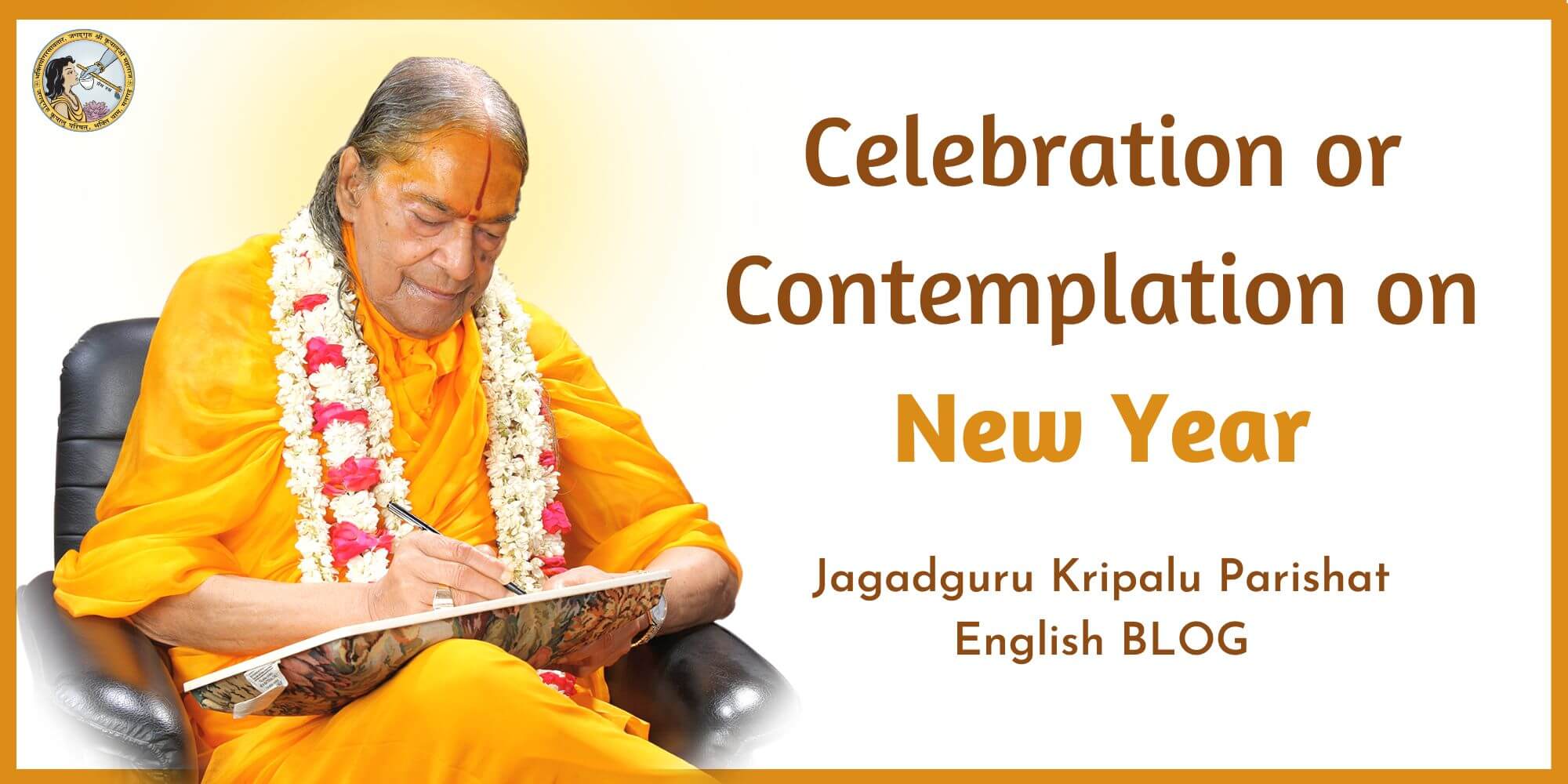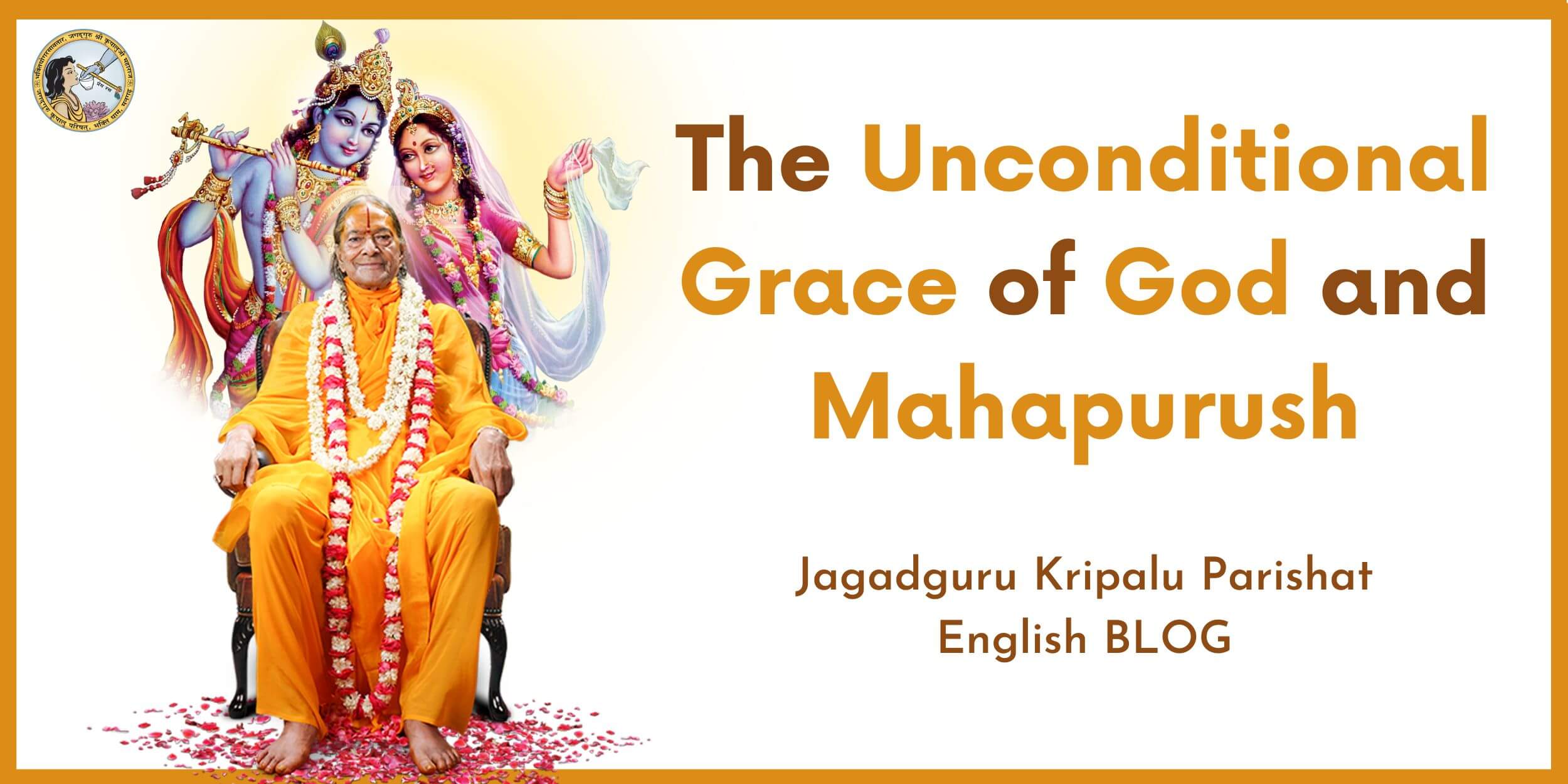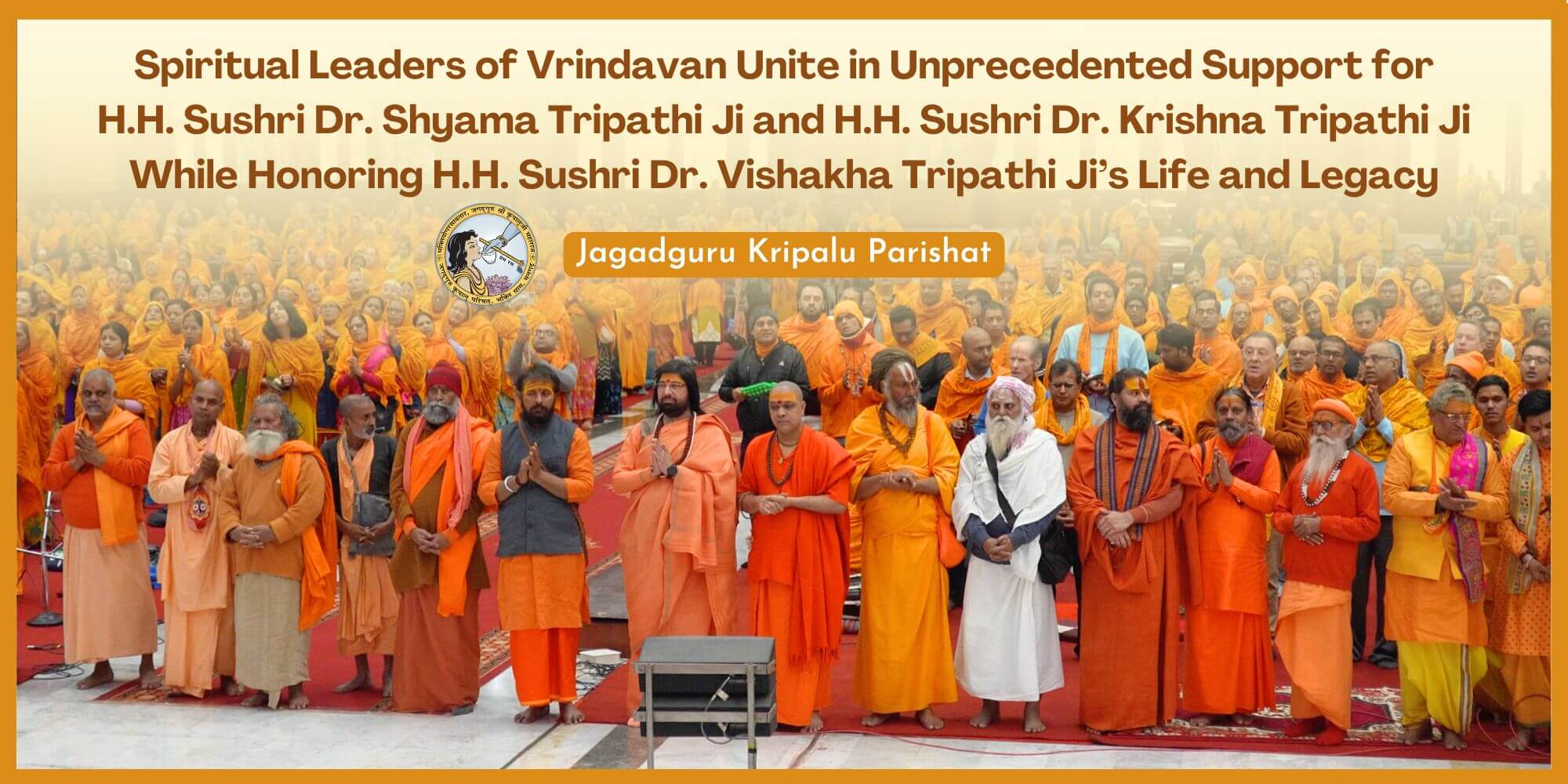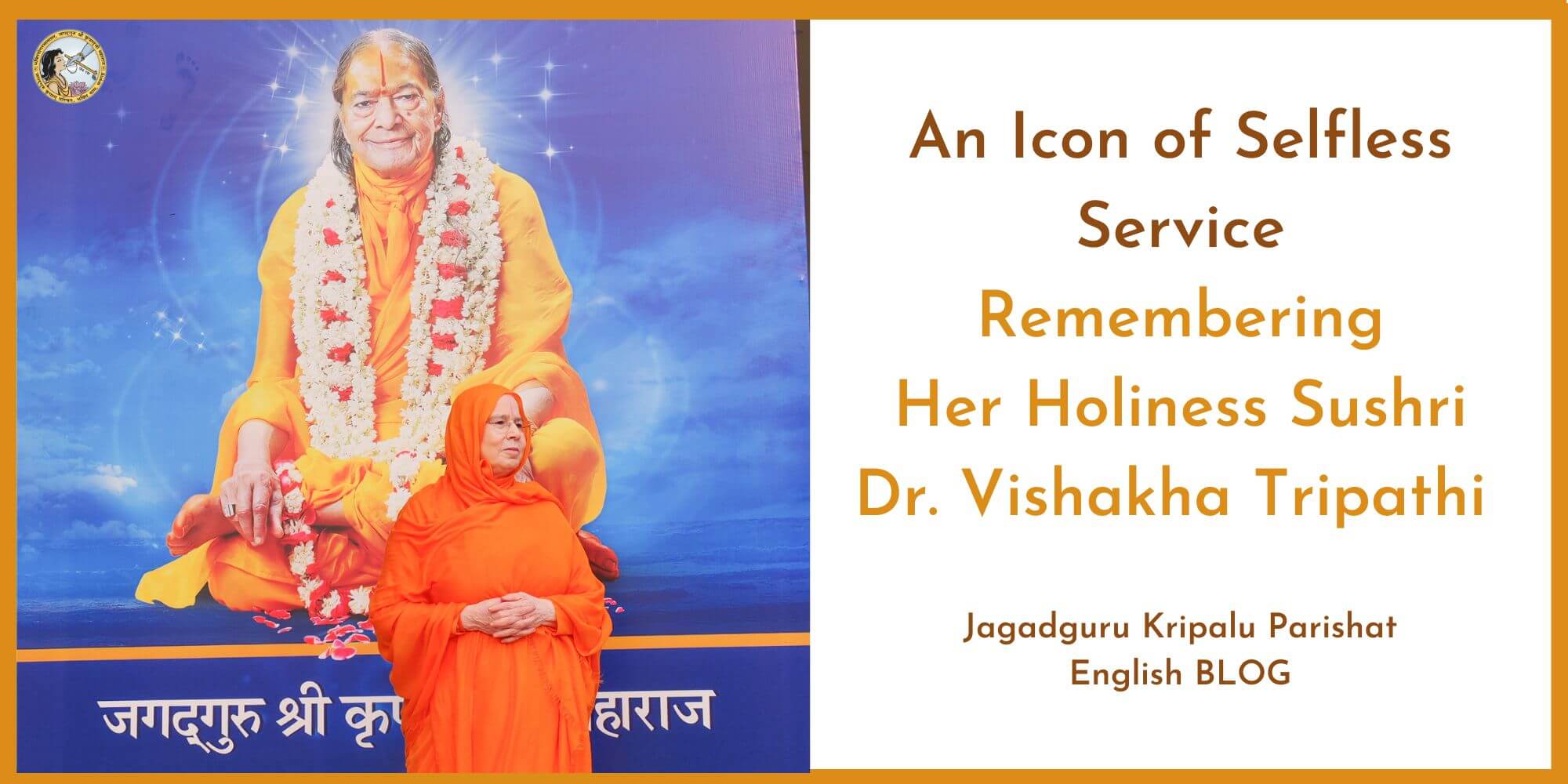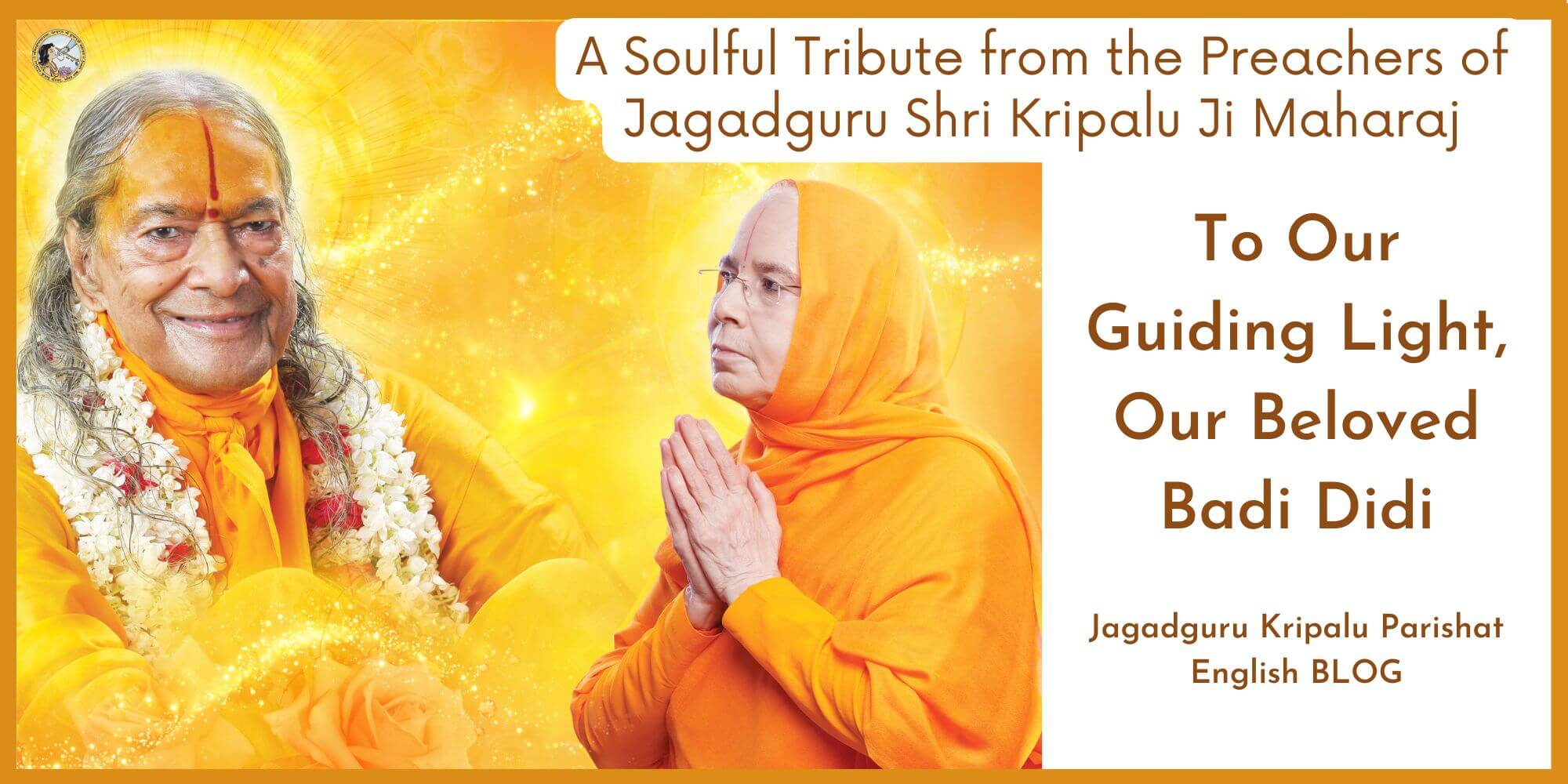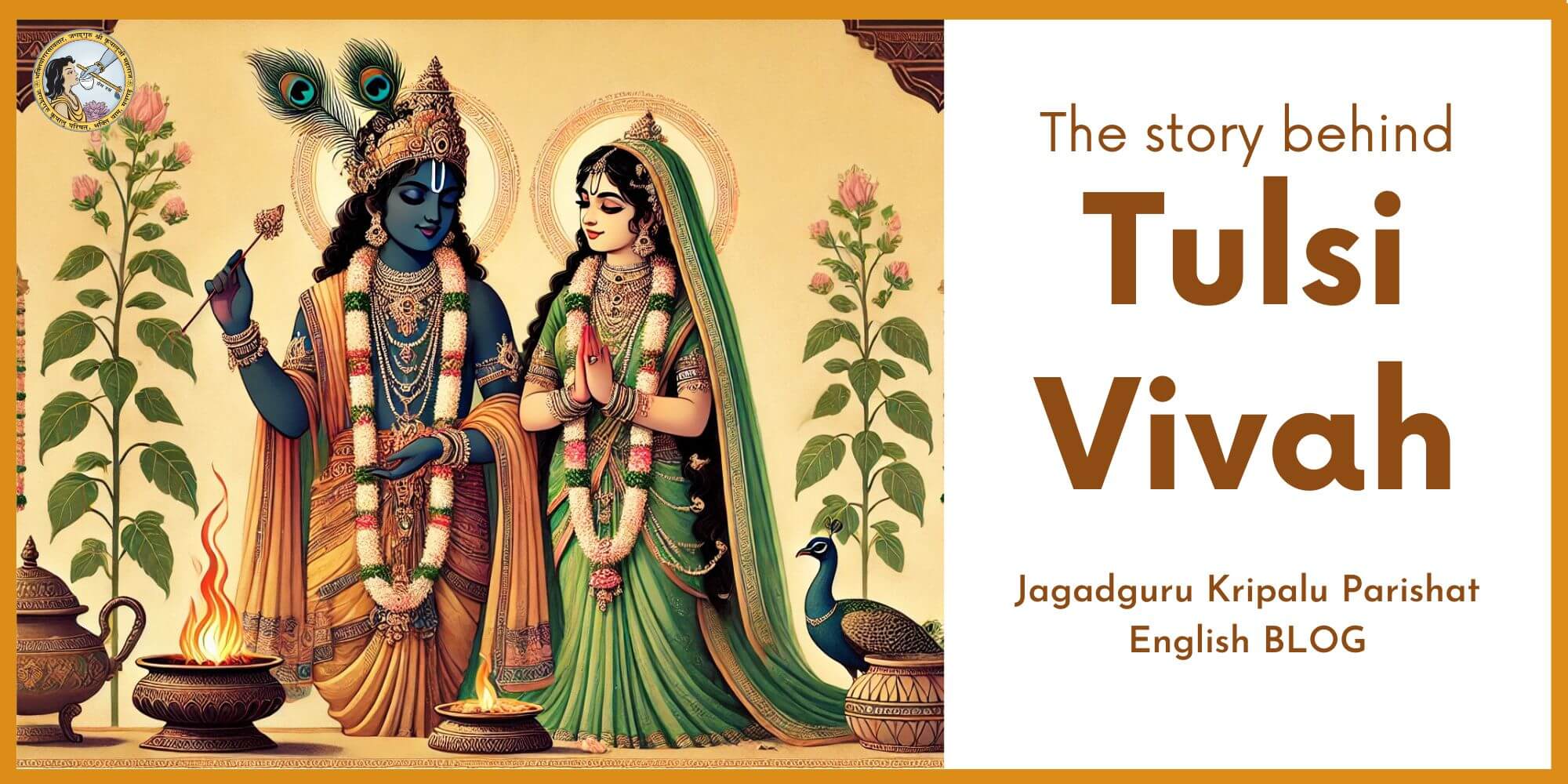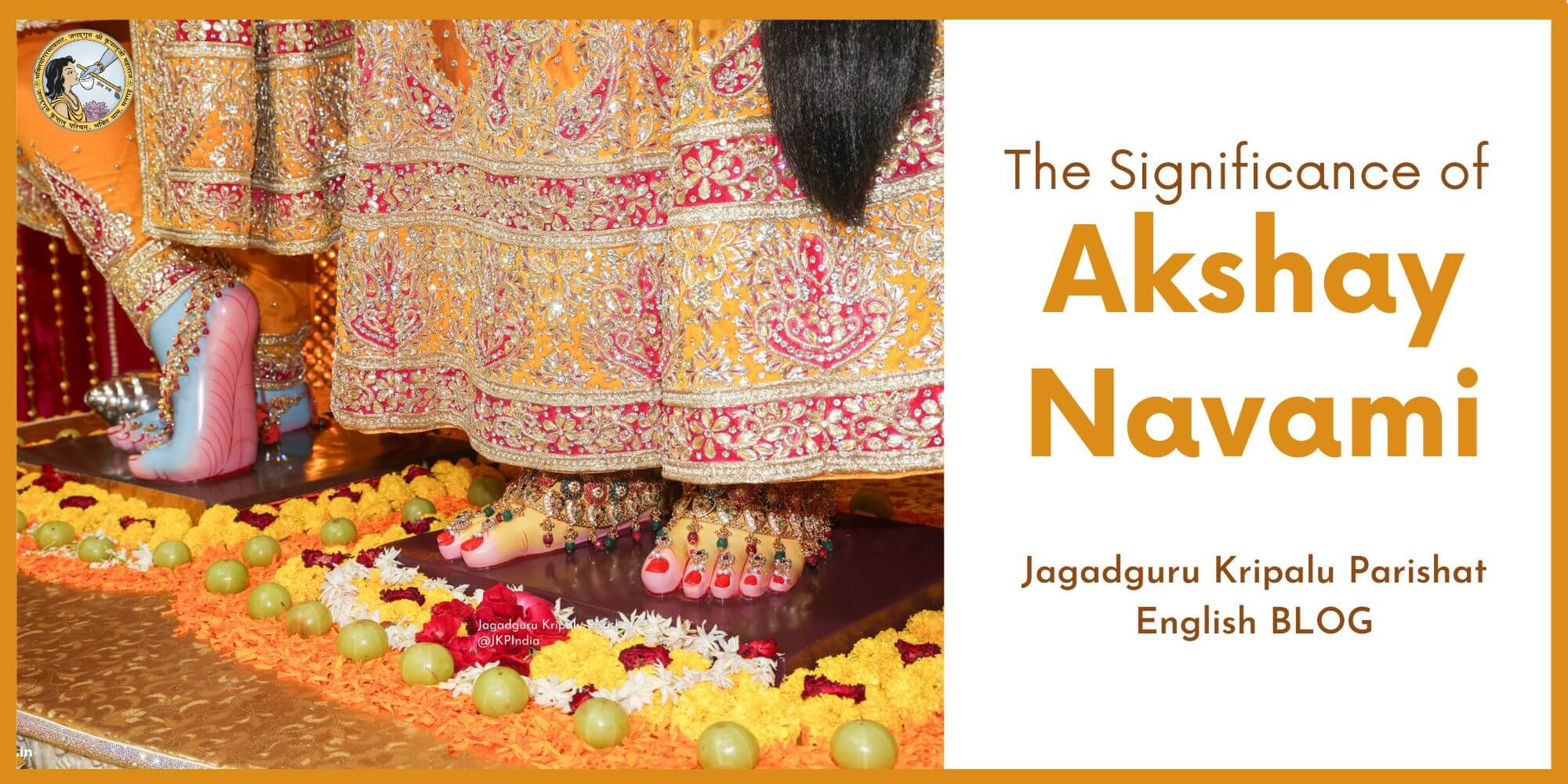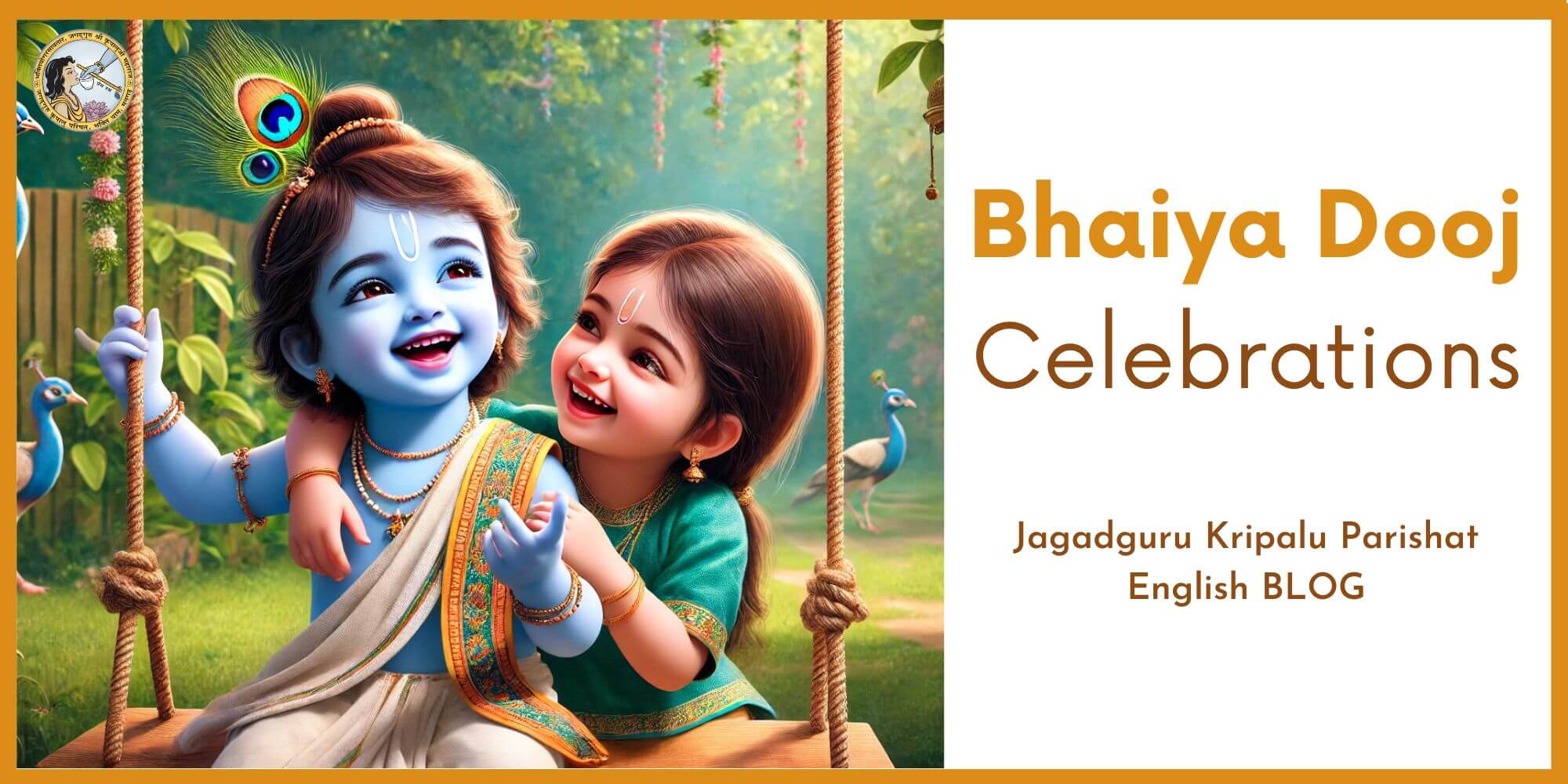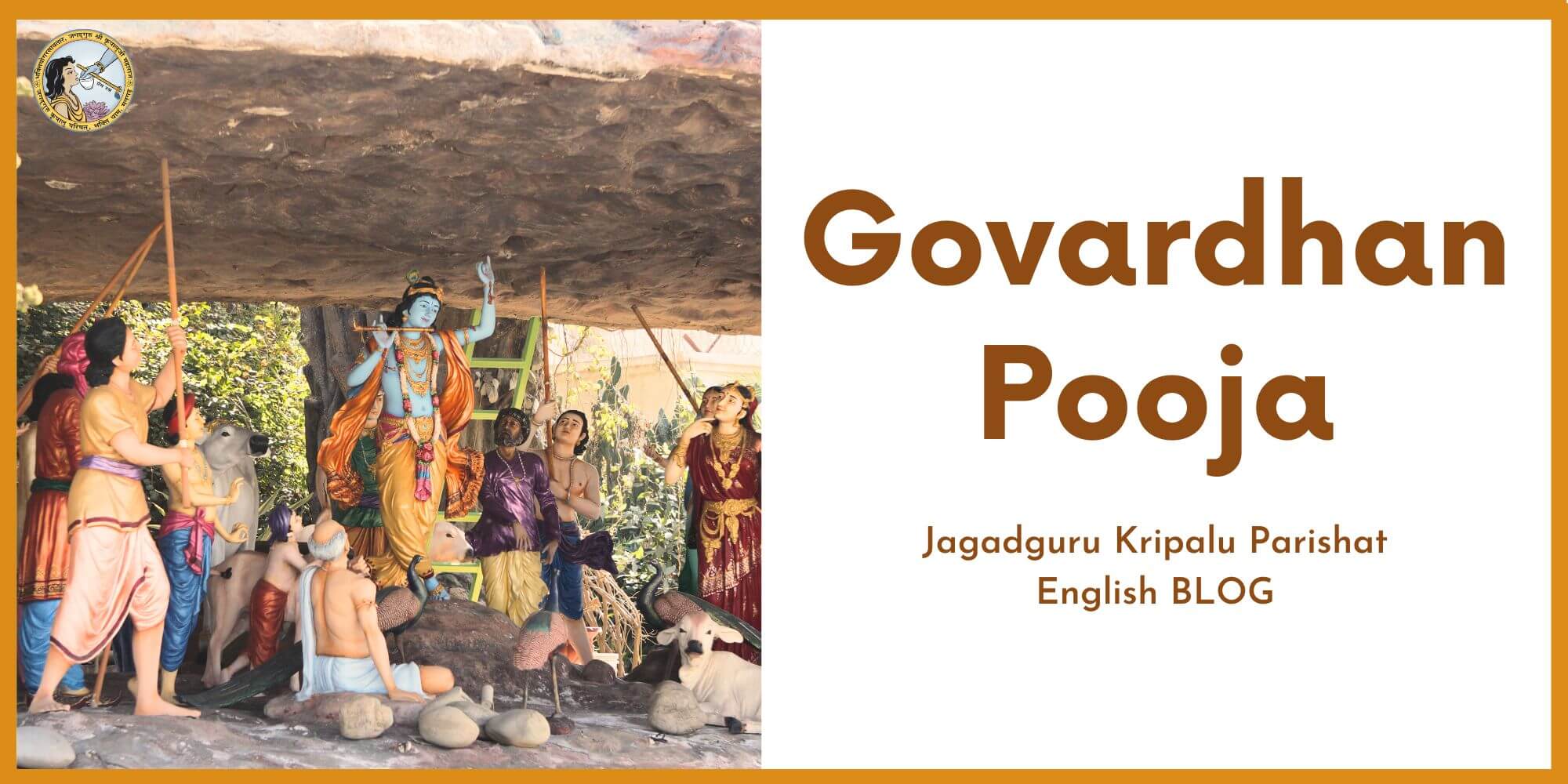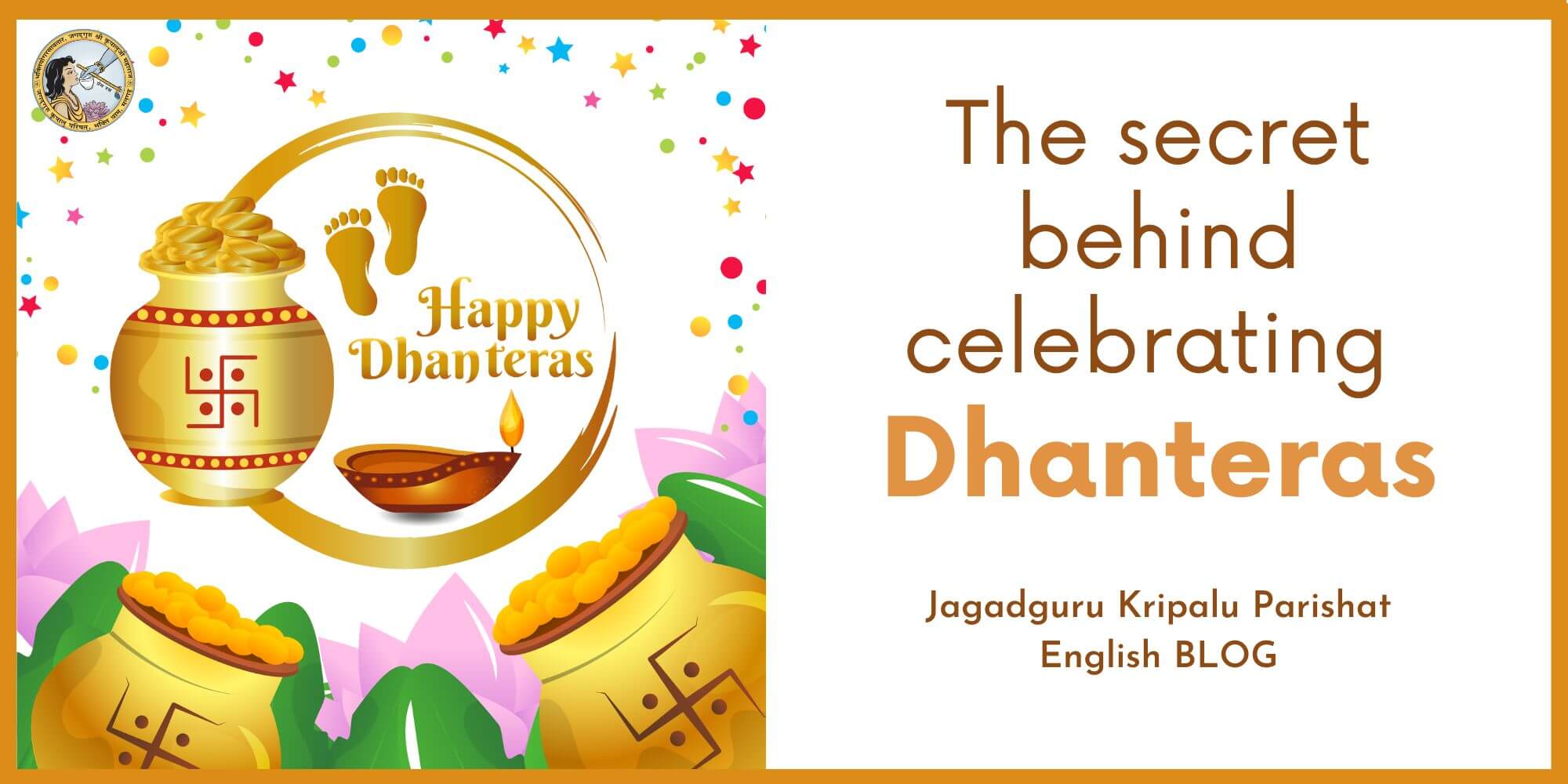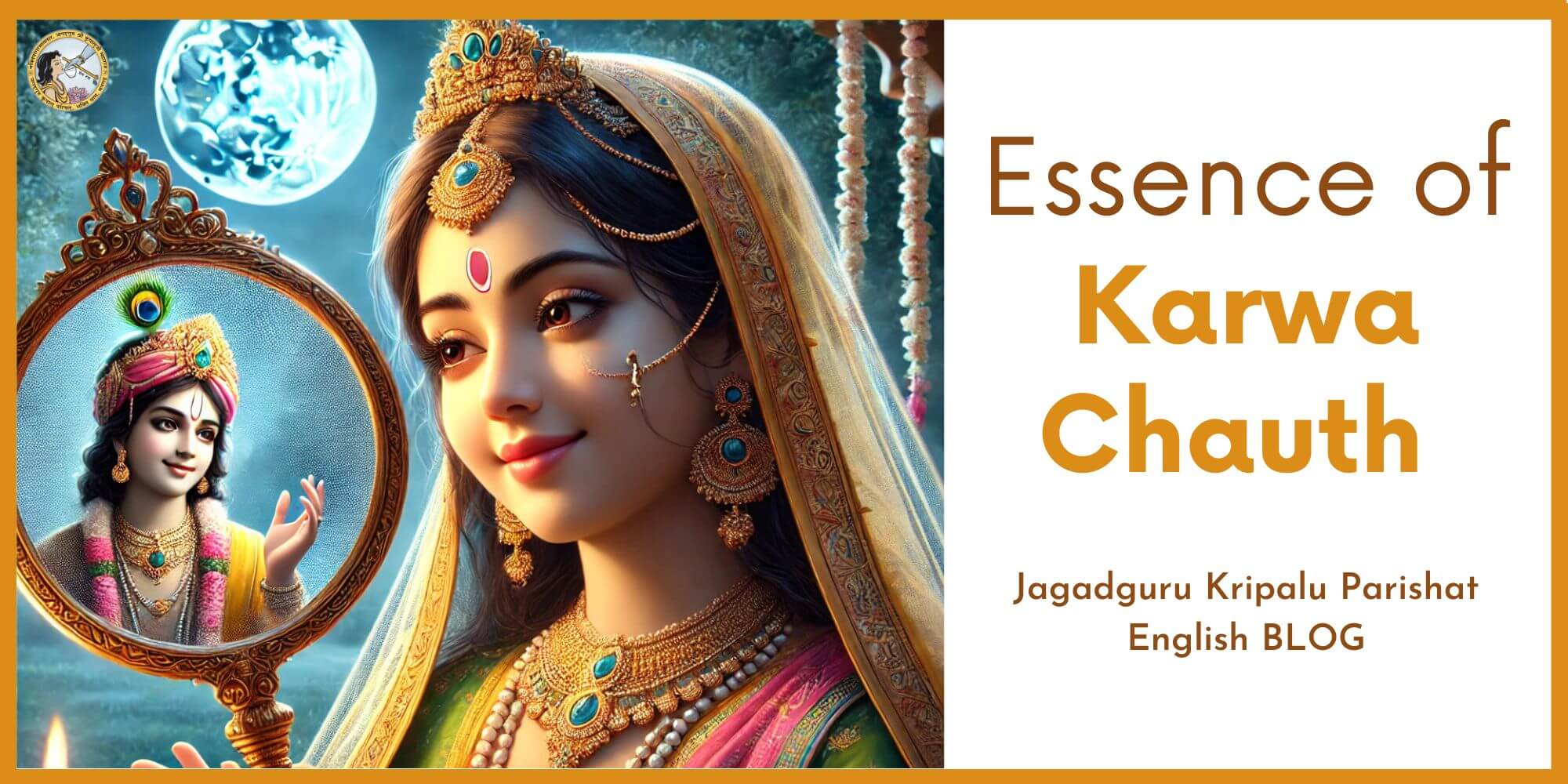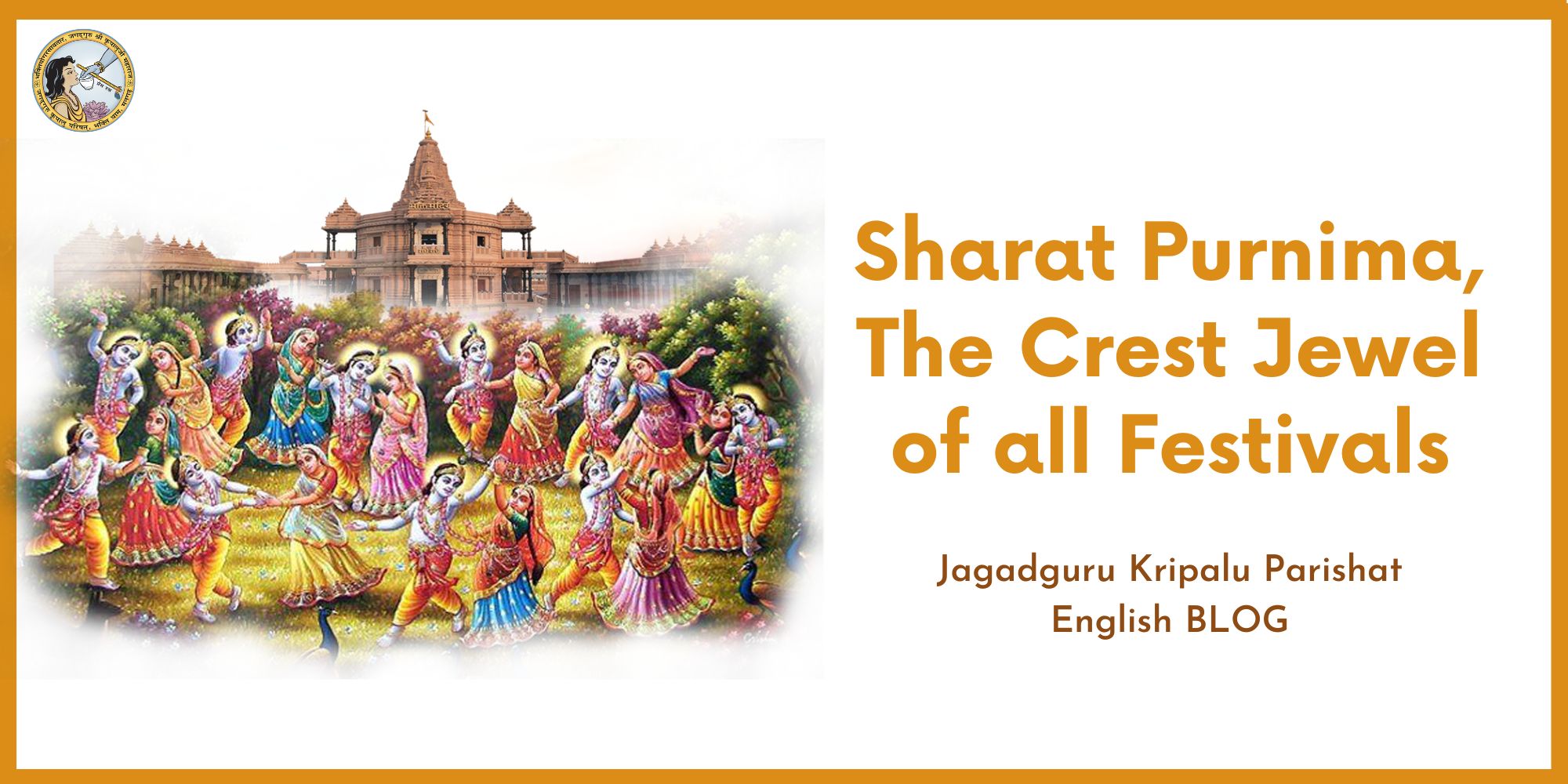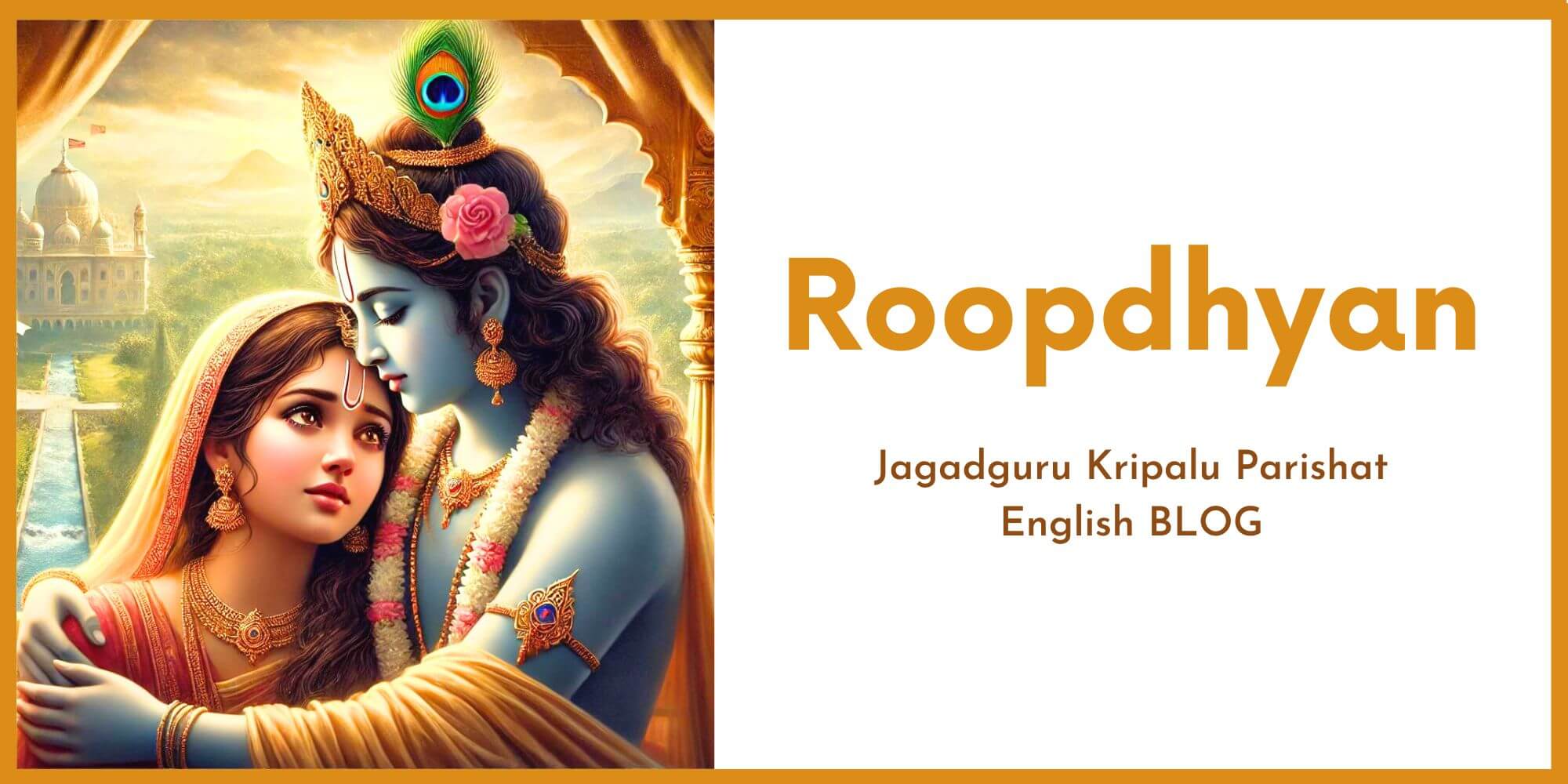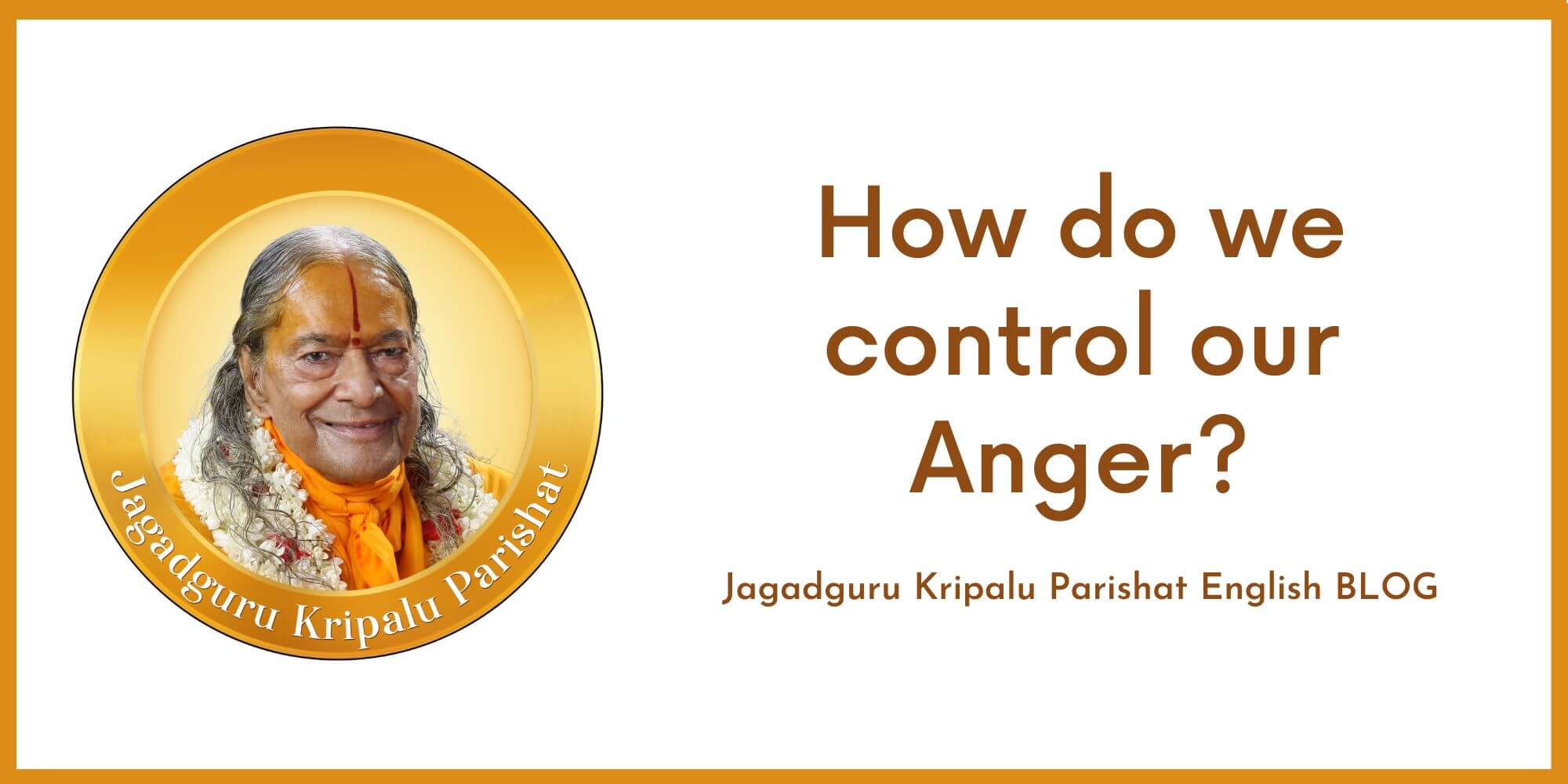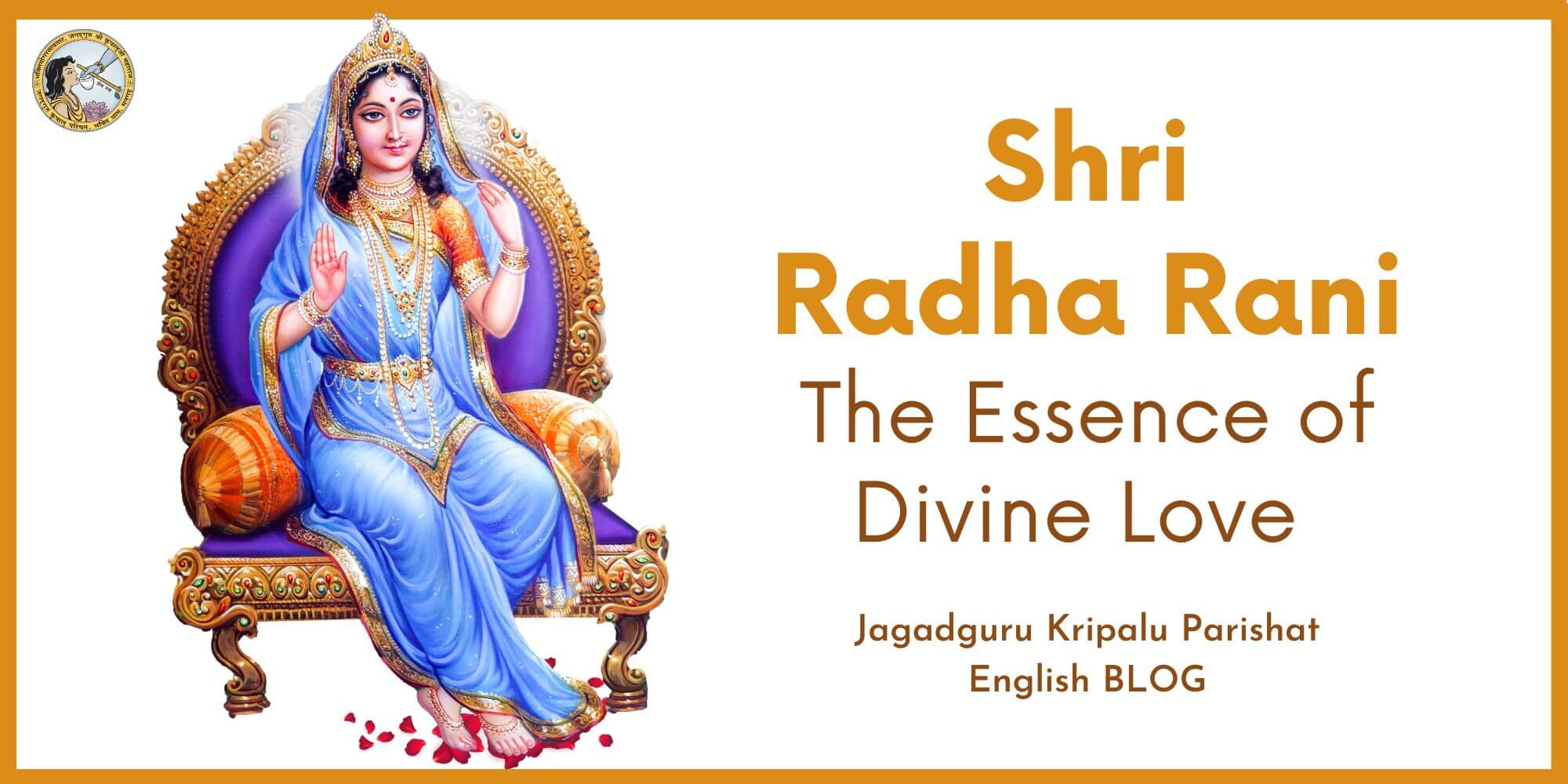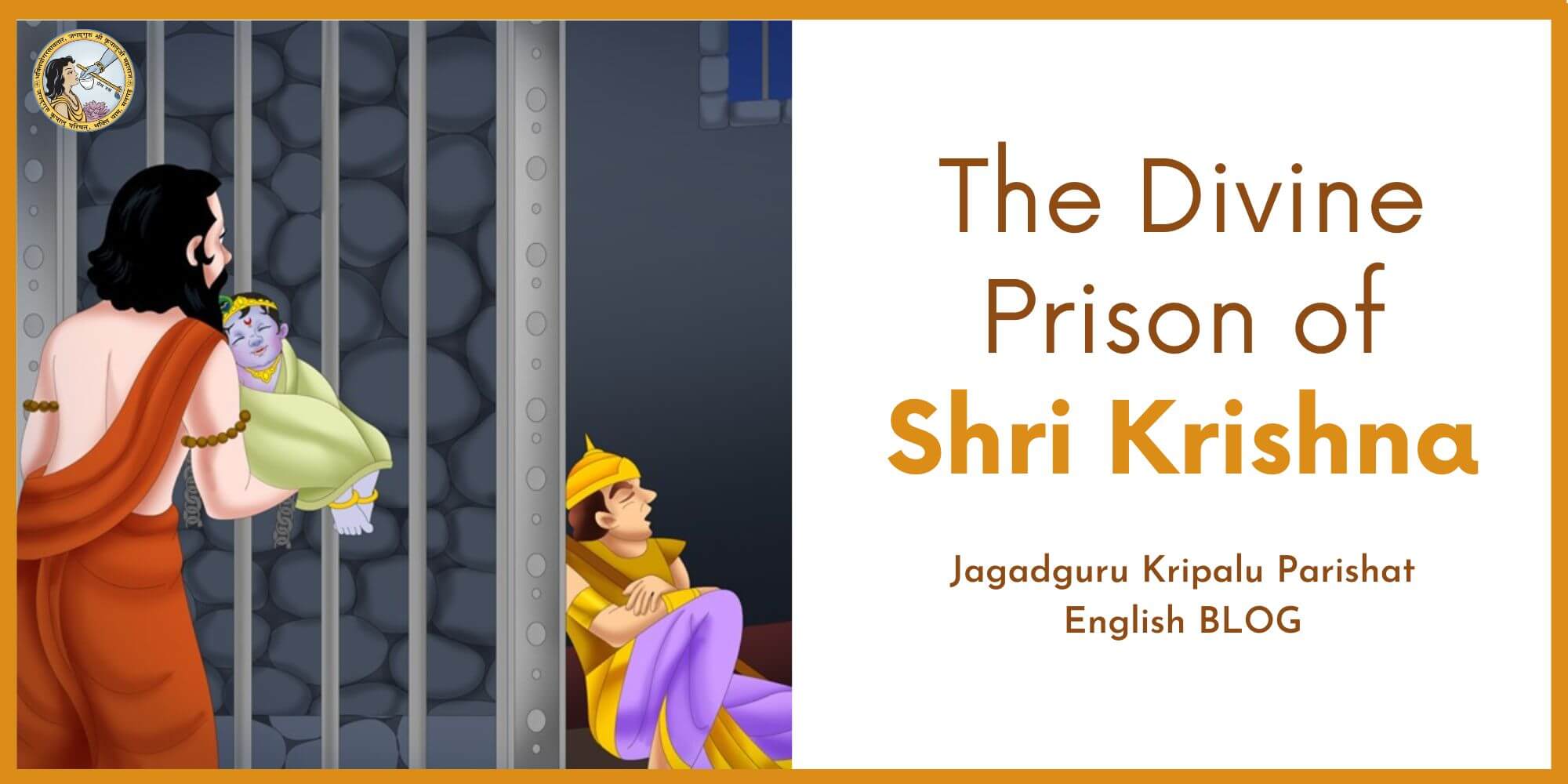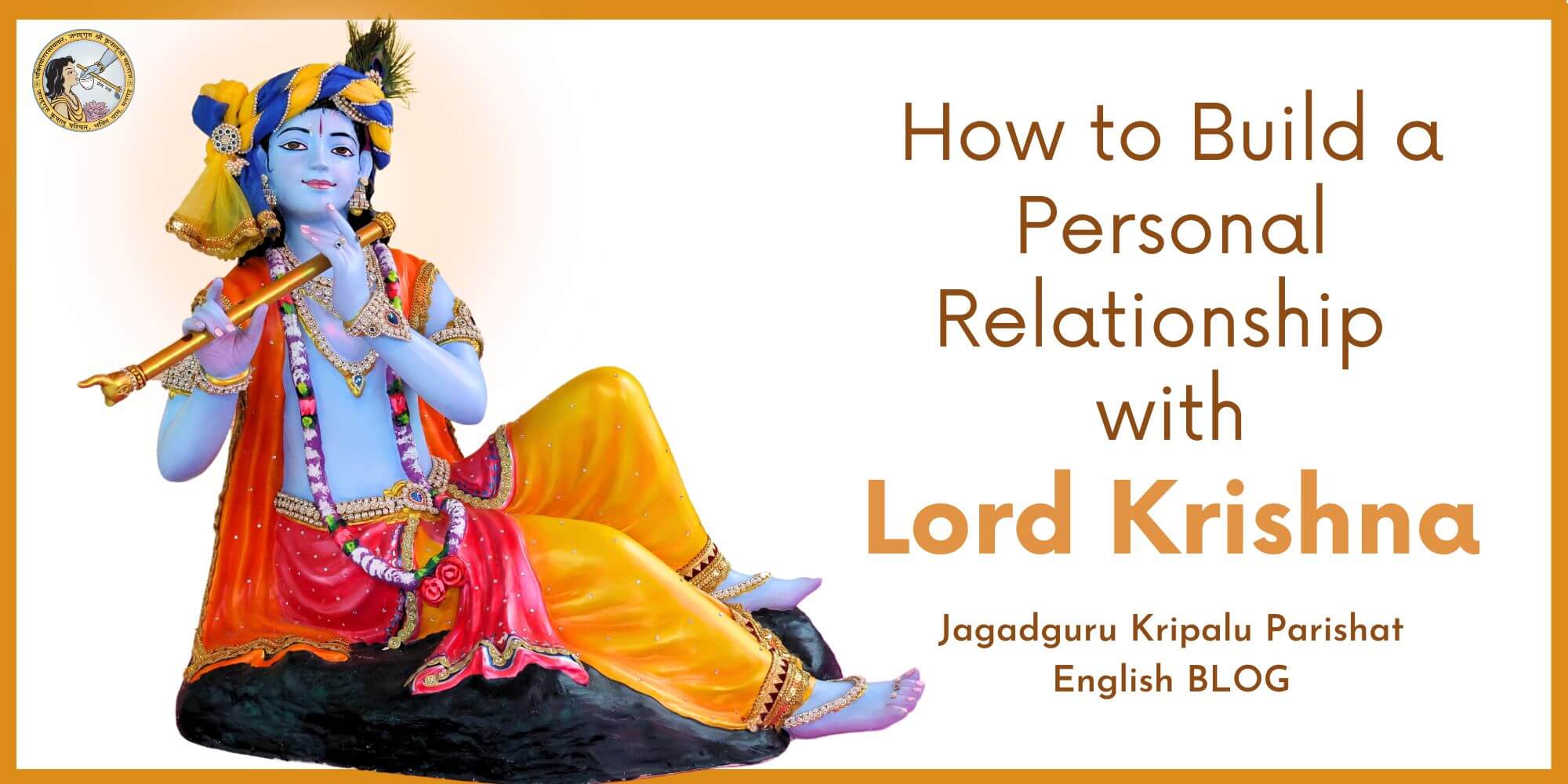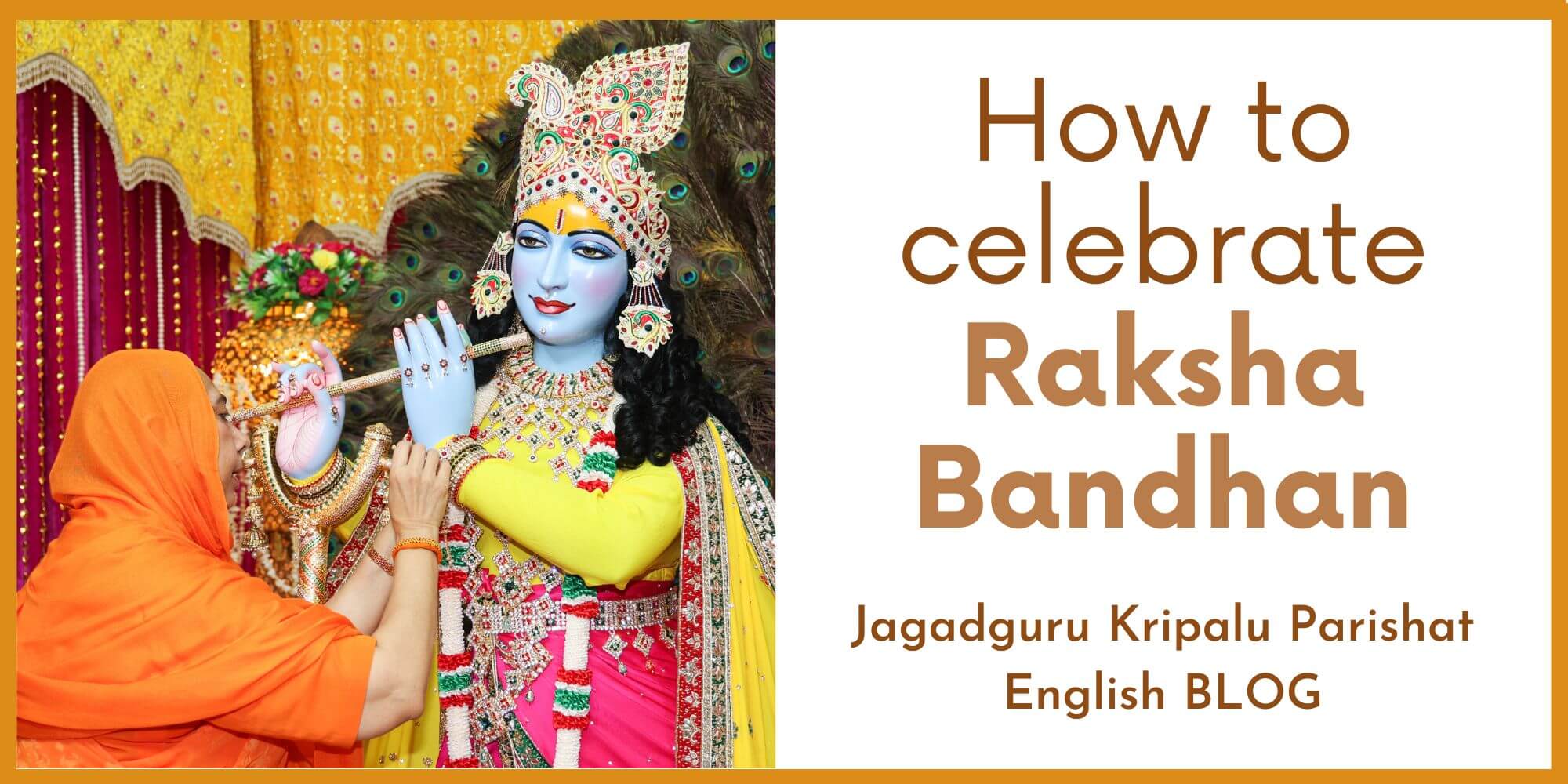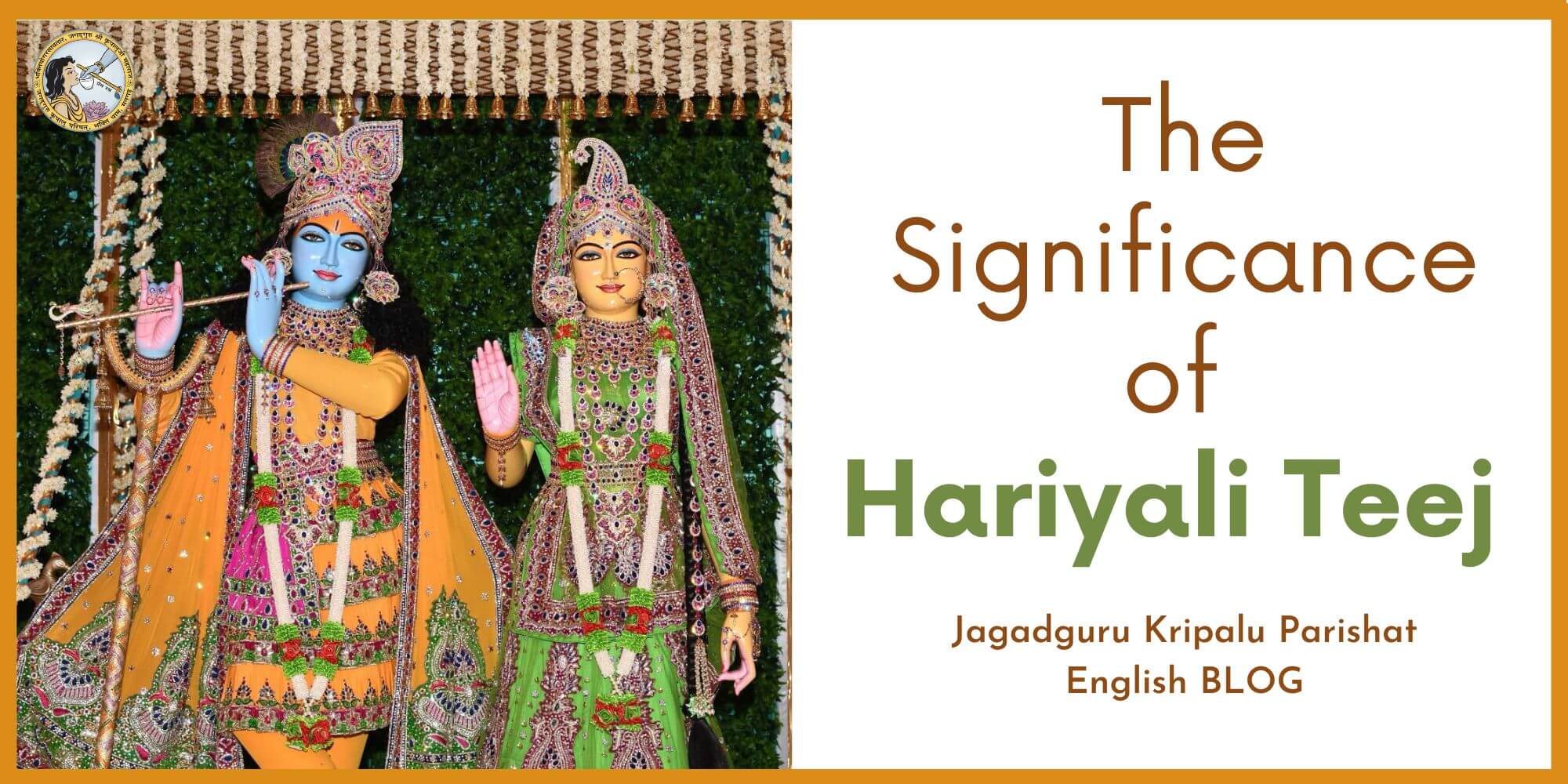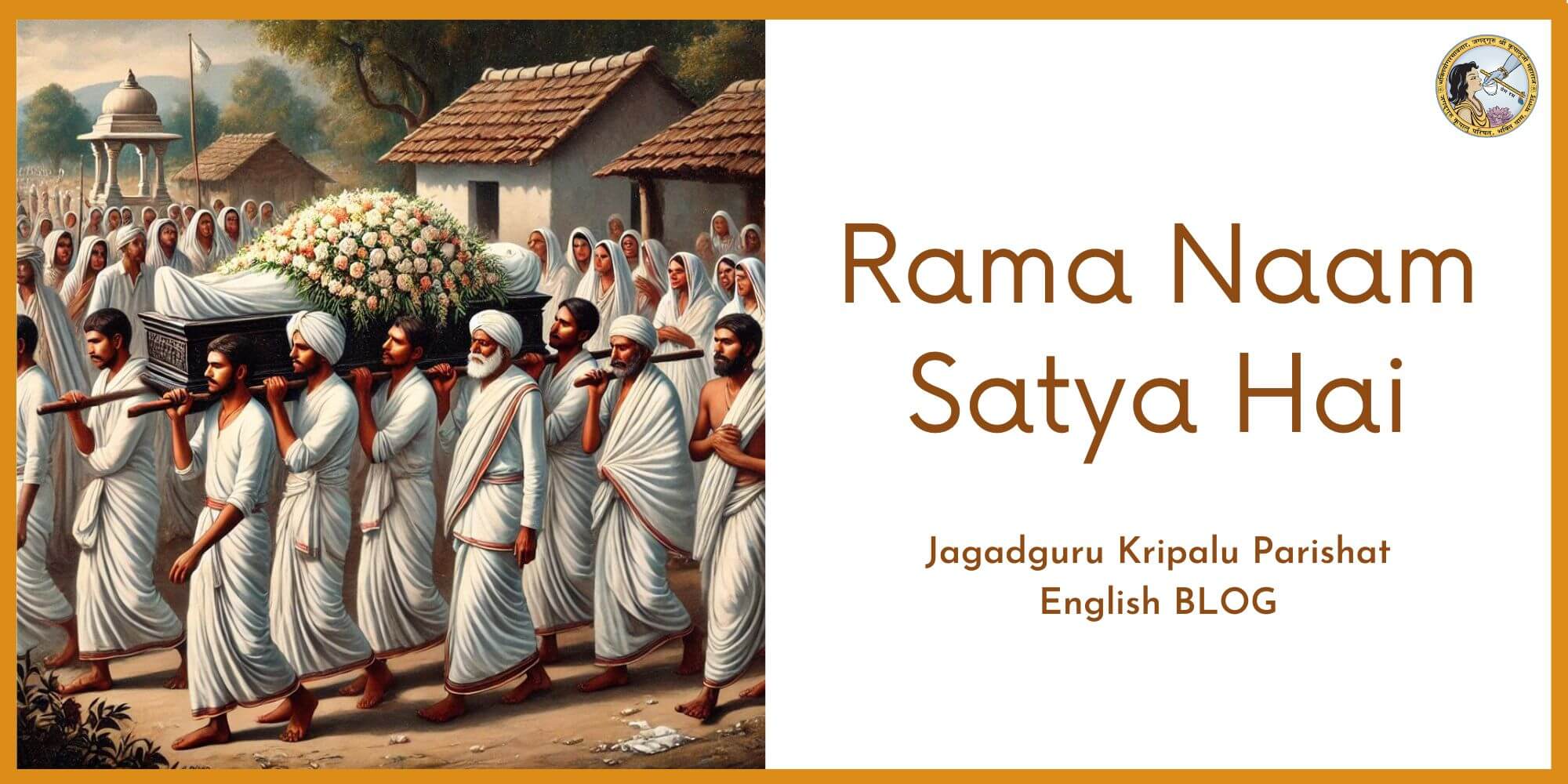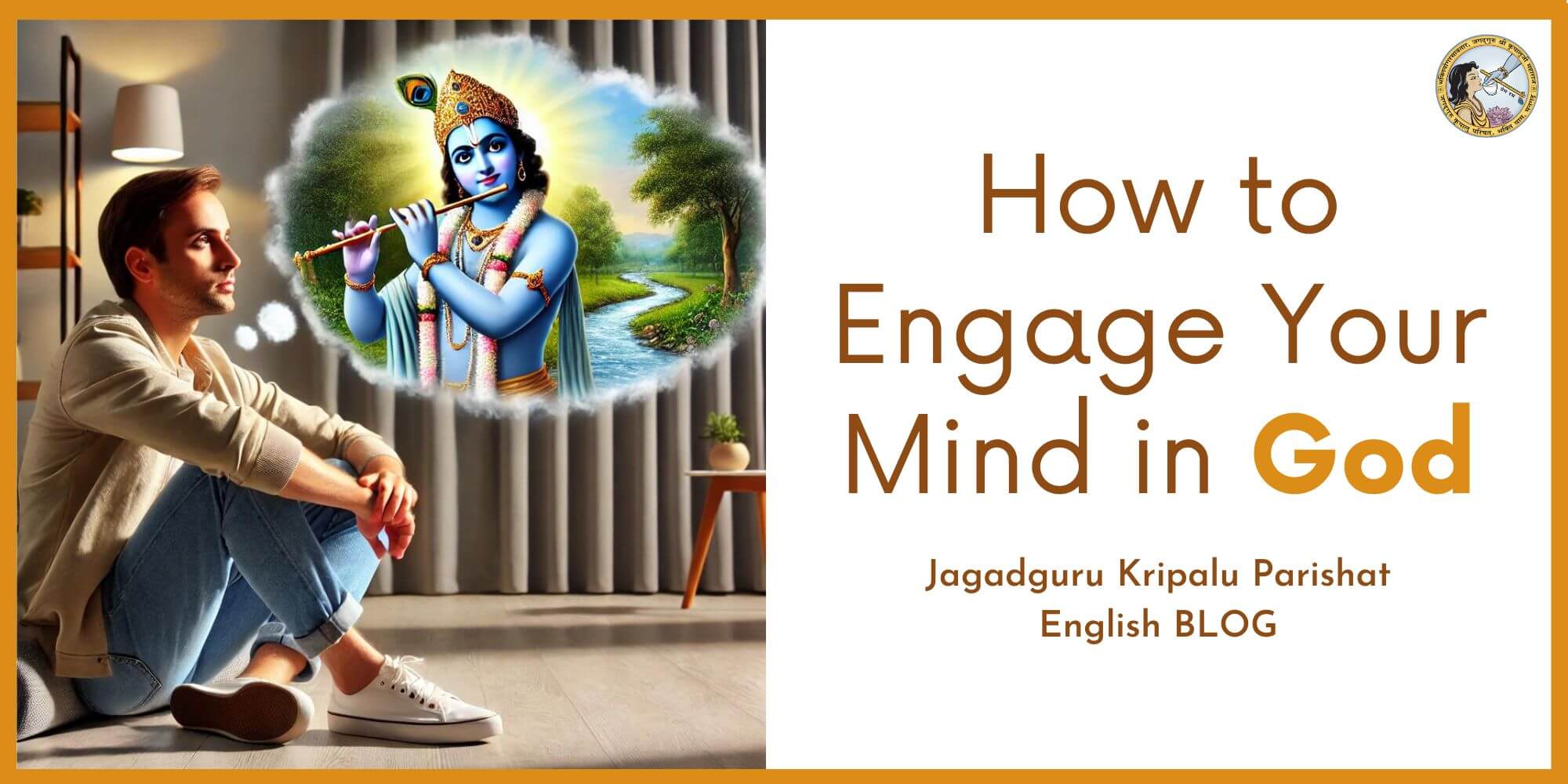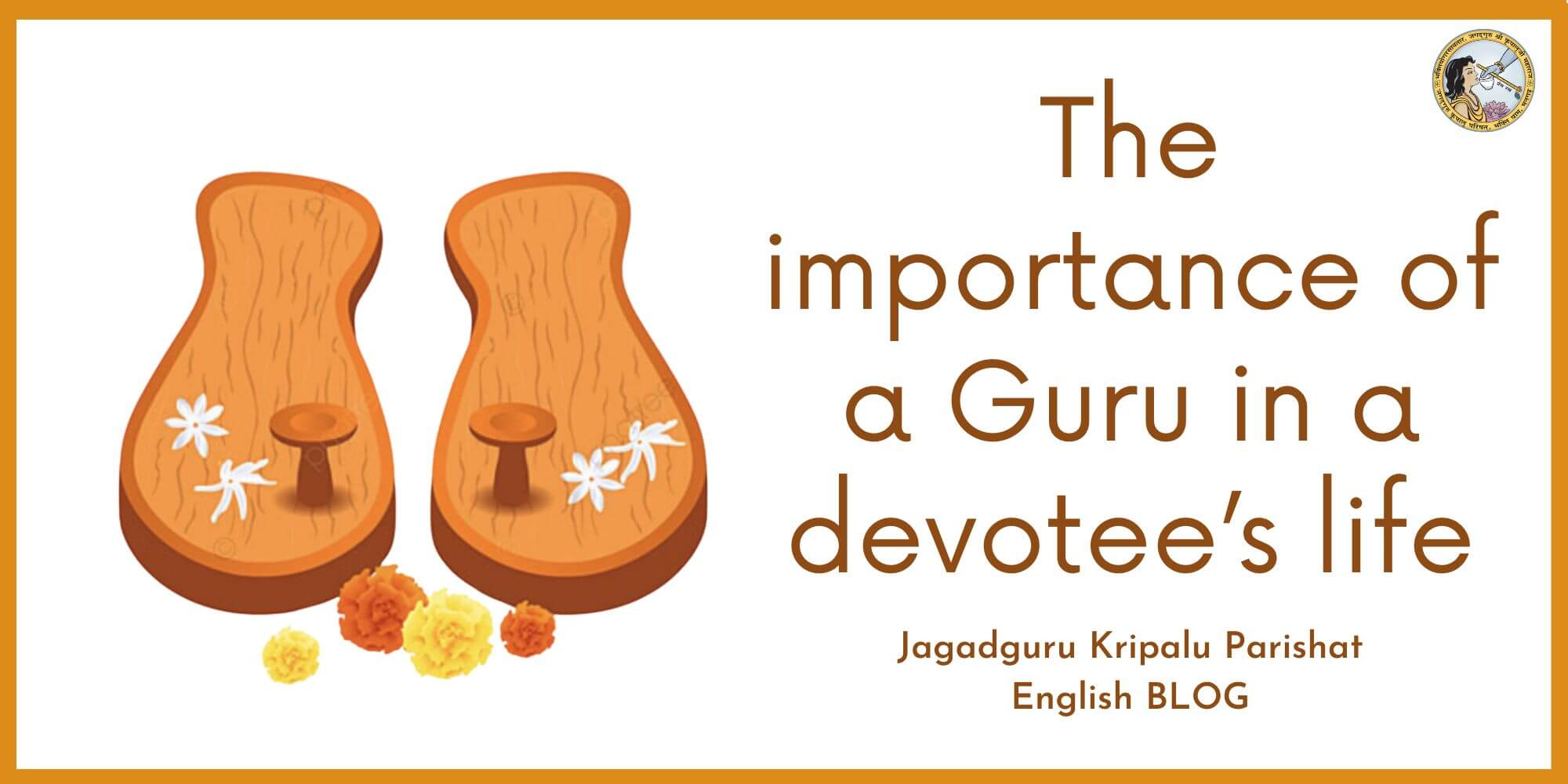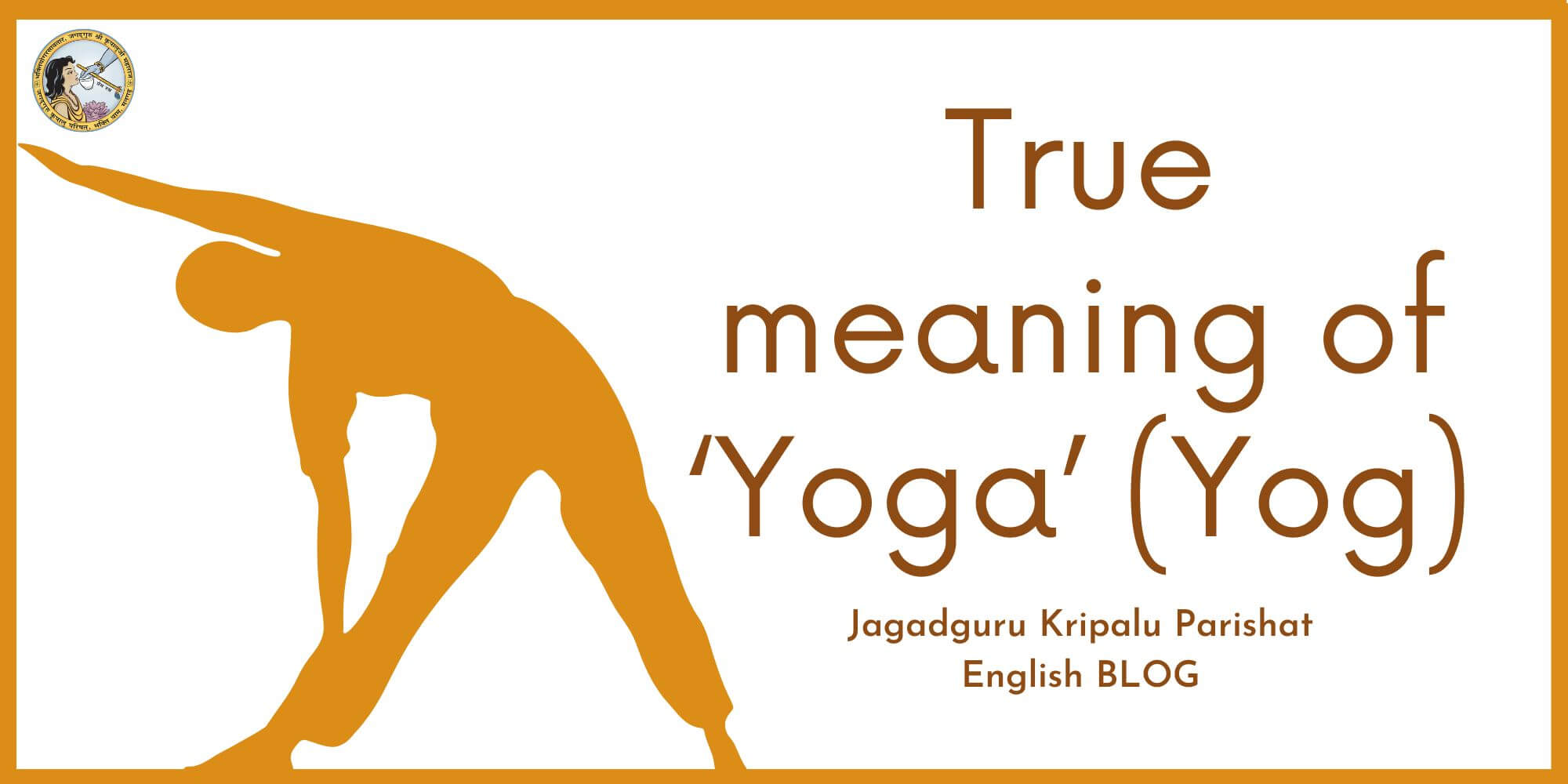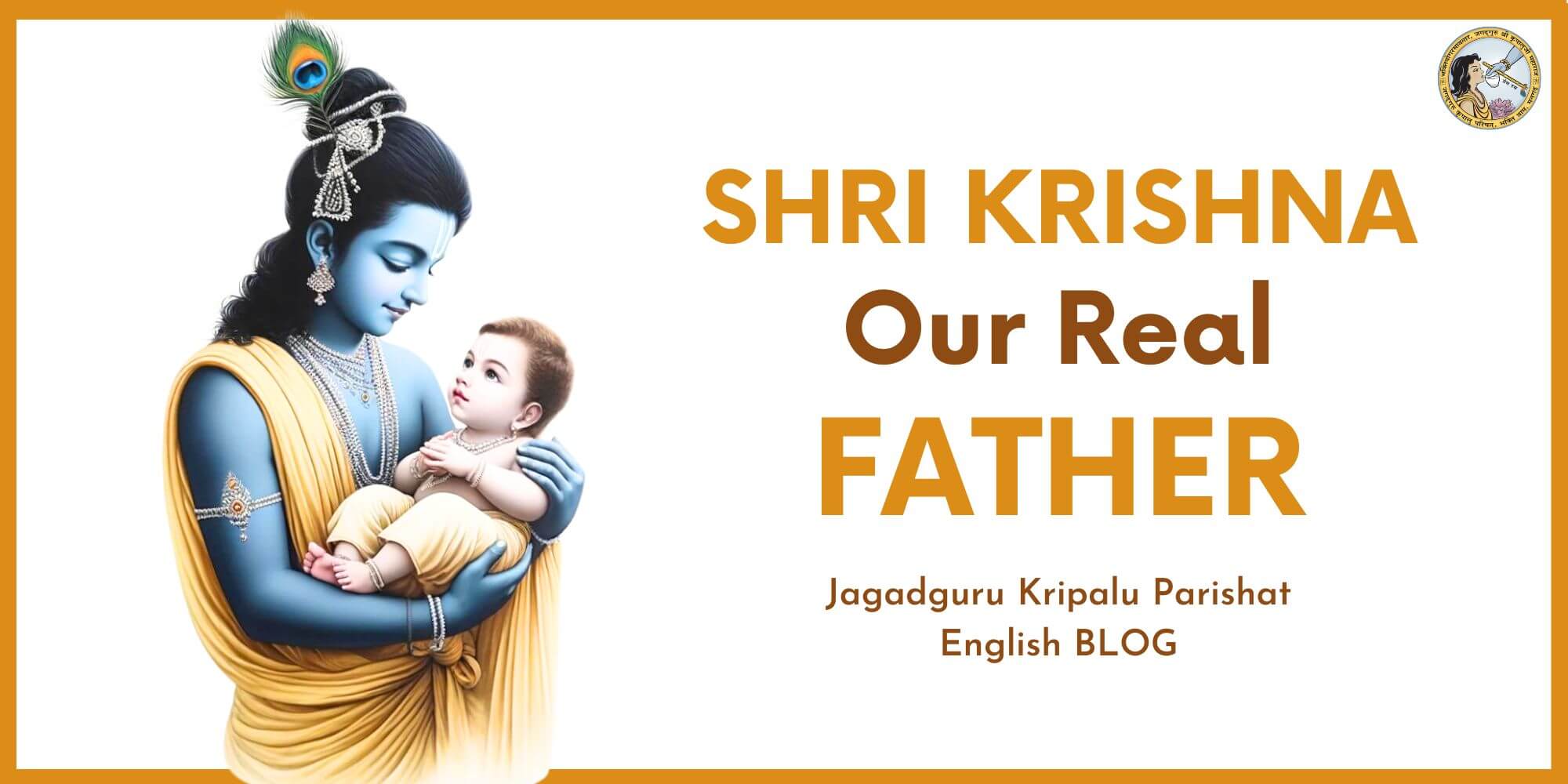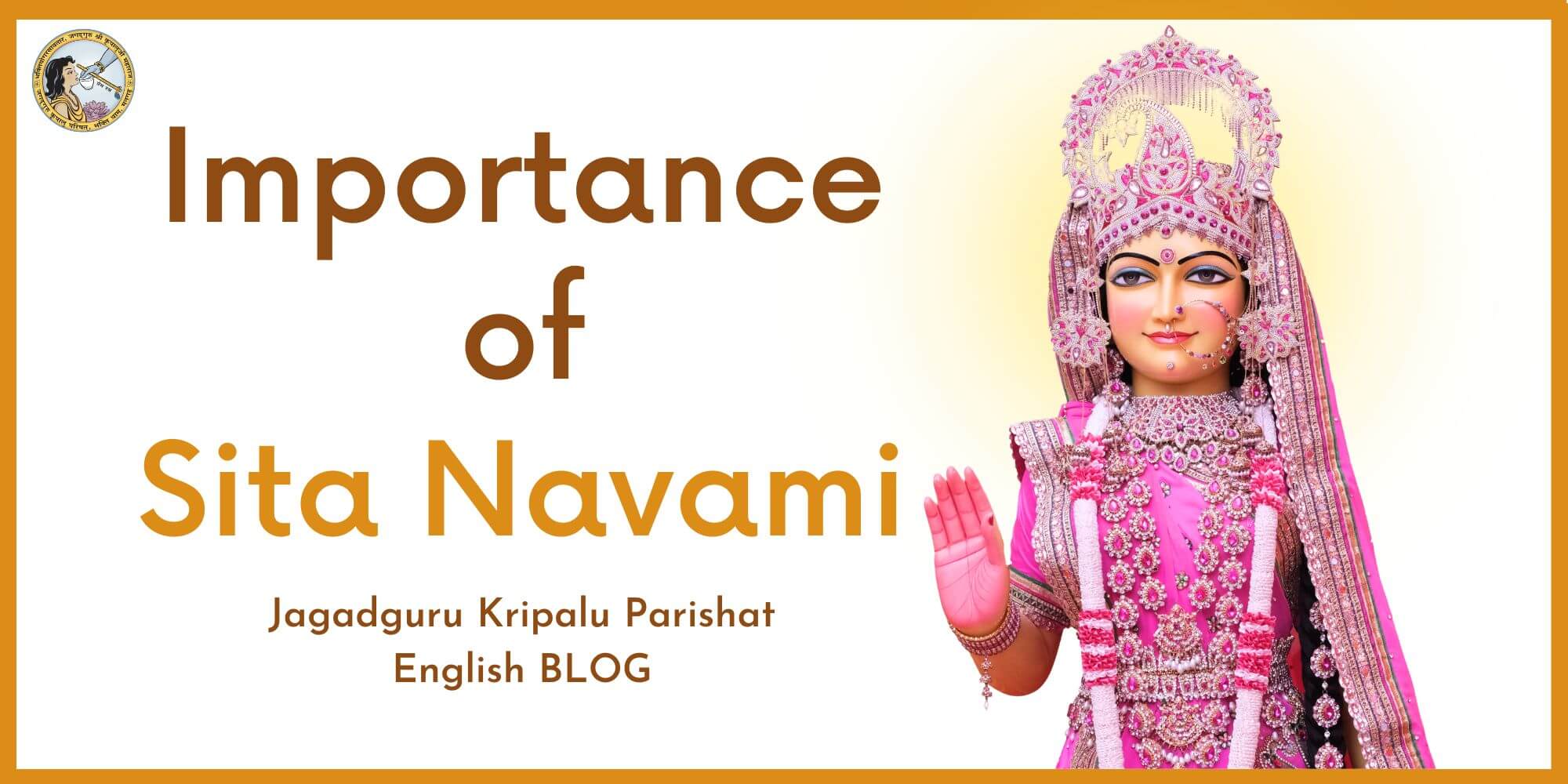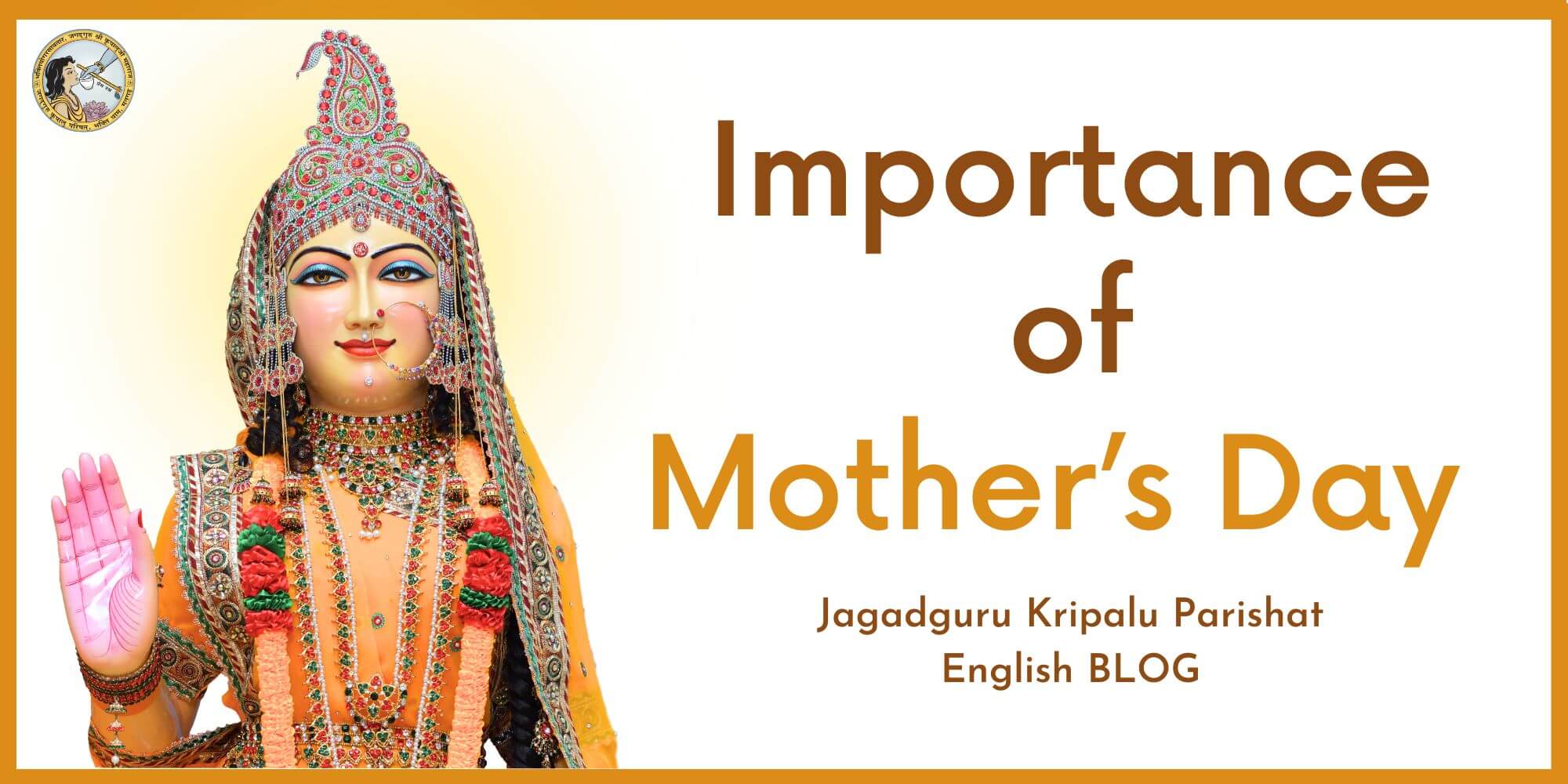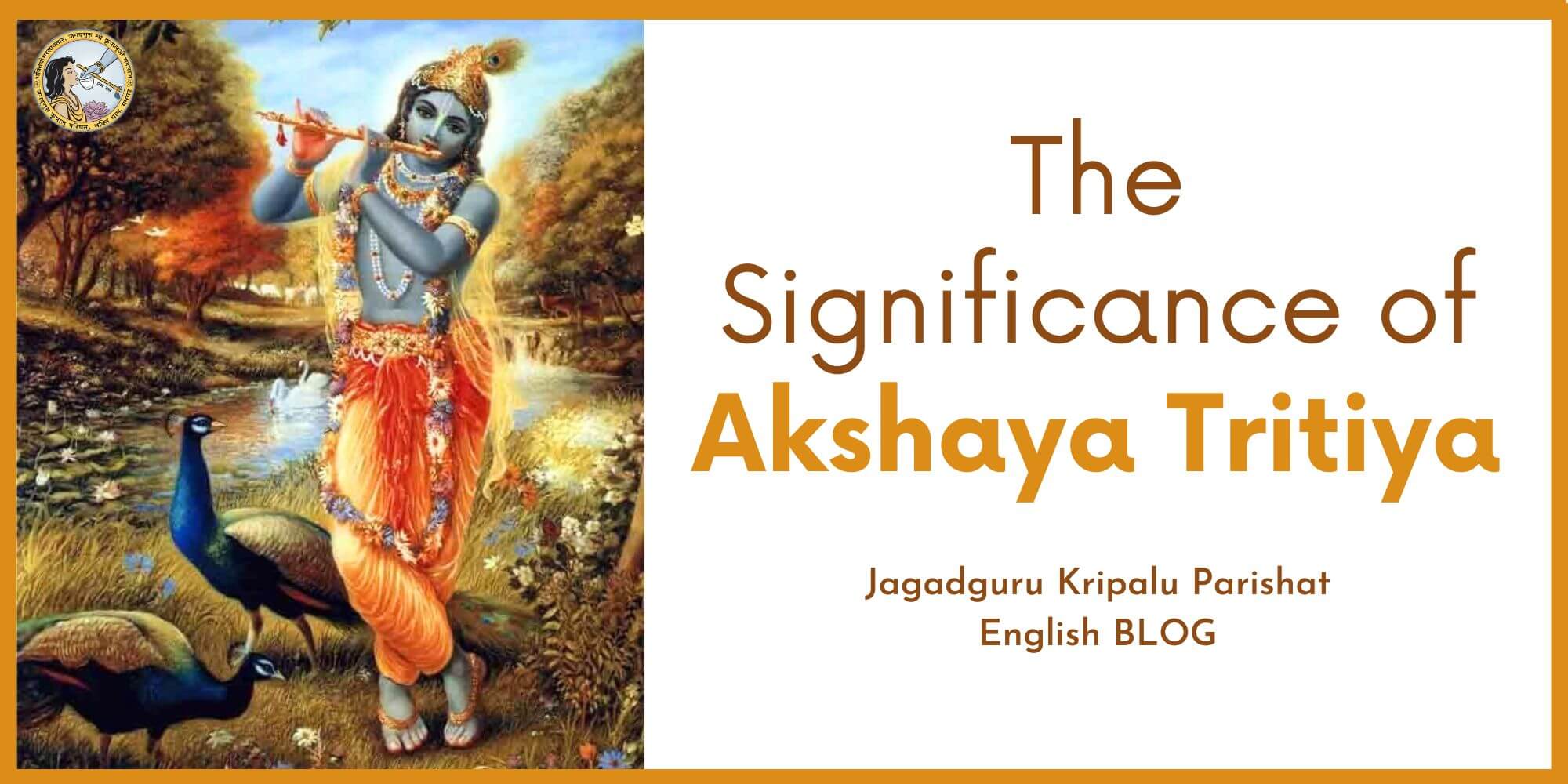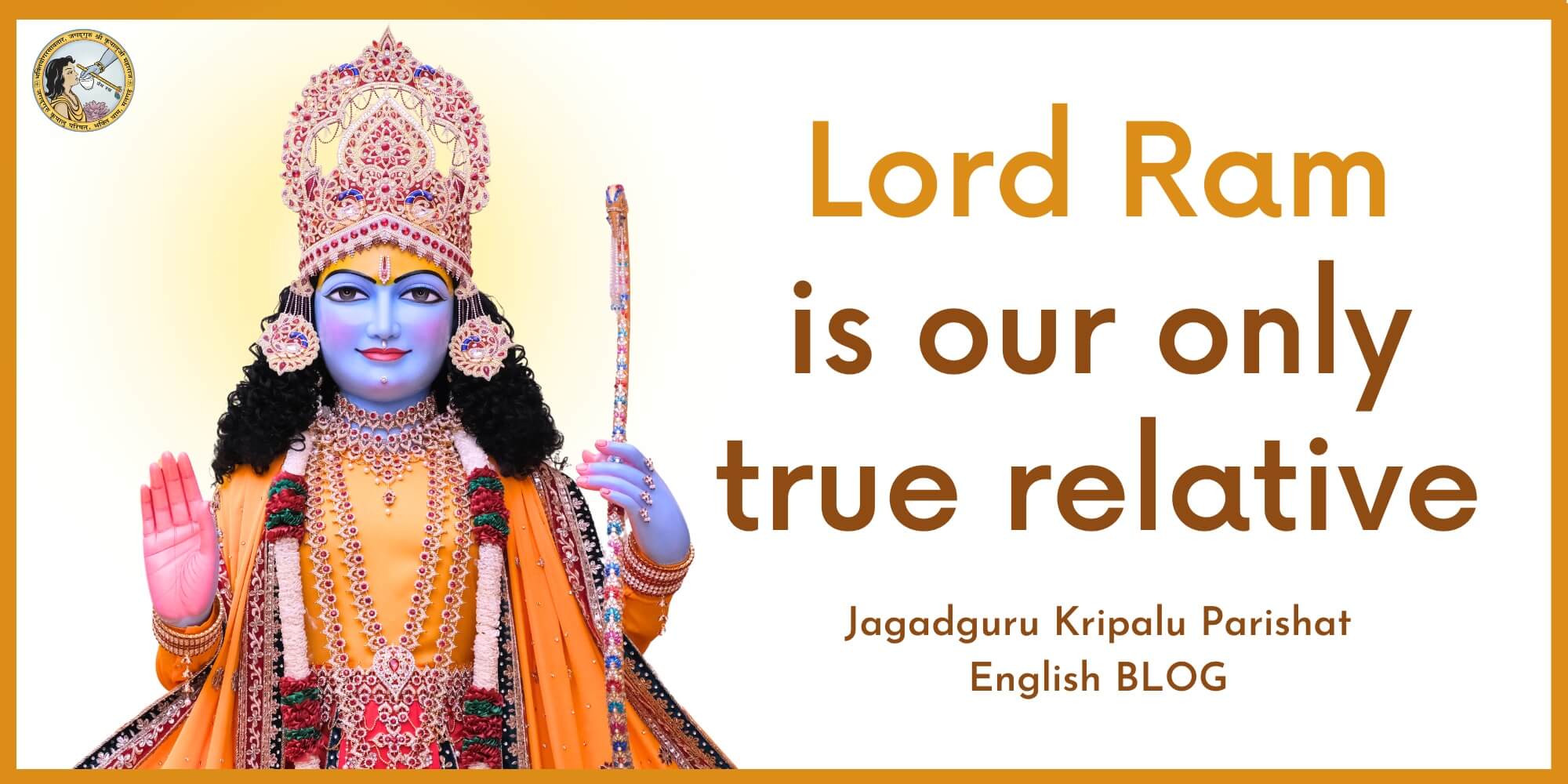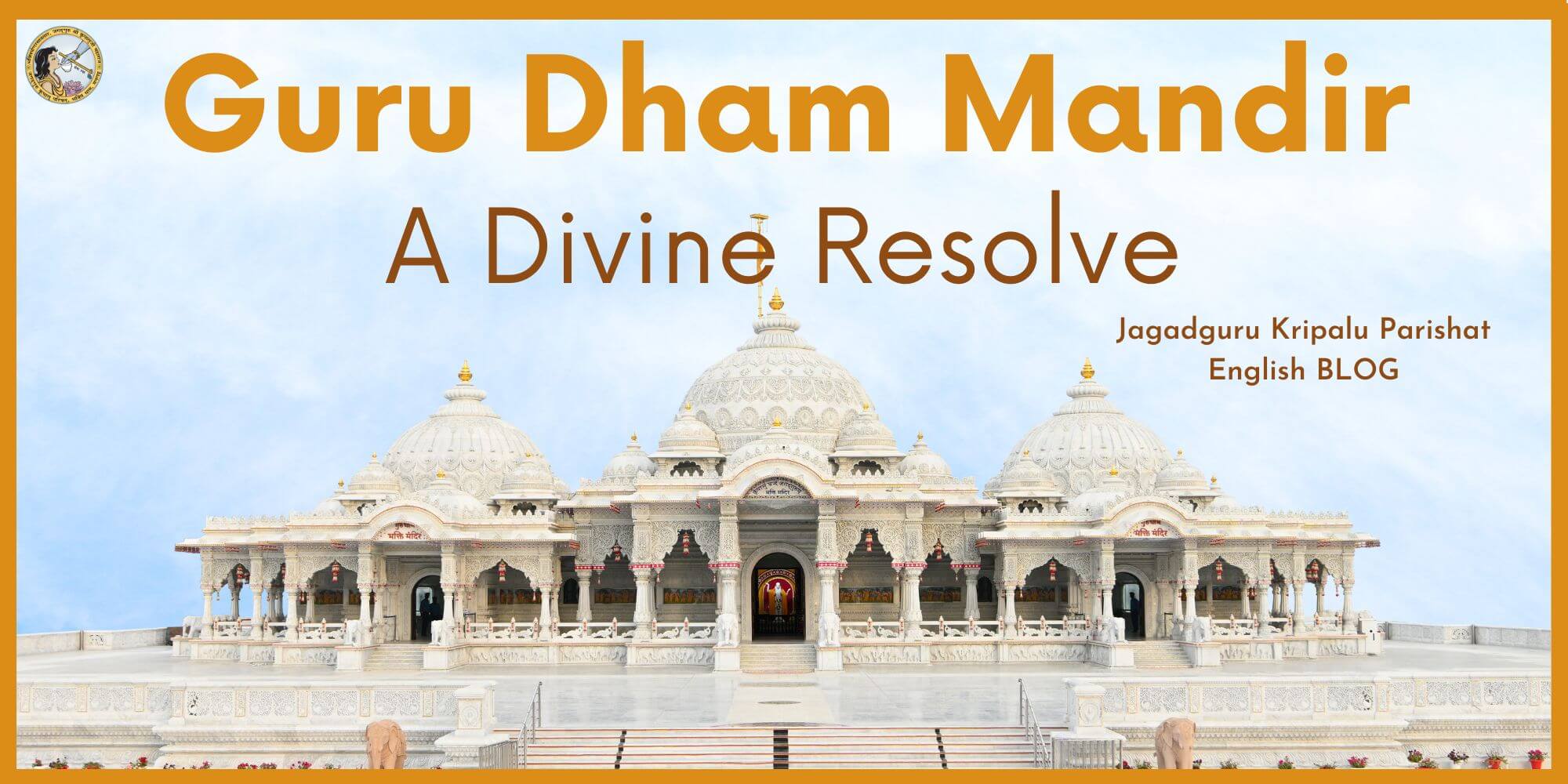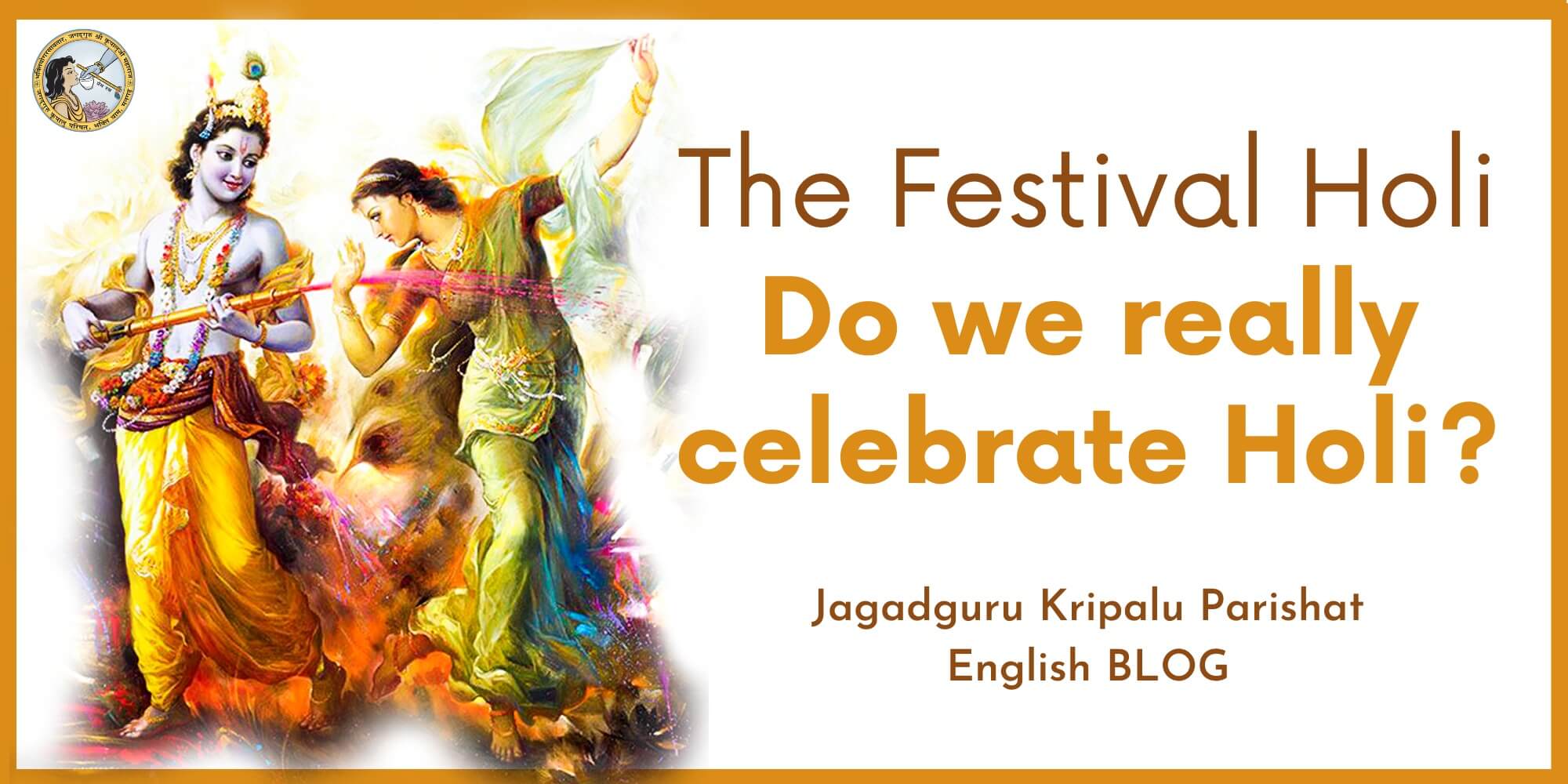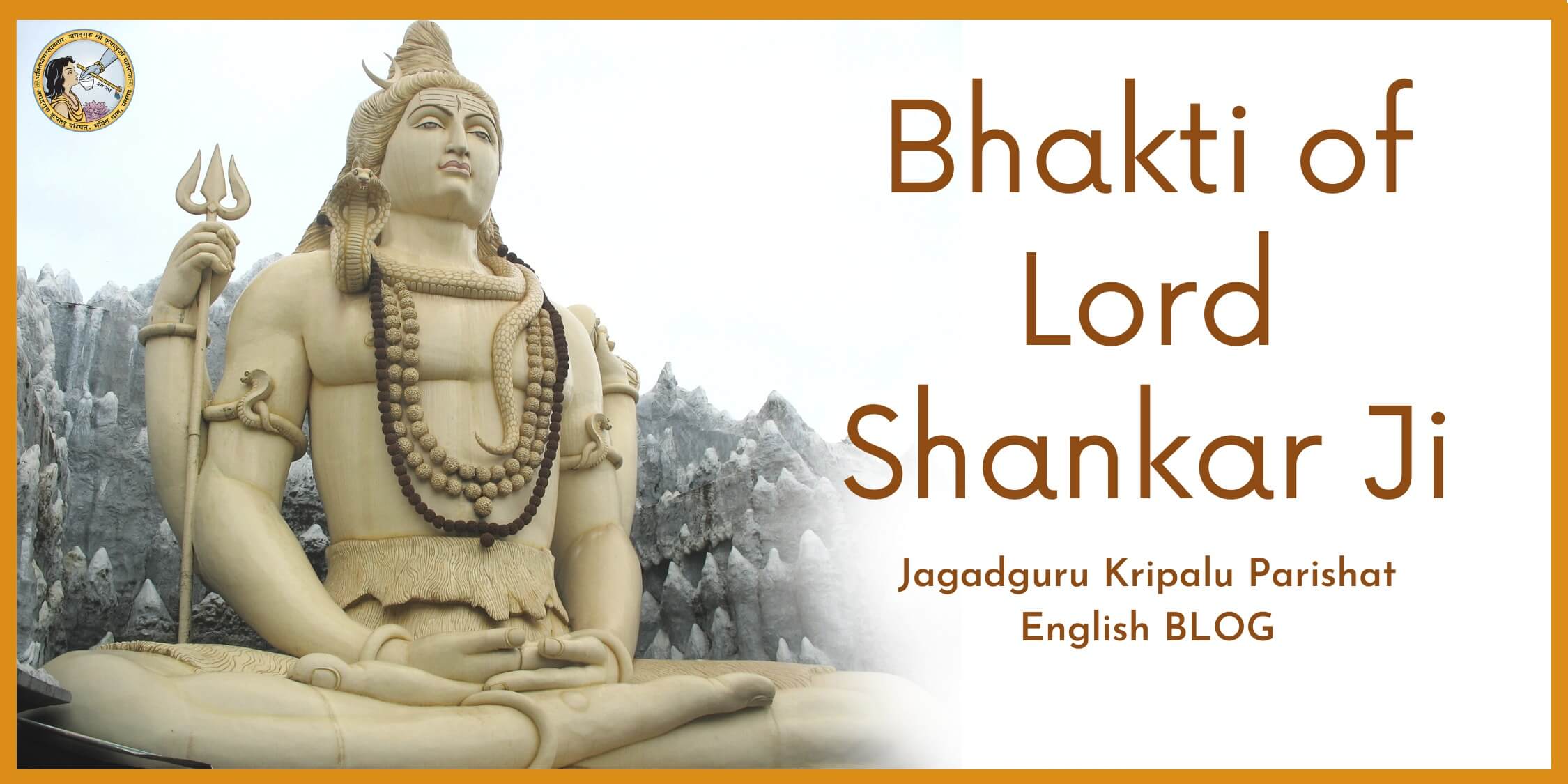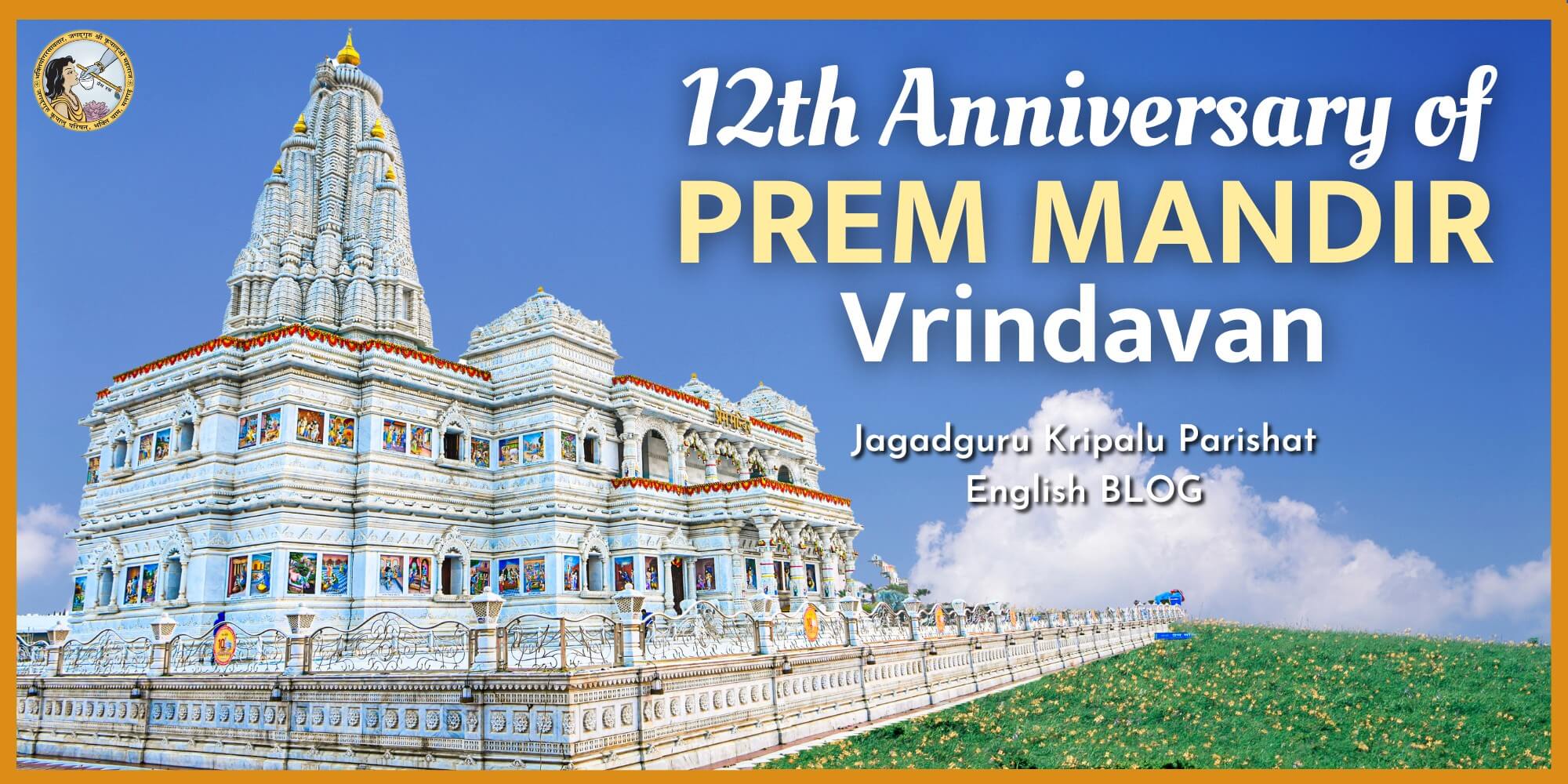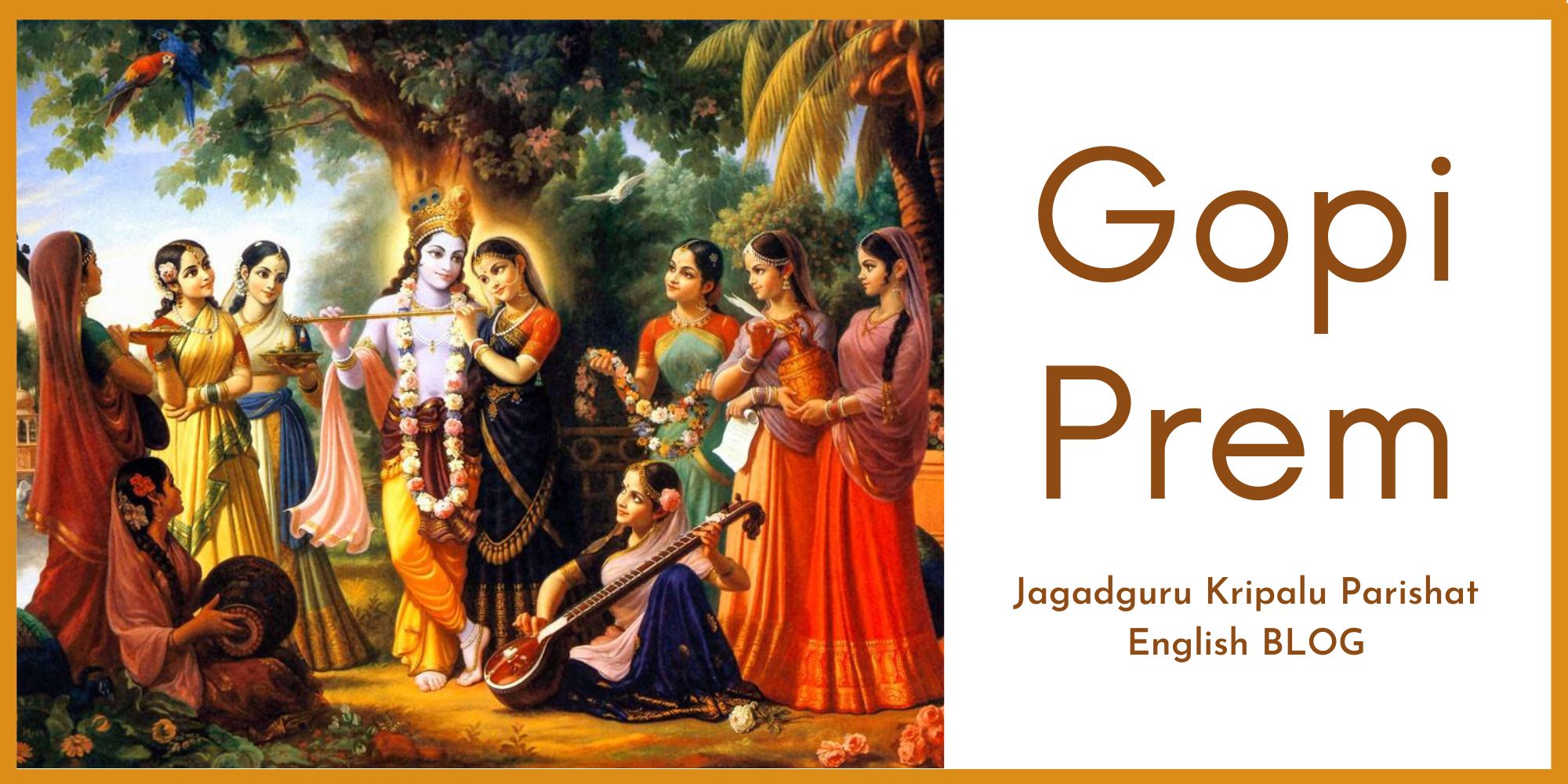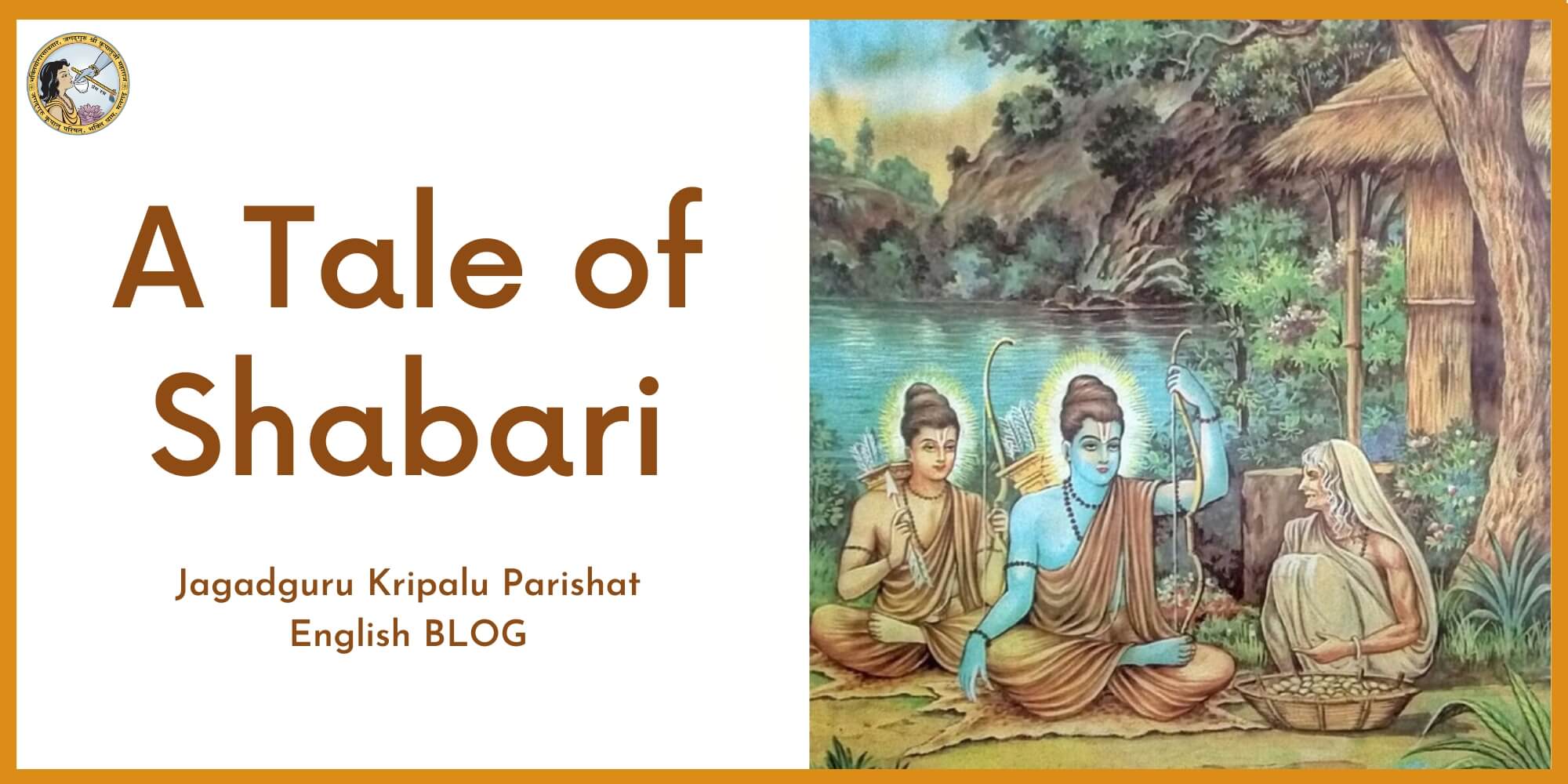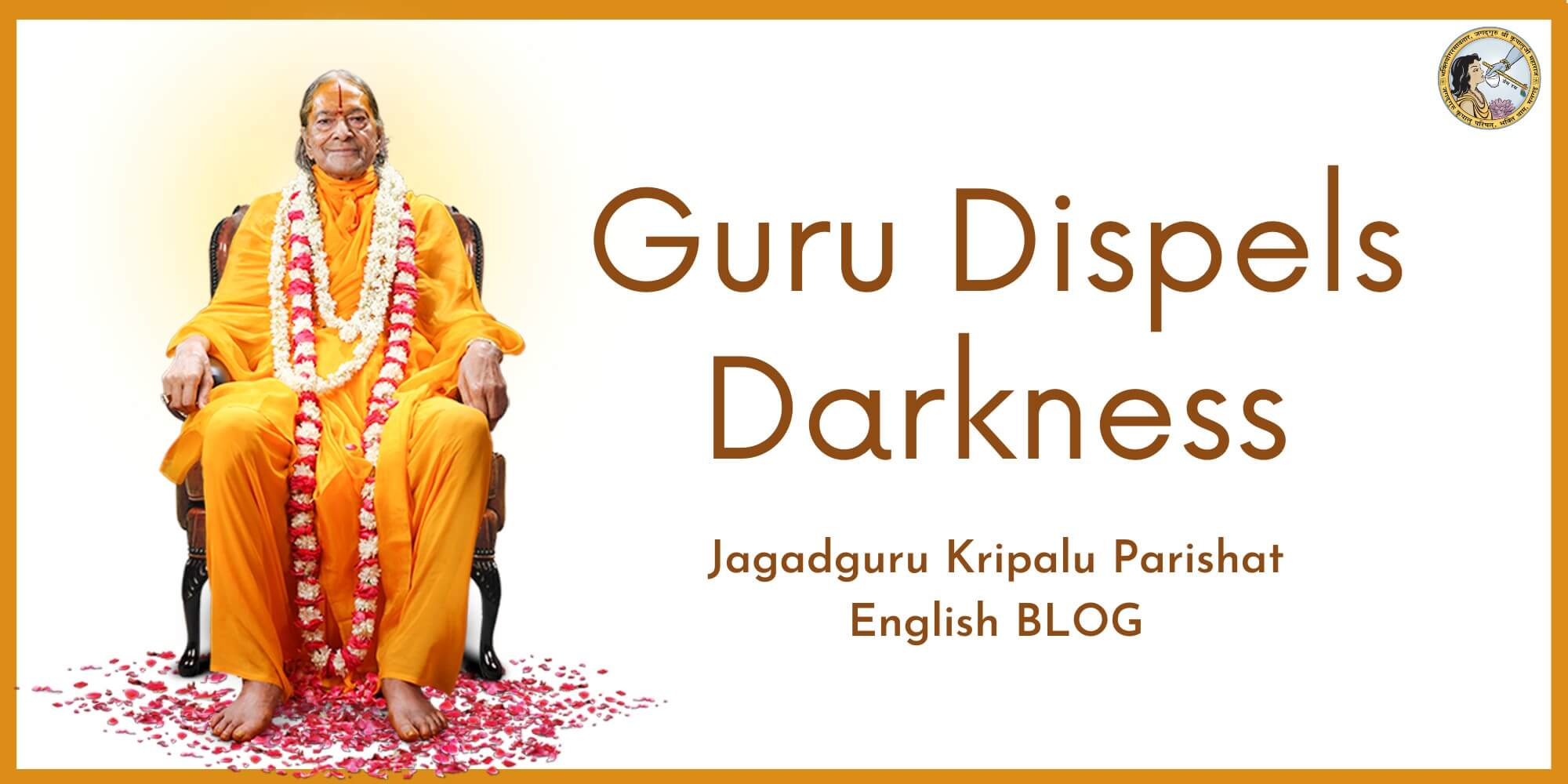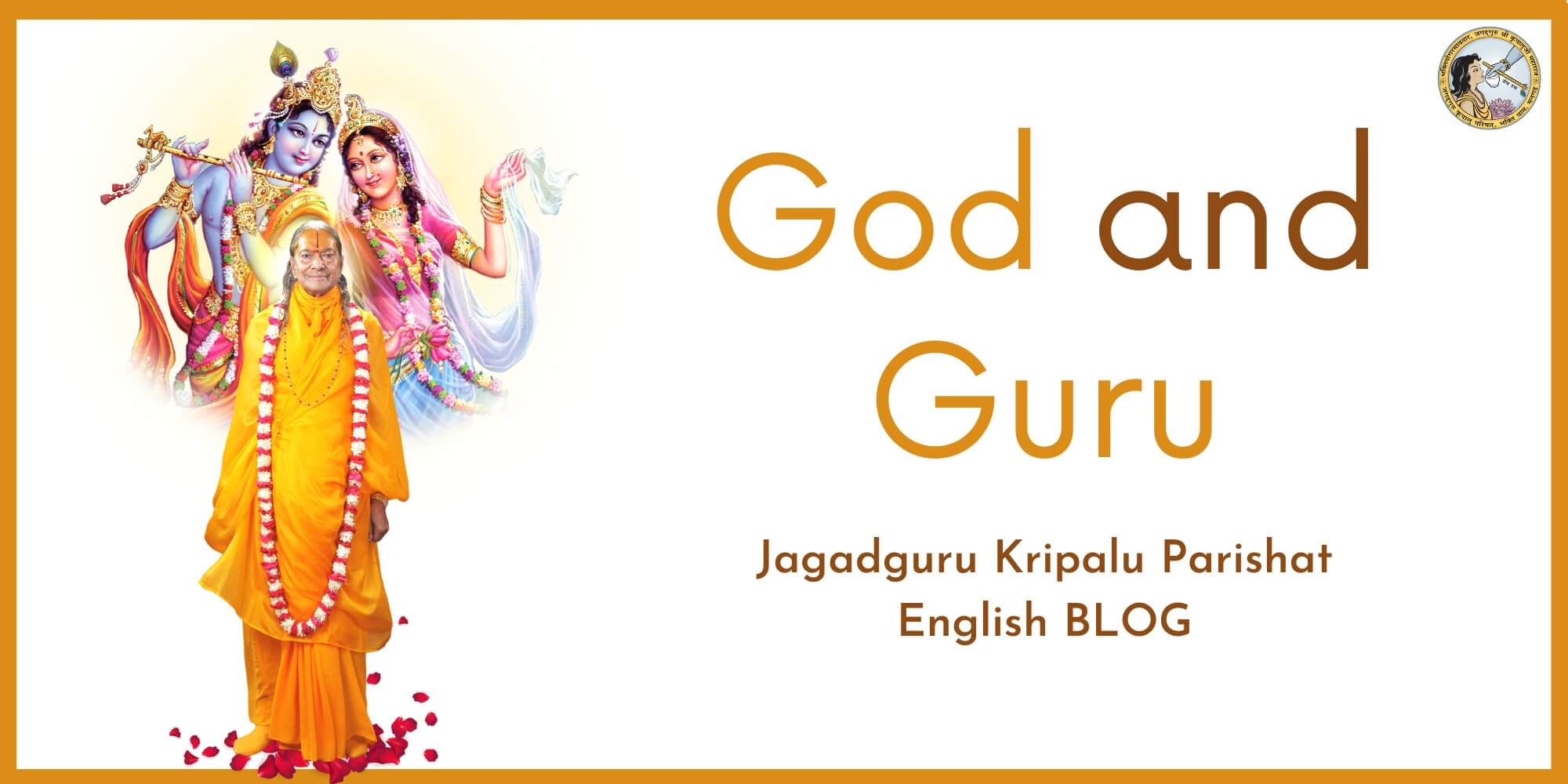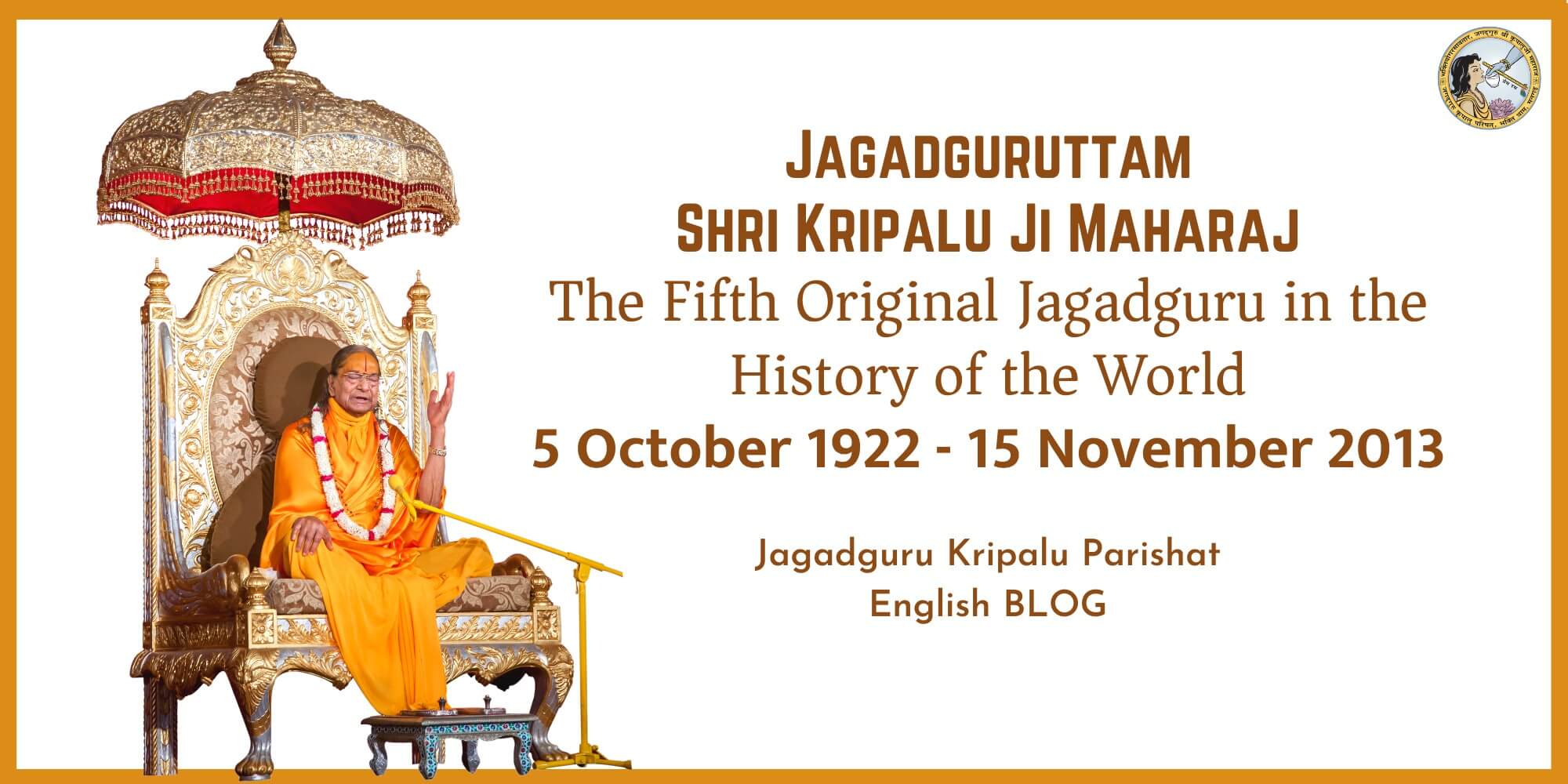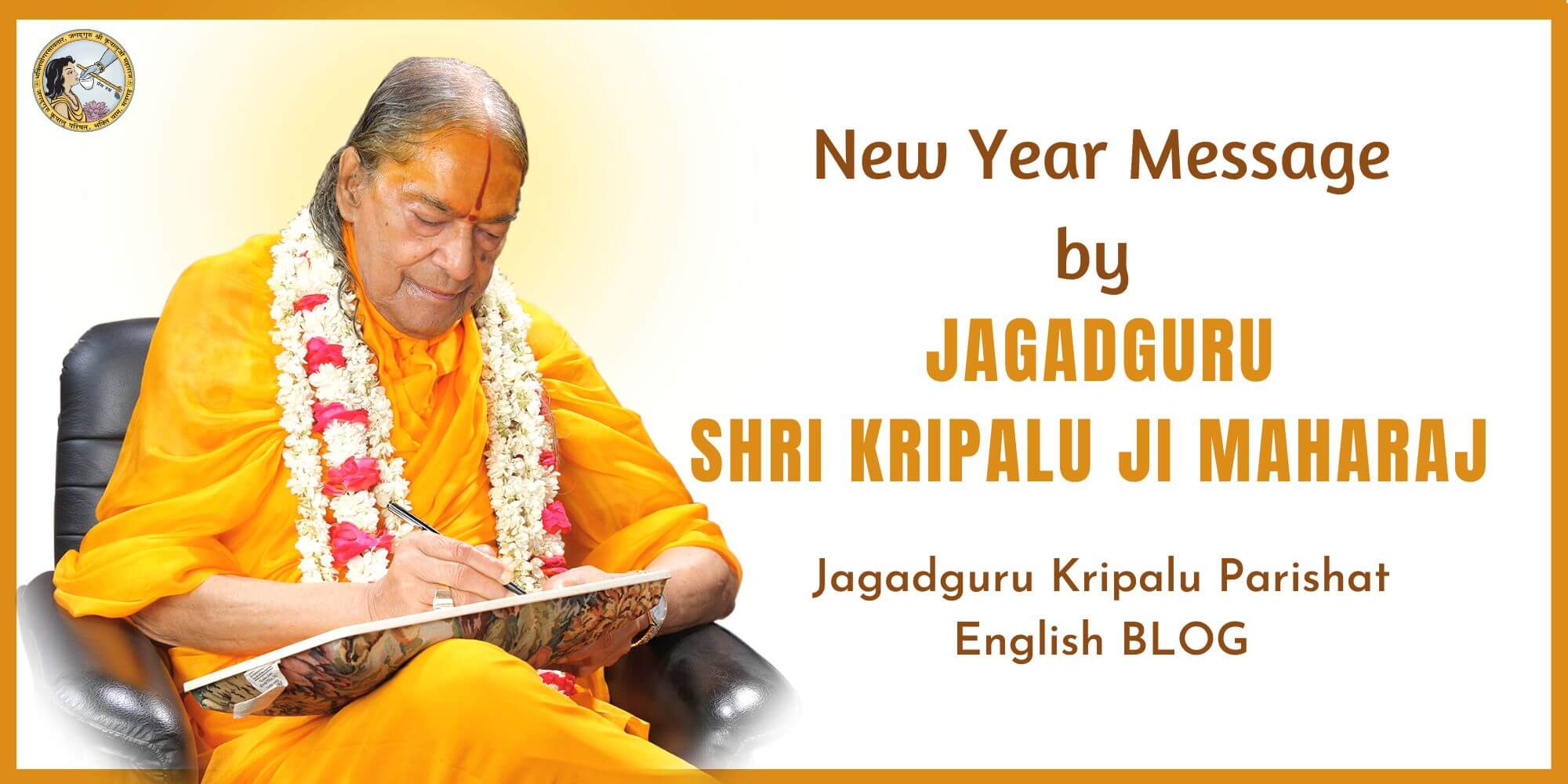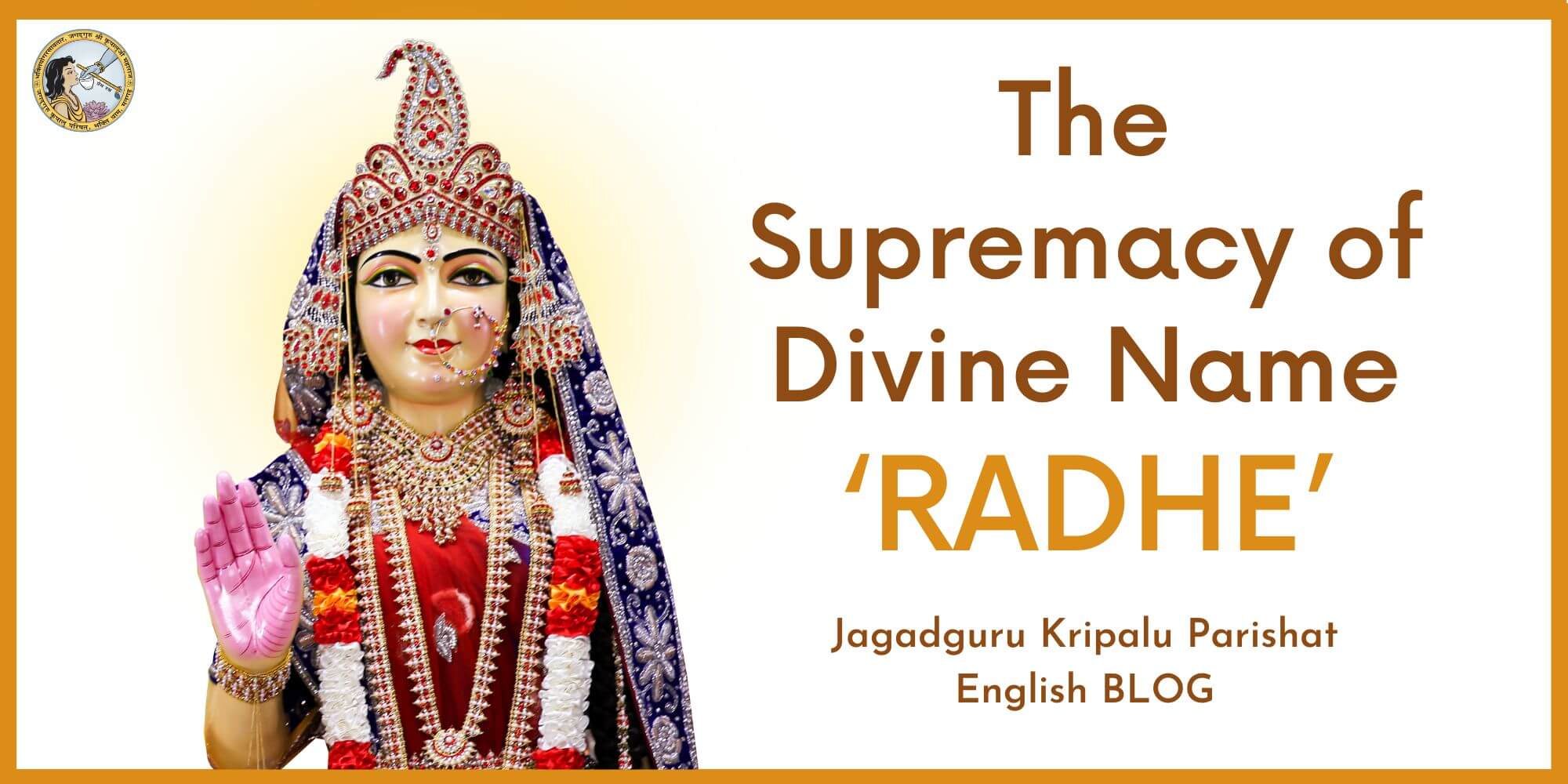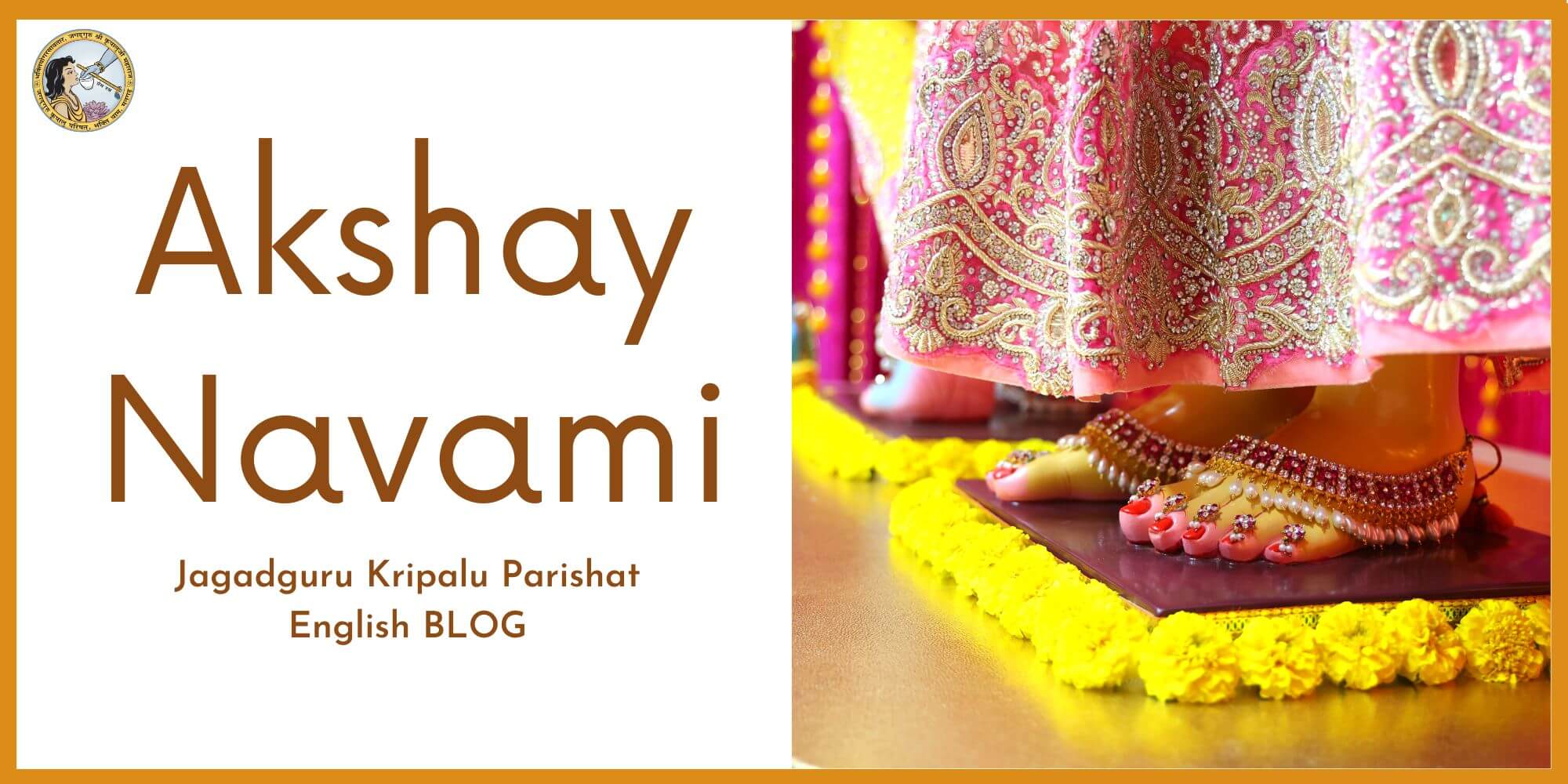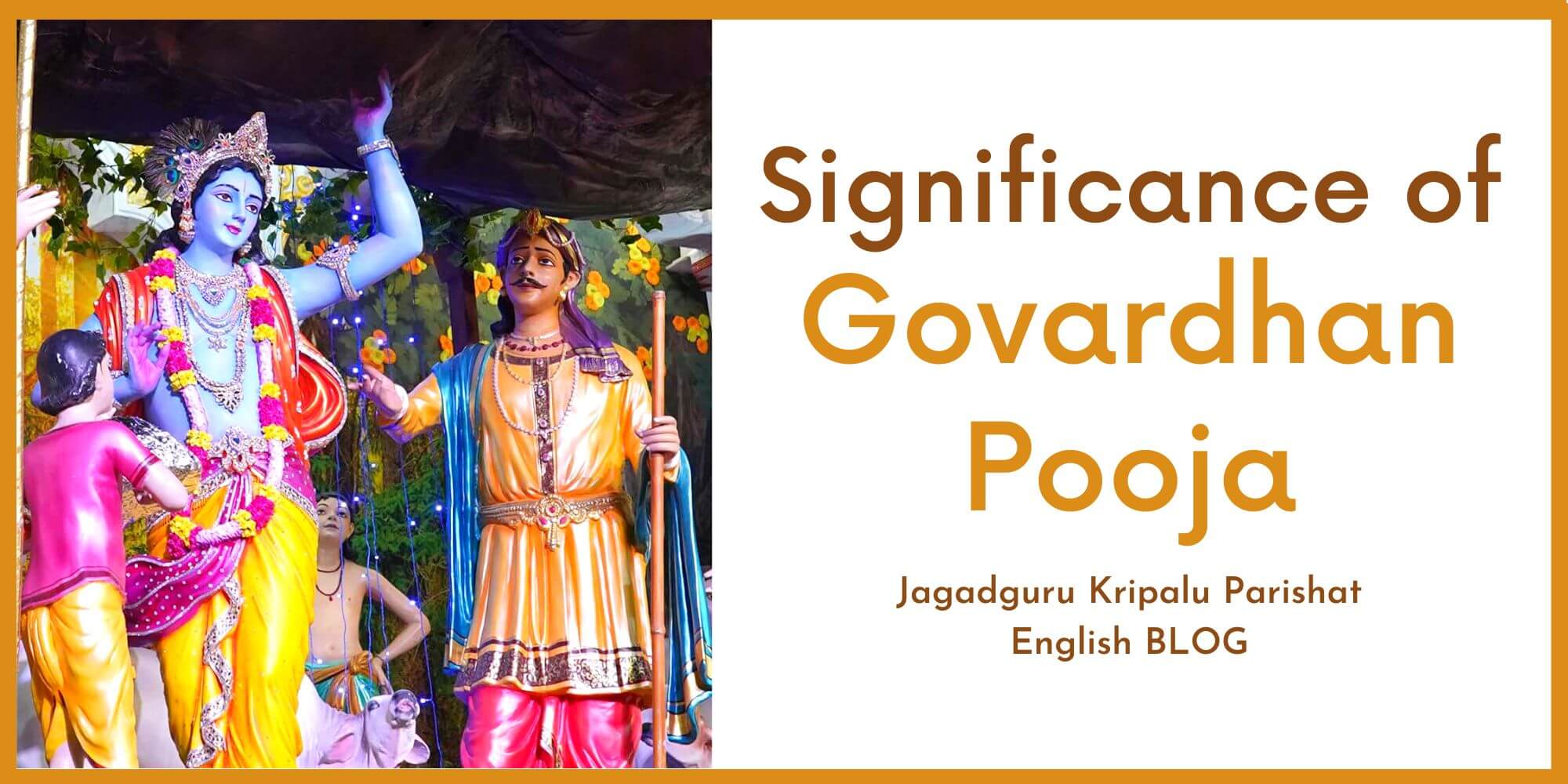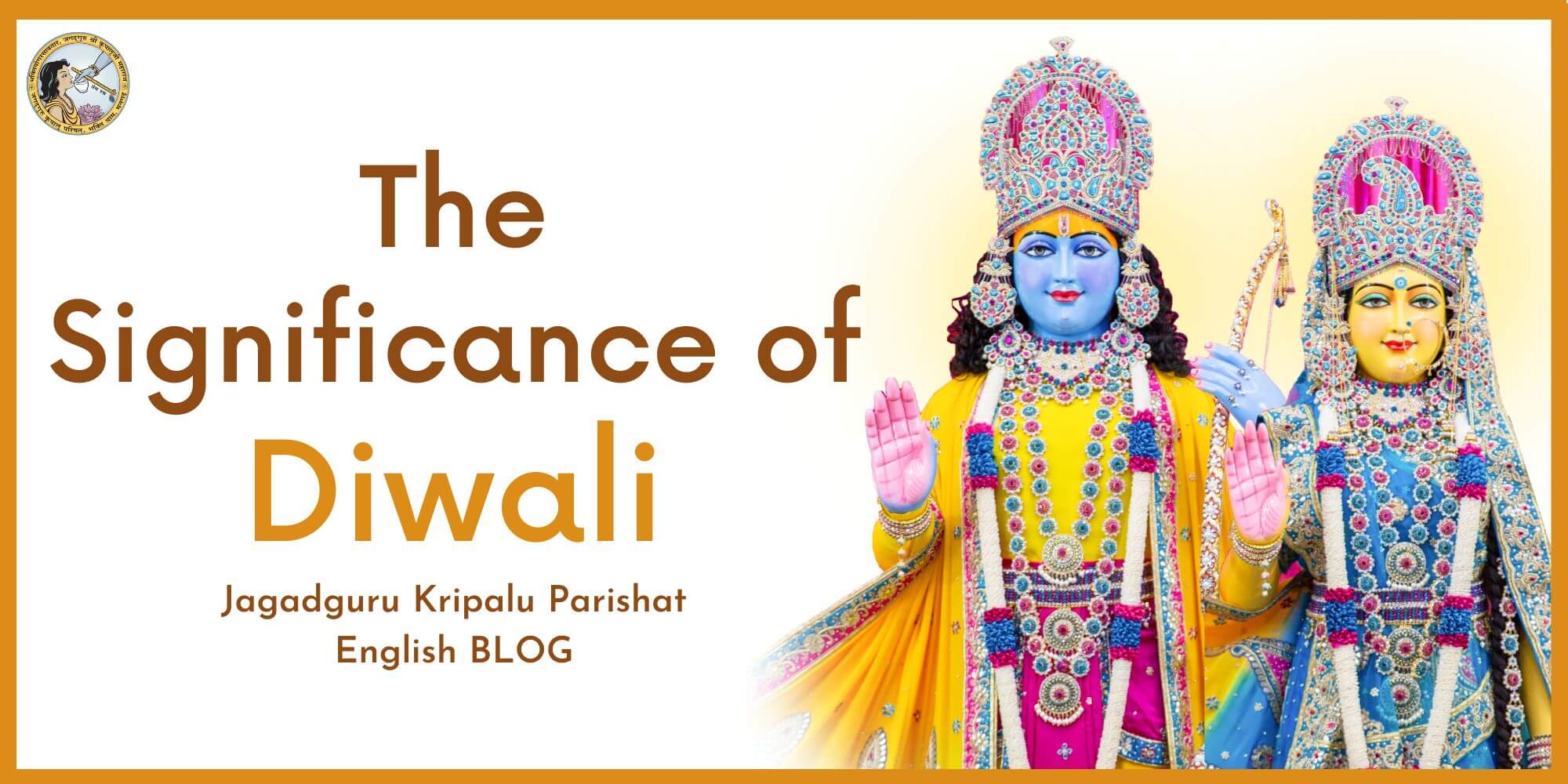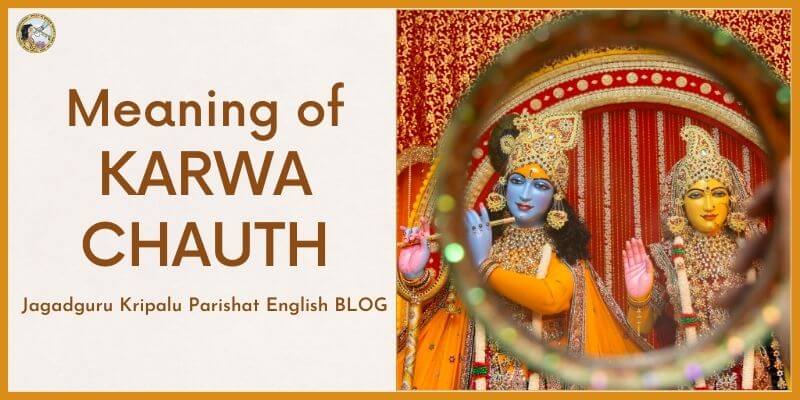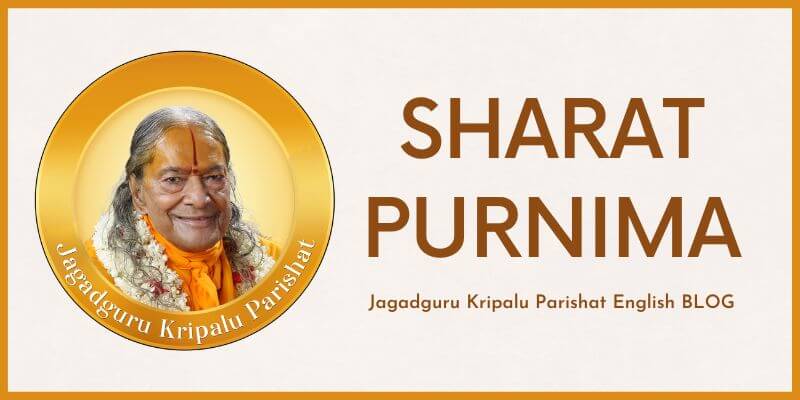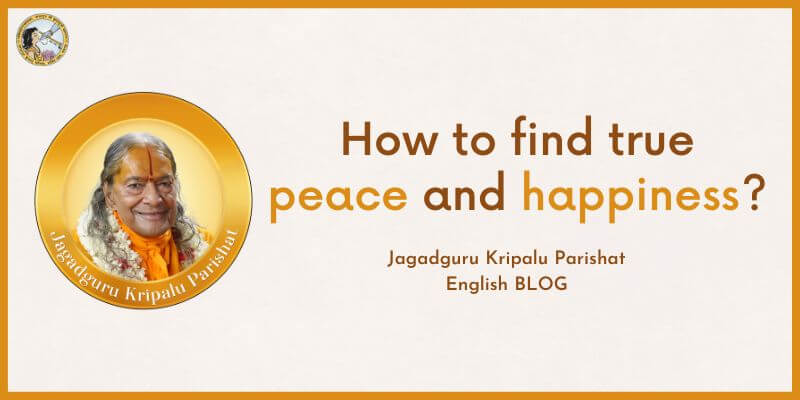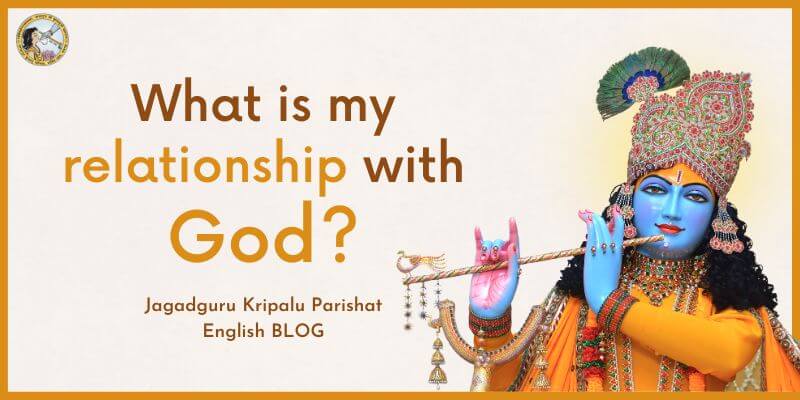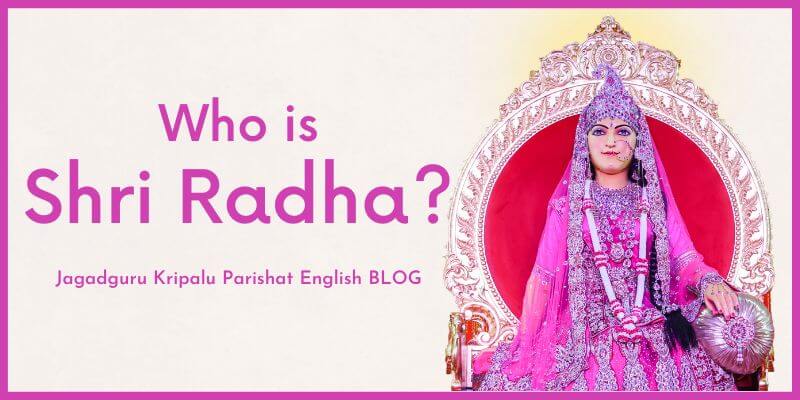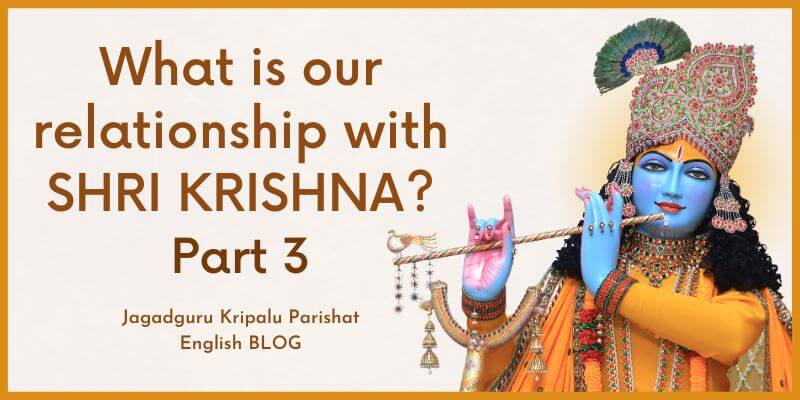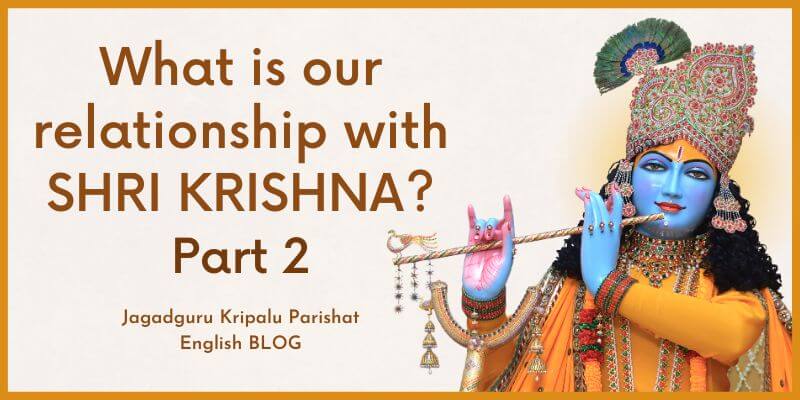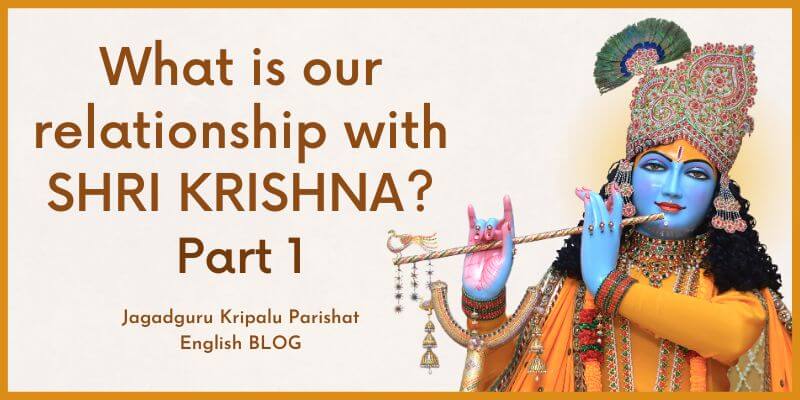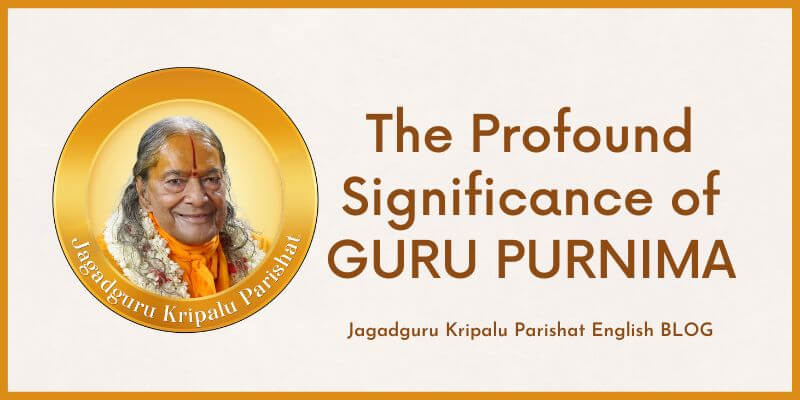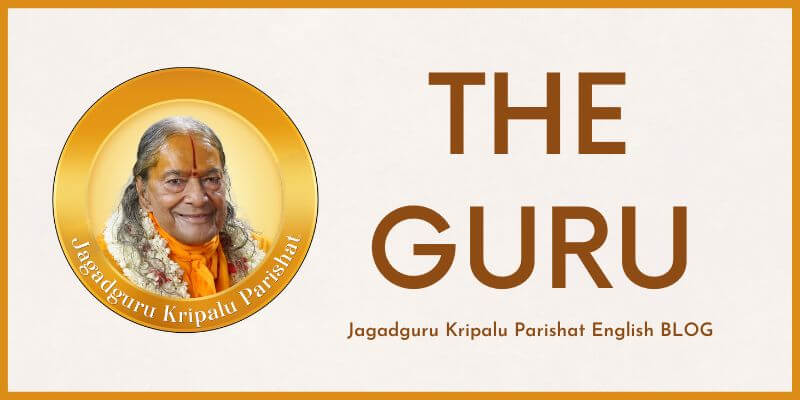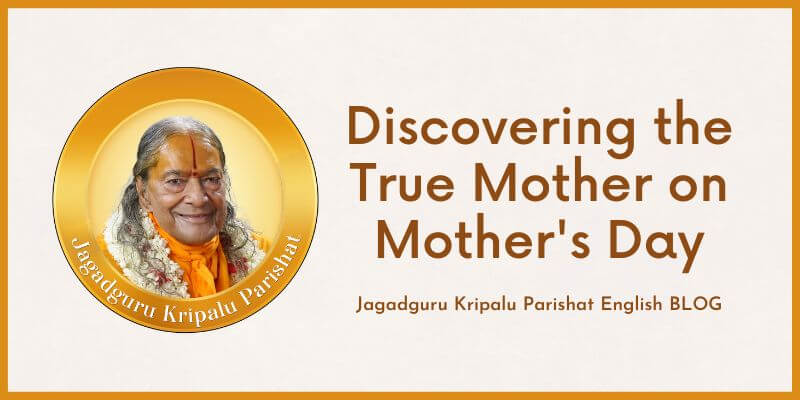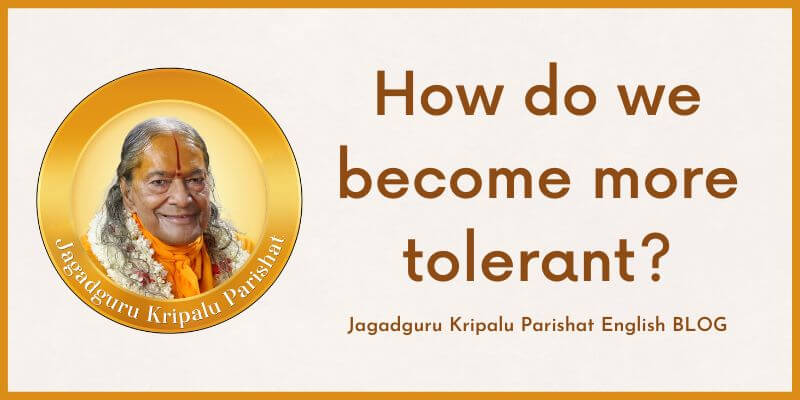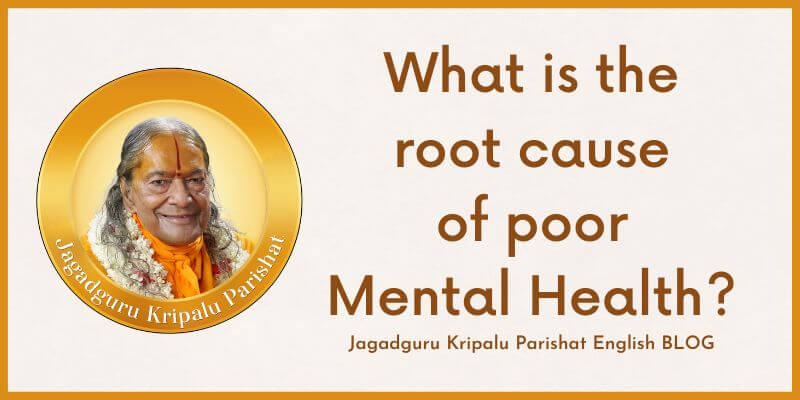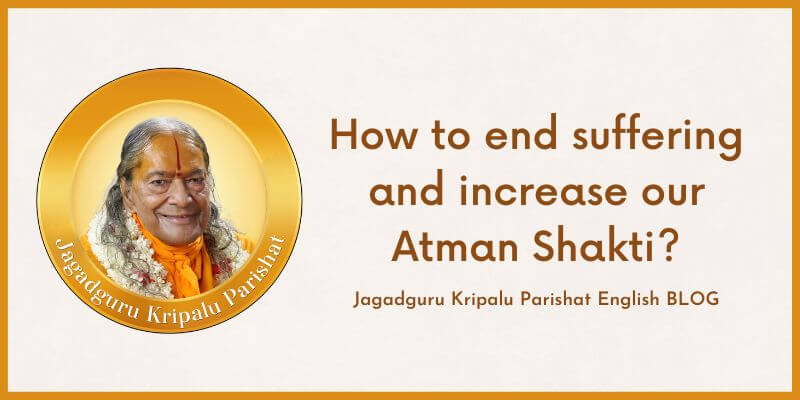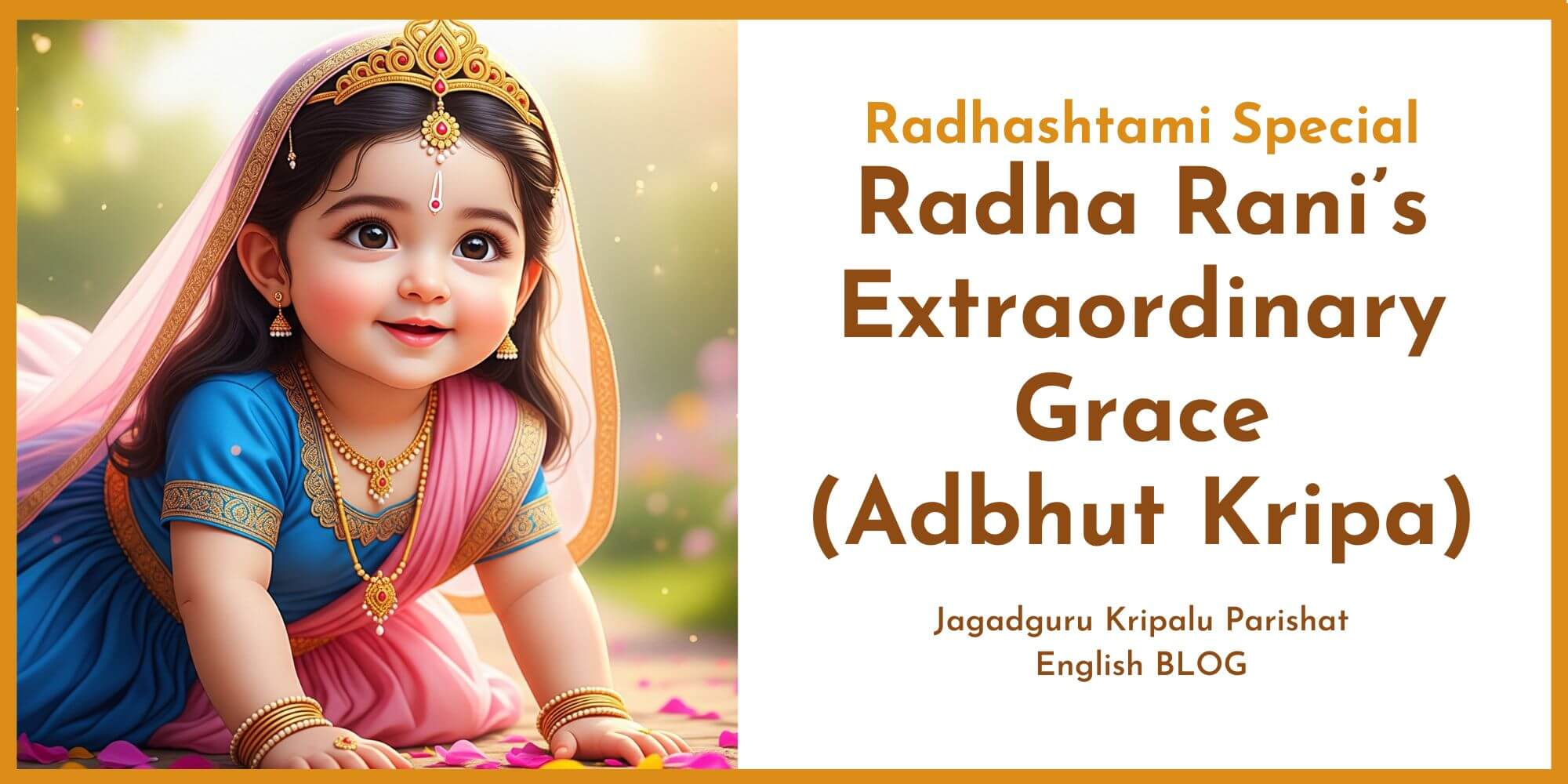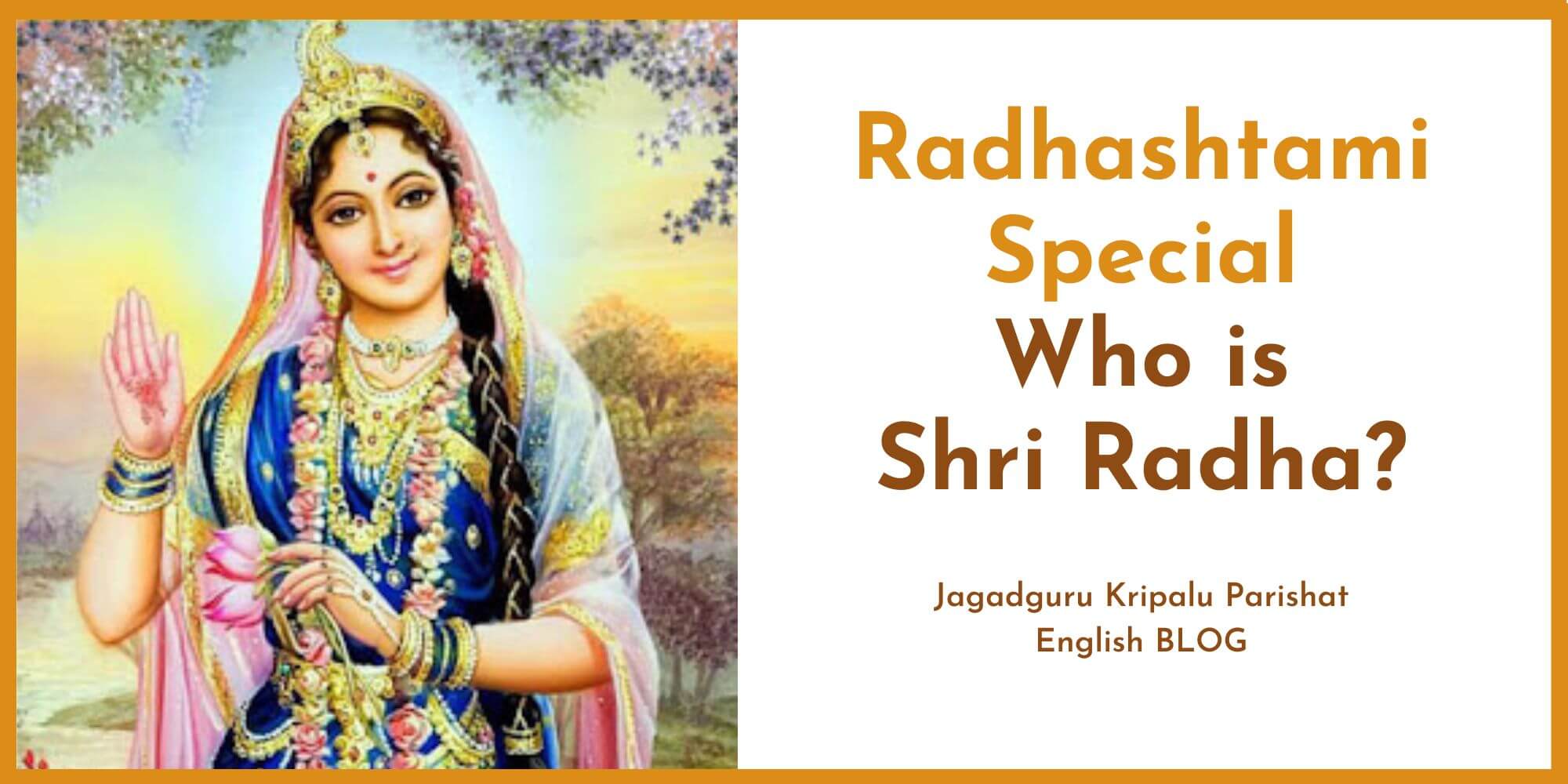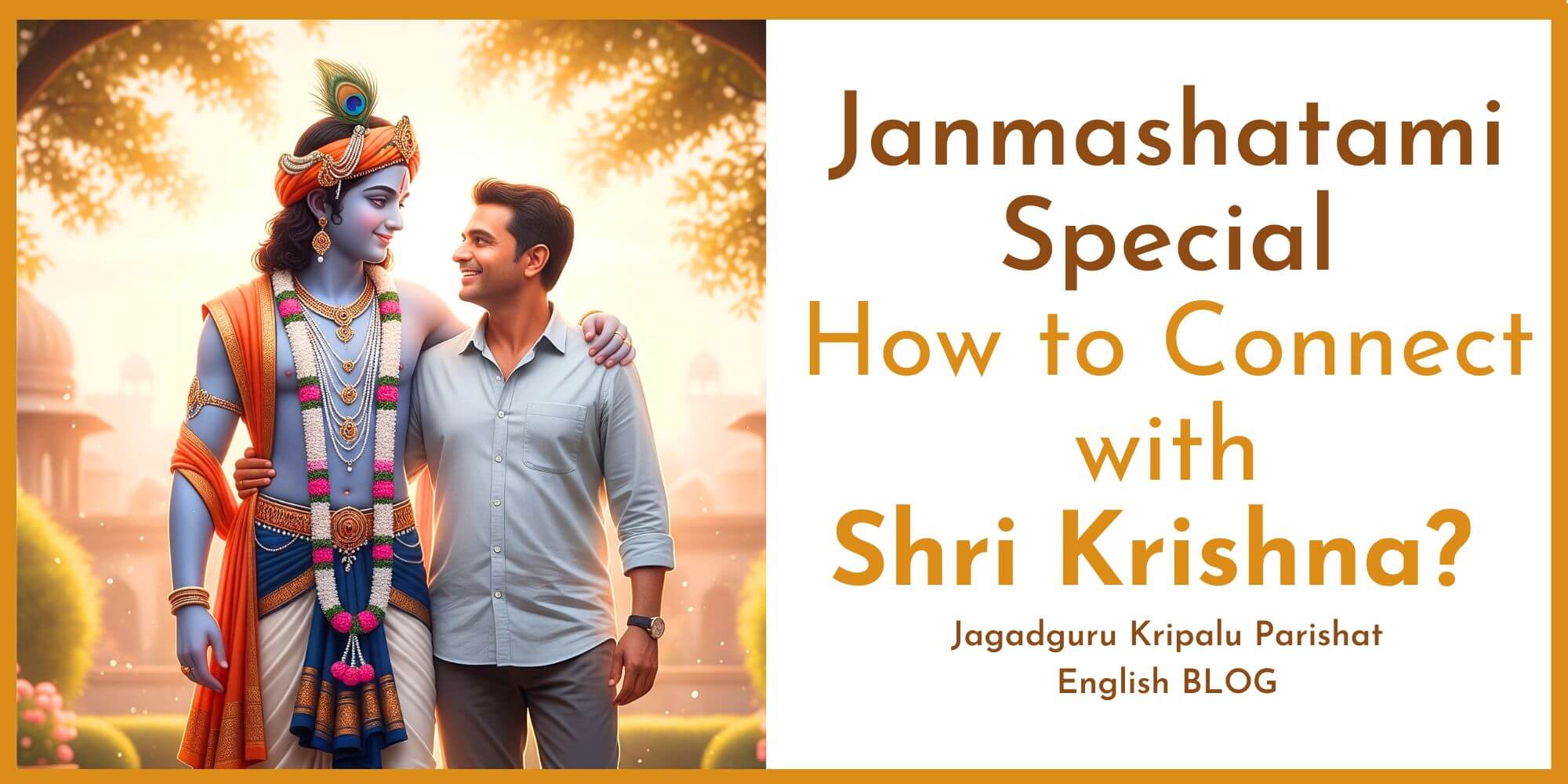Janmashatami Special – Who is Shri Krishna?
By Jagadguru Shri Kripalu Ji Maharaj
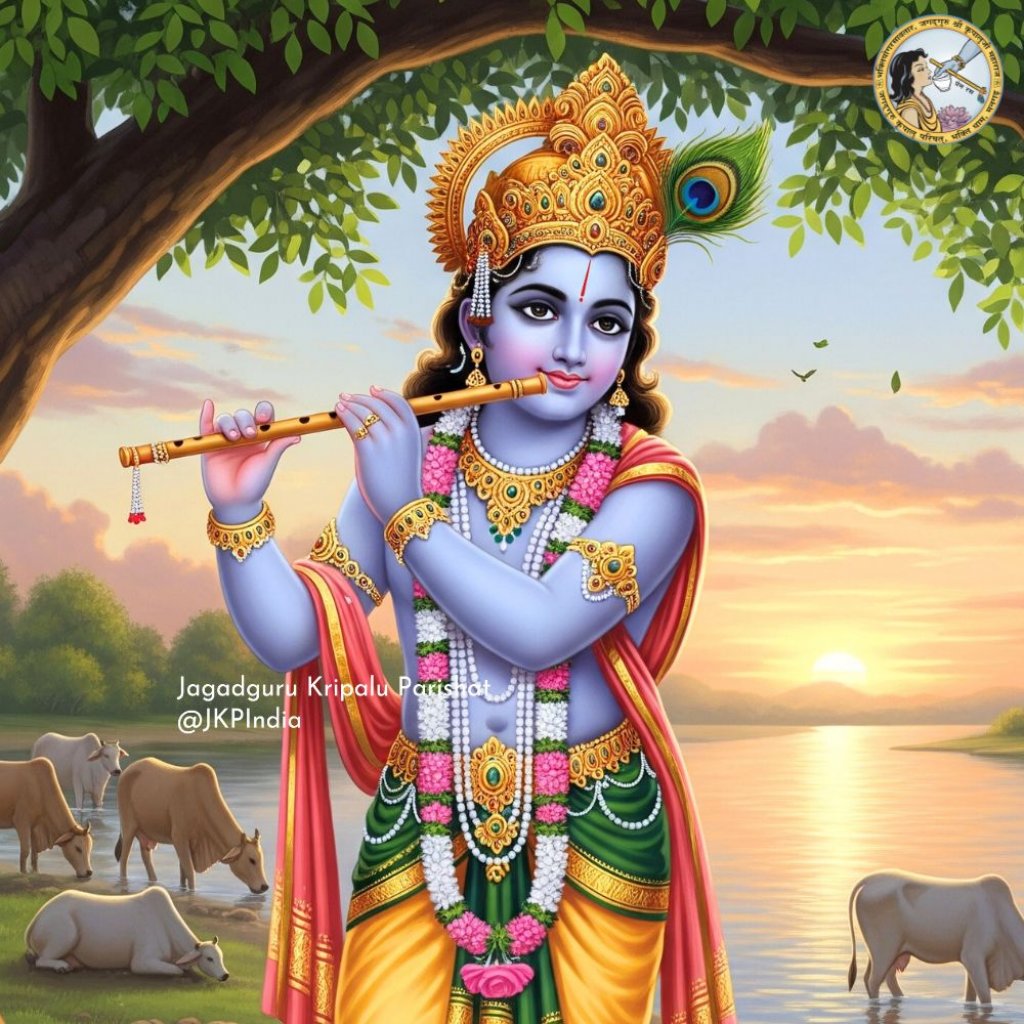
Who is Shri Krishna, with whom we are supposed to establish a relationship? We must first understand who He is.
The Vedas declare: “The one beyond whom nothing exists – that is Shri Krishna.”
They pose profound questions:
“Who is the Supreme Power?”
“Who is that One, knowing whom nothing else remains to be known?”
“Who is that One, attaining whom nothing greater remains to be attained?”
And the Vedas themselves answer:
“Shri Krishna is that Absolute Truth, beyond whom nothing exists.”
He is the One, knowing and attaining whom, nothing else remains to be known or attained.
He is endowed with six Divine majesties. There are six Divine majesties called bhag. One who possesses all six bhag in full measure is termed Bhagavan. Shri Krishna alone possesses these six Divine majesties completely.
He is served by the Gopas and Gopis – cowherd boys and girls of Vrindavan. He is the Lord of Vrindavan. The One and Only.
Maha Vishnu is a part of Him. Maha Vishnu is Shri Krishna’s personal expansion. We, the individual souls (jīvas), are also parts of Him, but we are not His personal expansions. We are a part of the jīva-shakti-vishisht Shri Krishna, whereas Maha Vishnu is part of the swarūpa-shakti-vishisht Shri Krishna. The difference is immense.
We individual souls have been overpowered by Maya since eternity. But the personal expansions of God have never been overpowered by Maya – nor can they ever be. All jīvas are governed by God’s swarūp shakti, whereas His personal expansions are the Governors of swarūpa shakti. There is such a vast difference. Thus, Shri Krishna’s first expansion is Maha Vishnu.
As stated in the Brahma Samhita:
“On the single breath of Maha Vishnu, the Governors of countless universes exist, and when He holds His breath, those countless universes are annihilated.”
This Maha Vishnu is a part of Shri Krishna. Maha Vishnu is Karanarnavshayi (who rests in the Causal Ocean) from whom Garbhodshayi Vishnu originates. Then from Garbhodshayi Vishnu originates Kshirodshayi Vishnu (who rests in the Milk Ocean). And then Brahma, Vishnu and Shankar manifested later from Kshirodshayi Vishnu. But all of them are Bhagvan. They were never overpowered by Maya at any point in time.
However, the highest divine qualities – majesty (bhagvata), sweetness (madhurya), gentleness (sausheel), and tenderness (saukumar) are found in Shri Krishna alone.
He possesses four exclusive qualities that even Maha Vishnu does not:
- Leela Mādhuri – Sweetness of His pastimes
- Prem Mādhuri – Sweetness of His love
- Roop Mādhuri – Sweetness of His divine form
- Venu Mādhuri – Sweetness of His flute
Let alone Brahma, Vishnu, and Shankar – these four unique qualities are not found even in Maha Vishnu, who is the Master of countless Brahmas, Vishnus, and Shankars.
Brahma, Vishnu and Shankar are countless in number, because every universe has three Governors – Brahma, Vishnu and Shankar and there are countless universes which are unlimited. Hence, there are countless Brahmas, Vishnus and Shankars.
The universe in which you are residing is the smallest. The Brahma of our universe has four faces, but others have 8, 100, 1,000, 100,000, or even 10 million faces – the more the faces, the larger the universe. The Lord of these countless universes is Maha Vishnu – who is a mere part of Shri Krishna.
But Shri Krishna also manifests in various Divine forms. One such form is Maha Vishnu, who resides in Vaikunth – the highest abode of Divine majesty. In Vaikunth, there is unlimited spiritual bliss, completely beyond the limitations of this material world. Maya cannot enter Vaikunth, and material entities like the sun, moon, and other physical elements have no access there.
As the Vedas declare: Everything in Vaikunth is Divine, and the majesty there is unlimited. You may have heard people say, “My father has departed for Vaikunth.” Once a soul reaches Vaikunth, there is no return. Such a soul is never again overpowered by Maya.
Maha Vishnu is the first expansion of Shri Krishna. While He is fully endowed with Divine majesty, He lacks the sweetness (mādhurya) that is unique to Shri Krishna.
The next form is Shri Krishna of Dwarika, who surpasses Maha Vishnu in sweetness and bliss. In Vaikunth, Maha Vishnu does not engage in playful pastimes (līlās) and is not accompanied by His eternal associates.
However, in Dwarika, Shri Krishna performs divine pastimes and is surrounded by His eternal companions. Though He still exhibits majesty, there is a greater presence of sweetness compared to Vaikunth.
To understand this distinction between majesty (aisvarya) and sweetness (madhurya):-
Imagine someone’s son or husband is a Governor. When his mother or wife sees him seated in his official chair surrounded by bodyguards and officers, wearing a serious expression – they witness his majestic form. But when the same Governor returns home, changes into casual clothes, and interacts lovingly with his family, that is his sweet form.
In his majestic role, his loved ones may feel intimidated or distant, seeing him with a strict face, surrounded by his bodyguards and officers. Majesty inspires awe and reverence, not deep affection. True closeness blossoms only when majesty is set aside. Sweetness draws out love and intimacy.
Arjun once insisted, “You keep saying that You are God! Then show me Your all-majestic, Divine form.”
The Lord replied, “How can you see that with your material eyes made of the five elements?
The human body, formed in the mother’s womb, is composed of earth, water, fire, air, and space. These material eyes can only perceive things made of the same five elements.
“How then can you behold My divine form, which transcends all material nature?”
Still, Arjun persisted: “Then why don’t You grant me Divine vision so that I may see it?” And since Arjun was indeed spiritually qualified, the Lord graciously relented. The Lord granted Arjun Divine vision and revealed to him His all-majestic form as Bhagavan.
Arjun beheld an infinite form – countless mouths, eyes, ears, limbs, and a radiance similar to countless suns blazing together.
Overwhelmed by this awe-inspiring sight, Arjun, the mighty wielder of the Gandiv bow began to tremble. He felt dizzy and began to perspire. Unable to bear it any longer, he closed his eyes and cried out, “Enough! I cannot see more! Please return to Your previous form!” The Lord gently replied, “This is why I was restraining Myself.”
This was Arjun’s condition even after being granted Divine vision. Then how could anyone possibly behold that form with ordinary material eyes? One might feel faint or even fall unconscious at the sight of a terrifying ghost – let alone the majestic, awe-inspiring form of God!
The majestic form of God is indeed formidable. It cannot evoke love; it inspires only reverence and distance. It’s like someone saying with pride, “My husband is the Governor” or “My son is the Governor.” But you won’t feel warmth or closeness when he speaks to you in his official capacity.
However, when he returns home, sheds his title, speaks affectionately with his child, or embraces his mother, he is no longer the Governor – he is simply a loving father or son.That is the form his loved ones truly cherish. When majesty is set aside, sweetness emerges, and love naturally flows.
So Maha Vishnu is the All-Majestic form of Shri Krishna. His form in Dwarika is comparatively less majestic and is induced with sweetness. Third is Shri Krishna’s form in Mathura which is endowed with yet more sweetness and lesser majesty.
And then there is another form of Shri Krishna – one that is even sweeter and completely devoid of majesty. A form with zero majesty. In Vrindavan, the power of Divine majesty (aiśvarya shakti) has no permission to enter. Shri Krishna Himself has forbidden majesty from entering there.
In Vrindavan, both the devotee and God forget their true identities. The devotee forgets that he is the servant of Shri Krishna, and God forgets that He is the Supreme Lord, the Master of infinite majesty. Both become completely absorbed in love, forgetting all positions and powers. God becomes like an extremely materialistic person. Shri Krishna takes on the role of an ordinary, poor village boy – appearing just like any simple soul.
All His divine powers get merged in Yogmaya, not as a display or pretense, but in absolute reality. Never think that God is merely pretending to forget His divinity. He does not act or feign. It is through His divine power, Yogmaya, that both the devotee and God genuinely forget their real nature.
Thus, the Gopis can scold Him: “Go away, Loafer! Why are you following me?” These same Gopis, whom Brahma and Shankar yearn to behold in meditation, treat Krishna as a mischievous village boy! If the Gopi had the feeling that He is God, she would have glorified Him and begged for His Grace.
Mother Yashoda once threatened Him with a stick, saying, “I keep getting complaints about you. Today, I’ll tie you up and give you a good beating!”
Hearing this, Thakur Ji sheds real tears. He cries truly, not as an act. It is Yogmaya that makes Him forget His Supreme Divinity and behave like an ordinary child.
Yet, even in this state, the power of majesty quietly remains within Him, serving Him in secret. When Mother Yashoda tied Him to the grinding mortar and raised the stick to punish Him, the majesty residing within Shri Krishna became restless, thinking: “My Master is going to be beaten! But I do not have permission to interfere – so I must serve Him silently, from the shadows.”
Mother Yashoda started checking Thakur Ji’s mouth because He had said confidently, “Check my mouth, Maiya. It would be dirty if I had really eaten mud.” But instead of finding mud, she saw countless universes inside His tiny mouth. She was stunned – dizzy and overwhelmed. She couldn’t believe her eyes: “What am I seeing? Brahma, Vishnu, and Shankar are all here! I see vast mountains, rivers, and immense cosmic realms inside His mouth! Am I in my senses?” In shock, she dropped the stick. Her body trembled, her head spun, and she began to perspire.
In that moment, God’s power of majesty manifested briefly and then immediately withdrew. When Mother Yashoda reopened her eyes, she saw nothing and thought to herself, “There’s nothing here… What did I see earlier? I must be imagining things.” (That which is termed as depression nowadays).
This incident reveals that Vrindavan’s Shri Krishna has no need for the display of majesty. His Divine play is rooted entirely in sweetness, intimacy, and love – not grandeur.
And even sweeter than Vrindavan’s Shri Krishna is the form known as Kunj’s Shri Krishna – a deeper, more intimate expression of divine sweetness.
And sweeter than Kunj’s Krishna is Nikunj’s Shri Krishna.
And the sweetest form of all is Nibhrit Nikunj’s Shri Krishna – a Divine form reserved only for the Divine couple Shri Radha and Shri Krishna. No soul can enter this realm.
Below Nibhrit Nikunj lies the sweetness of Nikunj, where Divine associates like Lalita and Vishakha from Golok serve the Divine Couple. Even here, individual souls cannot reach.
Below Nikunj lies Kunj, which is accessible to all individual souls – but only under two conditions:
- One must be a devotee (bhakt) of mādhurya bhāv – the devotional sentiment of a lover.
- One must be a devotee of samartha rati – the sentiment of loving only for Shri Krishna’s pleasure, not for personal happiness.
Such was the love of the Gopis. This is what is known as niṣhkām prem – selfless love.
The Gopis continued to maintain their bodies even through a hundred years of separation from Shri Krishna, yet not one of them died. Why?
Because their hearts said, “I have offered this body to Him. What if He returns and asks for me? I must be here to serve Him. I cannot leave this body – not for my own sake, but because it belongs to Him.”
Even if He chooses not to return for fifty years, a hundred years, or even a hundred eons, they would neither question Him, nor stop loving Him, nor seek another in His place.
Just as we often see in modern societies like America, people keep changing partners.
Husbands and wives separate over petty issues. This is known as sākām prem – love based on selfish desires.
But in selfless love, no matter how the beloved behaves, the lover finds joy in every action. The lover does not judge or apply logic to the beloved’s conduct.
Selfless love (niṣhkām prem) is found only in the sacred relationships – between the devotee and God, and between the disciple and Guru.
In the material world, such love is nearly impossible, because both parties seek their own happiness. Where there is selfish desire on both sides, true, unconditional love cannot survive. That is why the world is filled with conflict and restlessness – revolution day and night.
Hence, the sweetest of all divine experiences is the bliss found in the Shri Krishna of Kunj. It is this loving, all-attractive form that we worship.
With this understanding, we must cultivate selfless love (niṣhkām prem) by loving Shri Krishna not for our own happiness, but solely for His pleasure. But this love reaches its highest expression when imbued with mādhurya bhāv, the sweet and intimate sentiment that sees Him as one’s dearest beloved.
Although He is the all-powerful Supreme Lord – the Creator, Sustainer, and Destroyer of countless universes, He is not won by power or knowledge, but by the simple, pure devotion of a surrendered heart. Only such loving surrender draws the Lord of infinite majesty to playfully reside in the heart of even the humblest devotee.
By Jagadguru Shri Kripalu Ji Maharaj
A brief introduction of Jagadguru Shri Kripalu Ji Maharaj*
(Known by His devotees as Shri Maharaj Ji)
The original title of Jagadguruttam (Greatest Spiritual Teacher of the World) was bestowed upon Shri Kripalu Ji Maharaj on January 14, 1957, by Kashi Vidvat Parishad (a council of 500 greatest scholars saints of India). He composed divine texts like Prem Ras Madira, Prem Ras Siddhant, and Radha Govind Geet to lead us on the right path of devotion. He also gave priceless monuments as gifts to the world which include Bhakti Mandir located in Bhakti Dham, Mangarh, Prem Mandir located in Vrindavan Dham, and Kirti Mandir located in Barsana Dham. Shri Maharaj Ji also built hospitals for the impoverished, the Jagadguru Kripalu Chikitsalaya in Vrindavan, Jagadguru Kripalu Chikitsalaya in Barsana, and another one in Pratapgarh. All three help millions of underprivileged to gain free access to medical care. His Kindergarten, School, and College for impoverished girls Jagadguru Kripalu Parishat Education is located in Kunda and provides completely free education.
